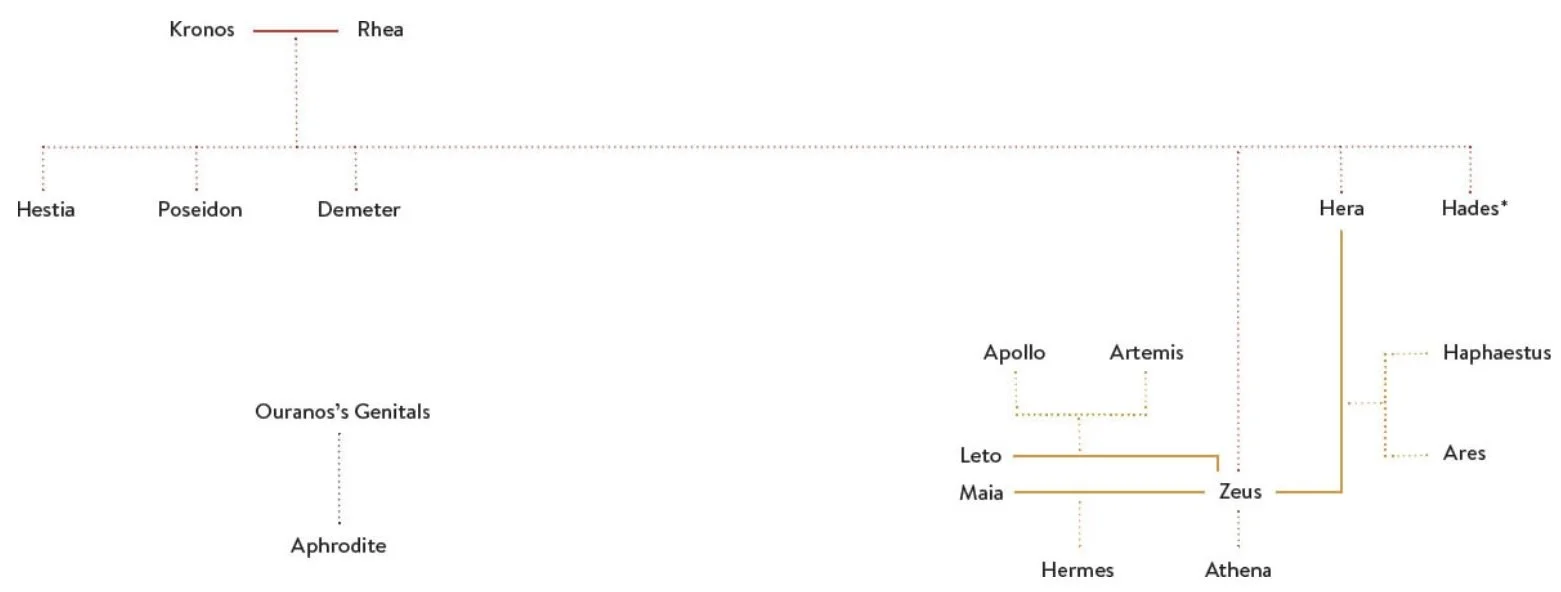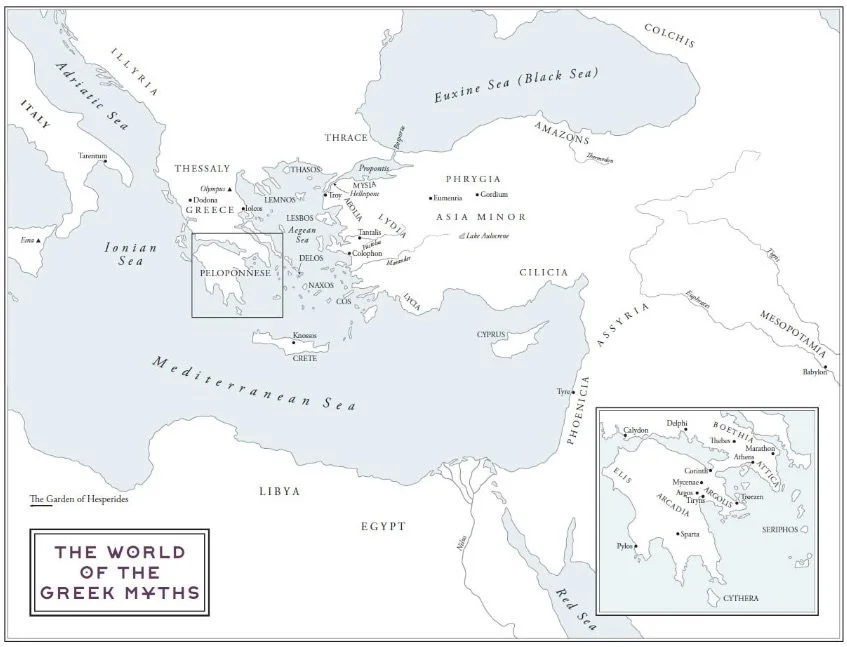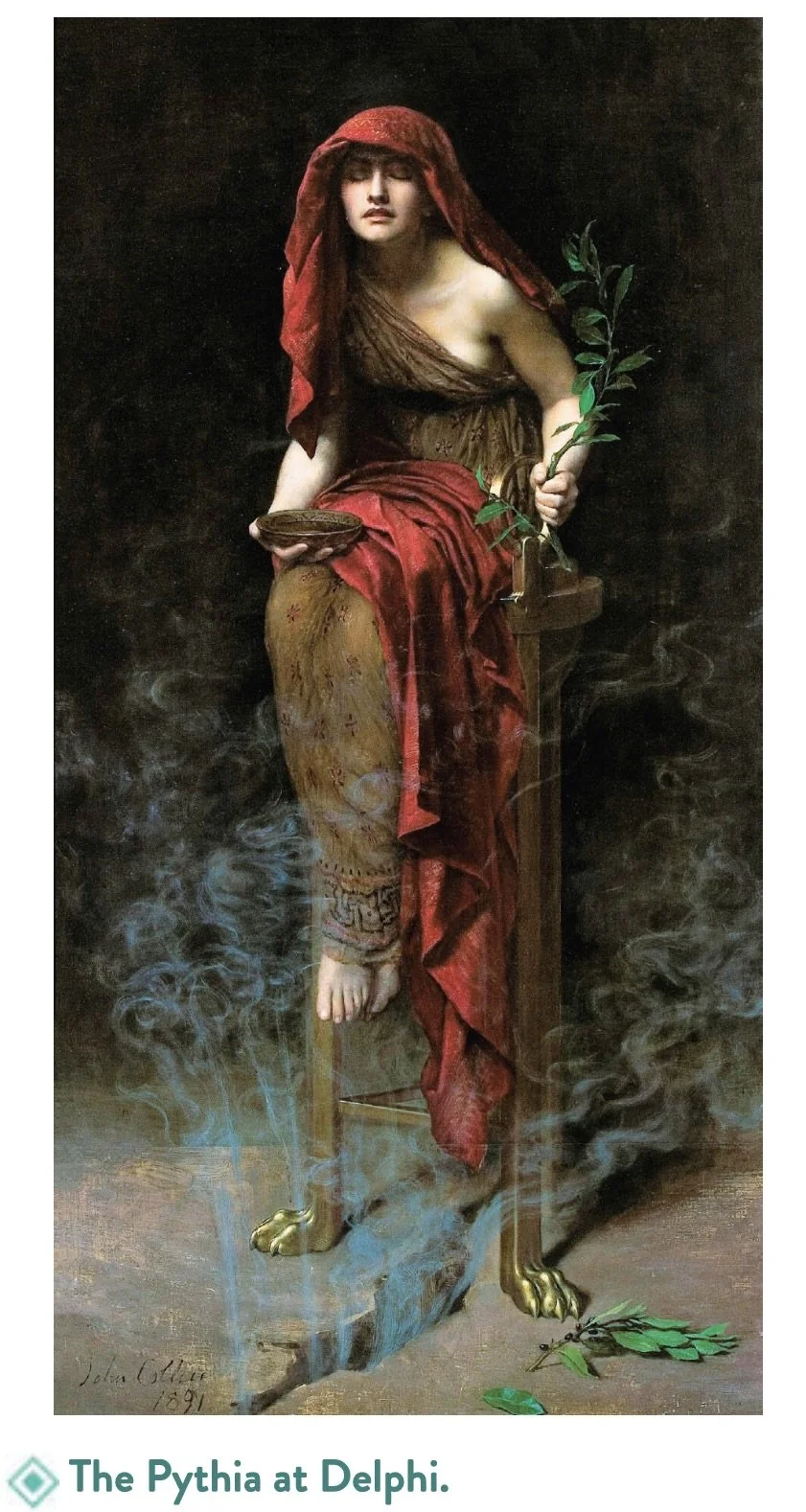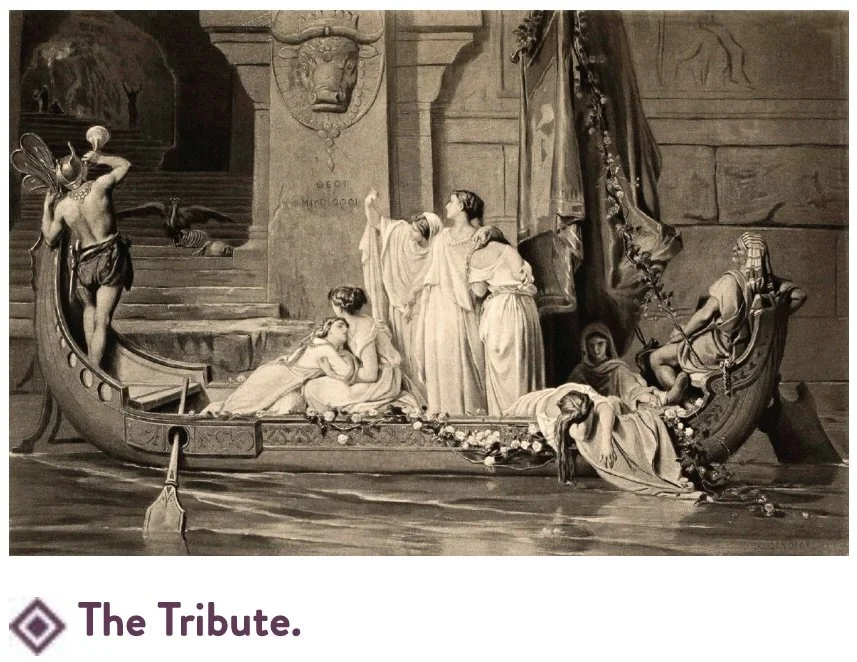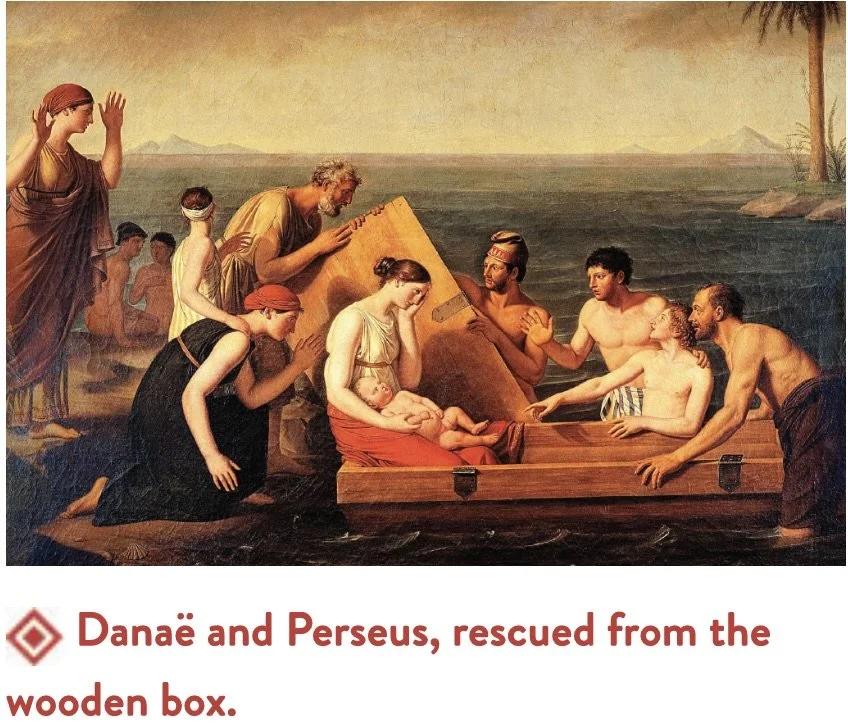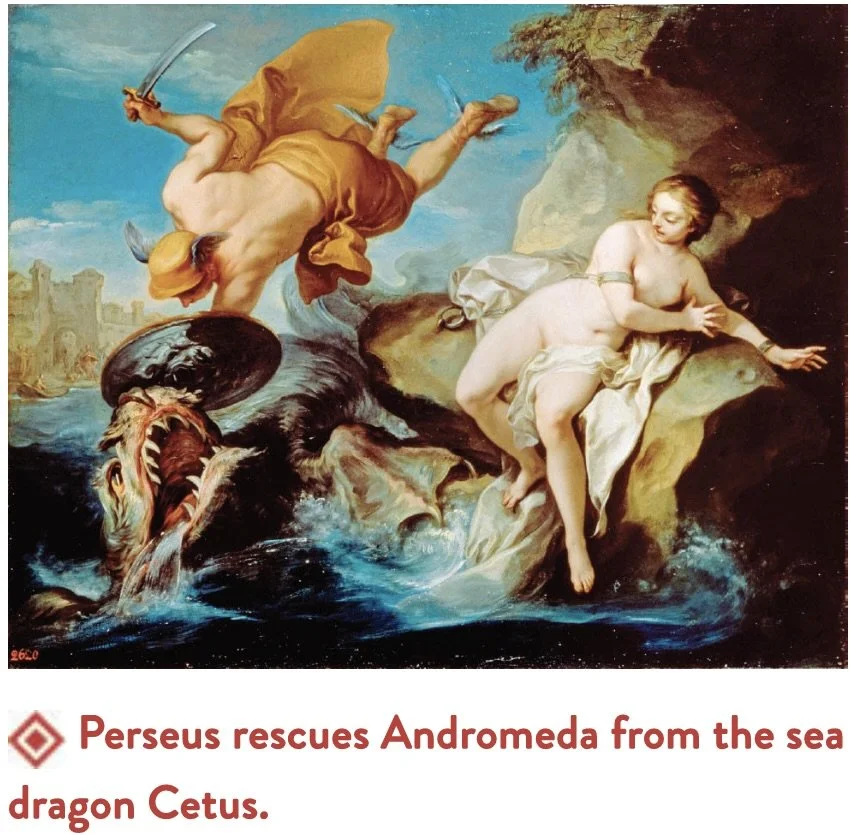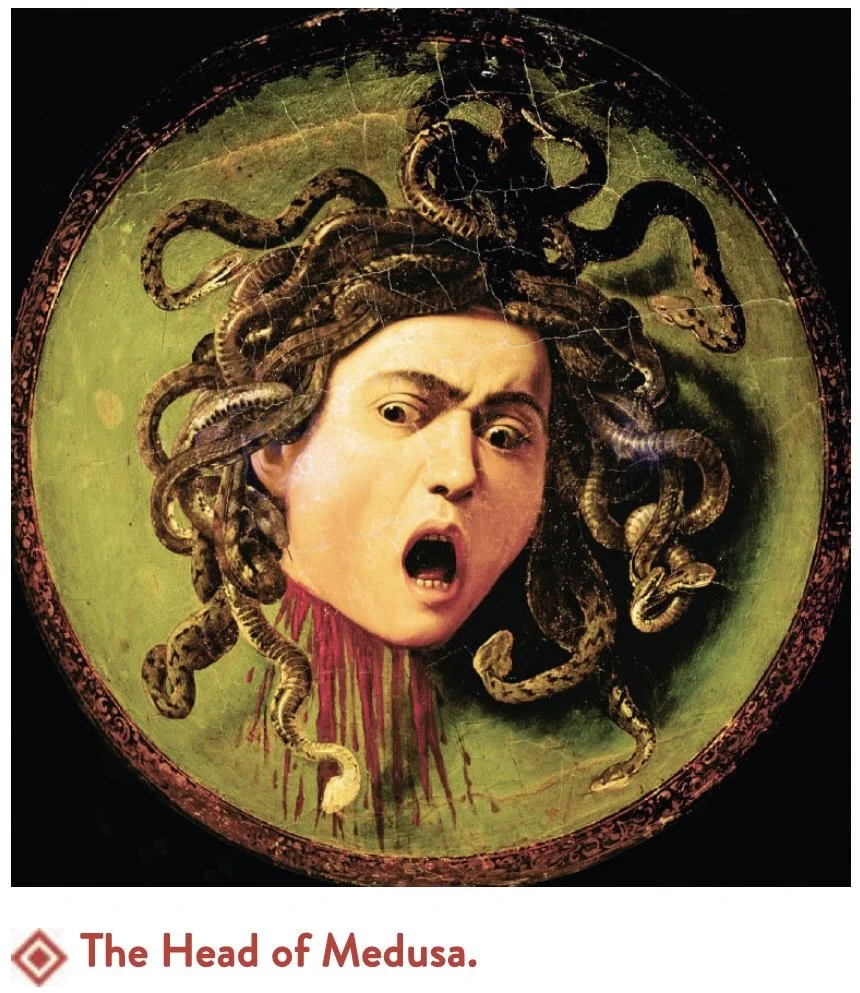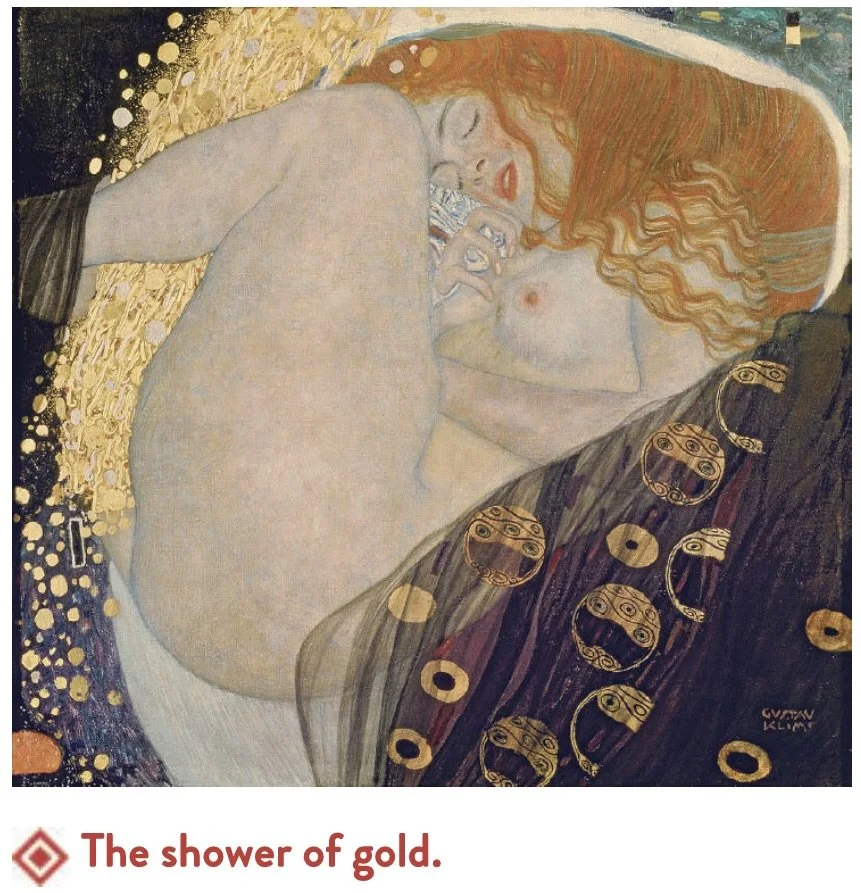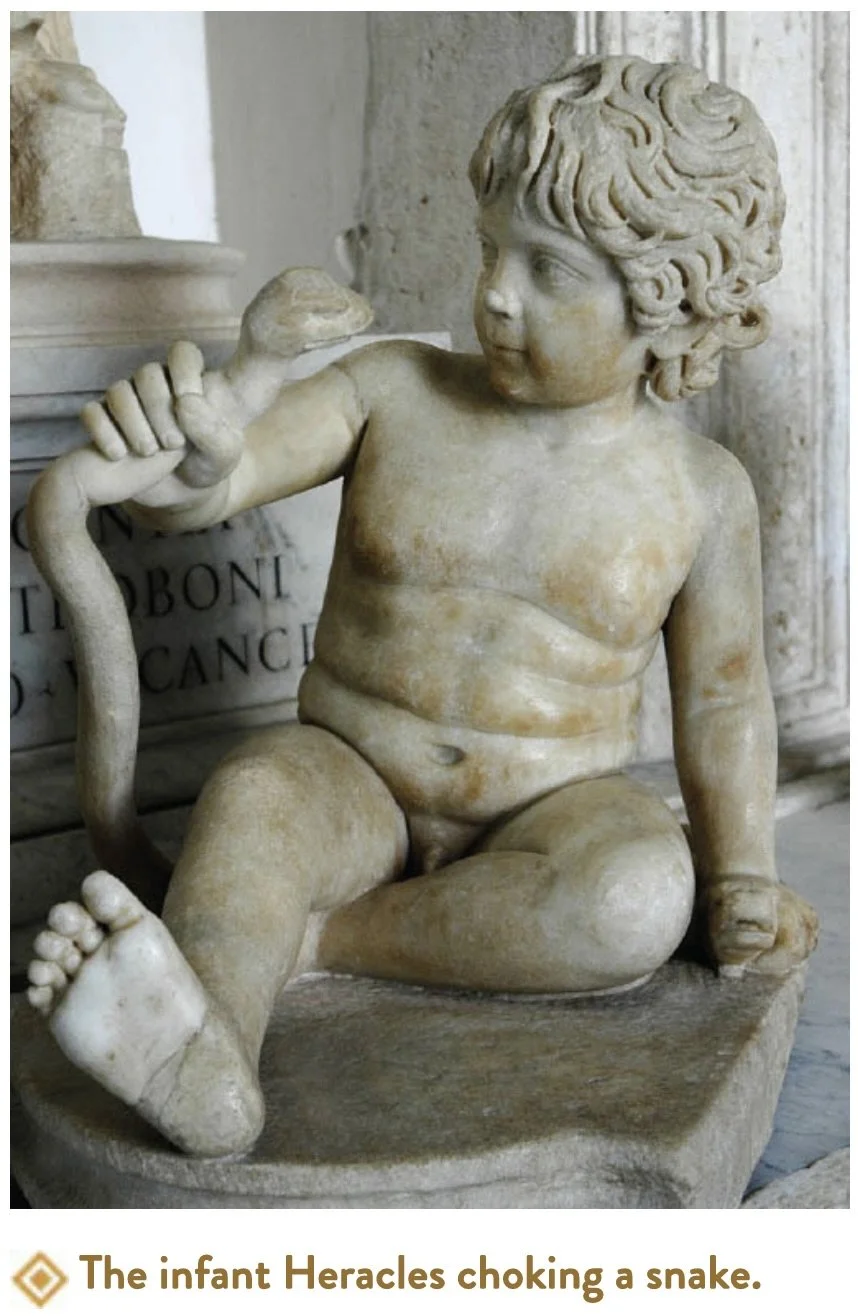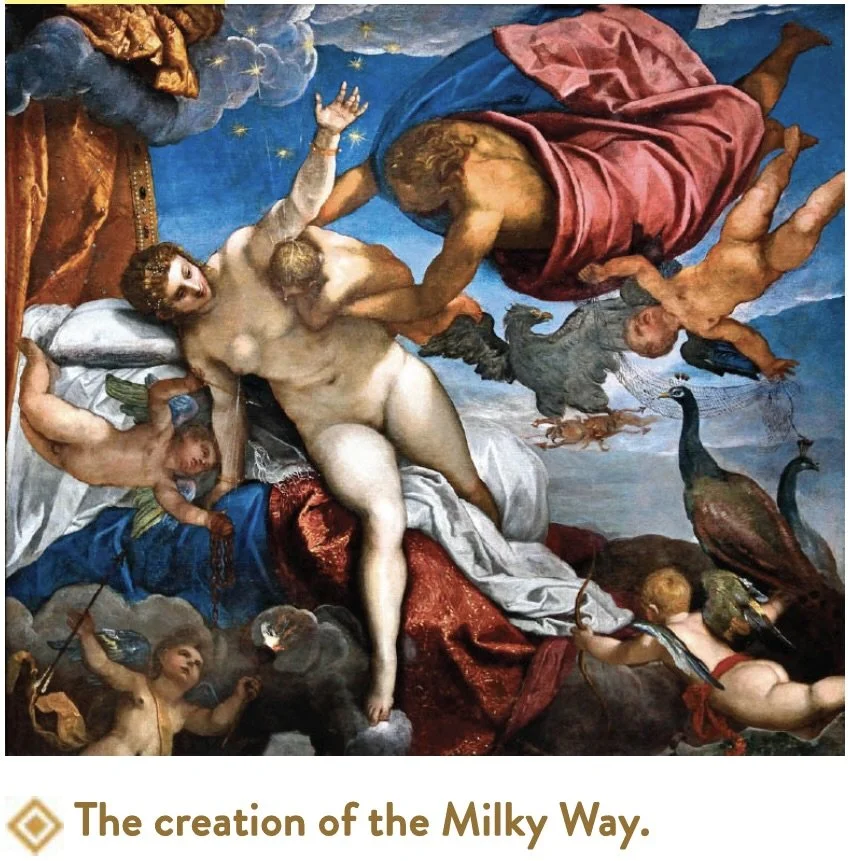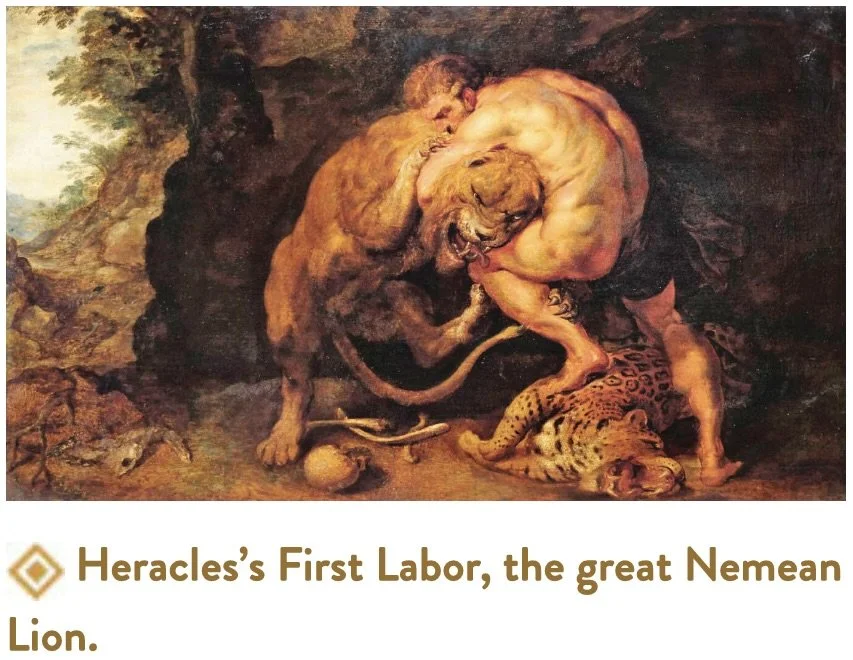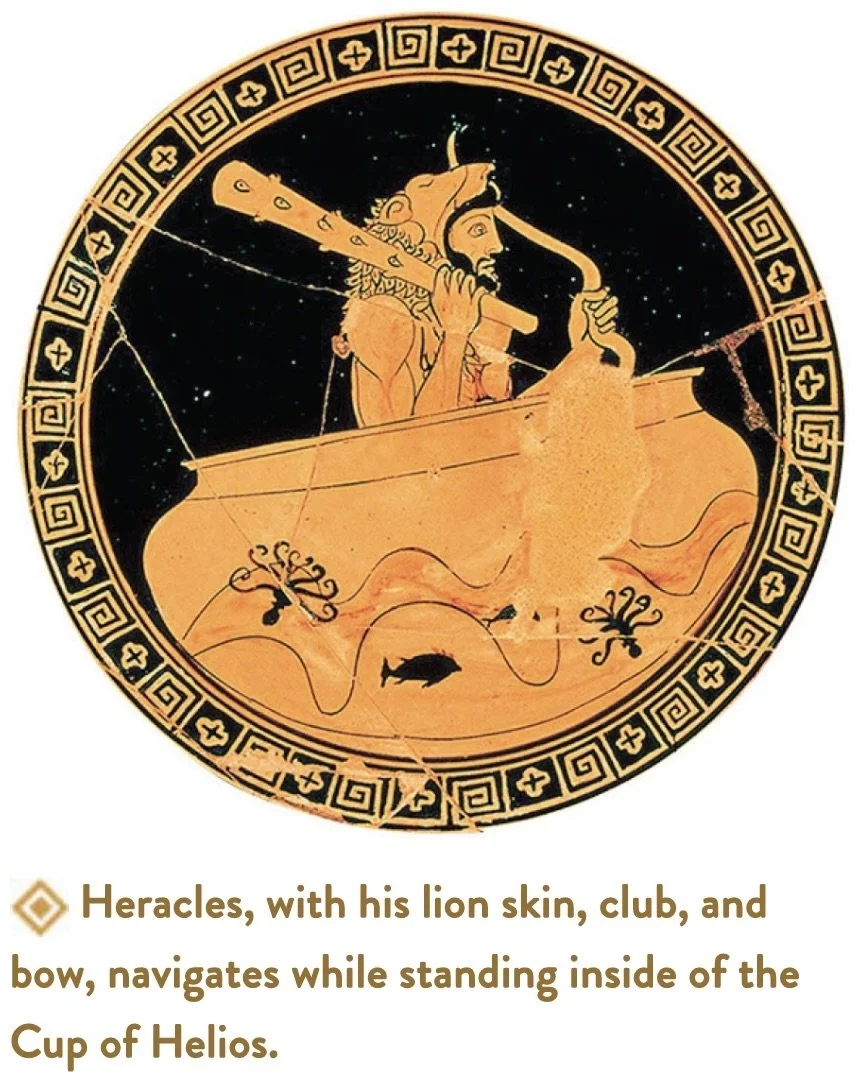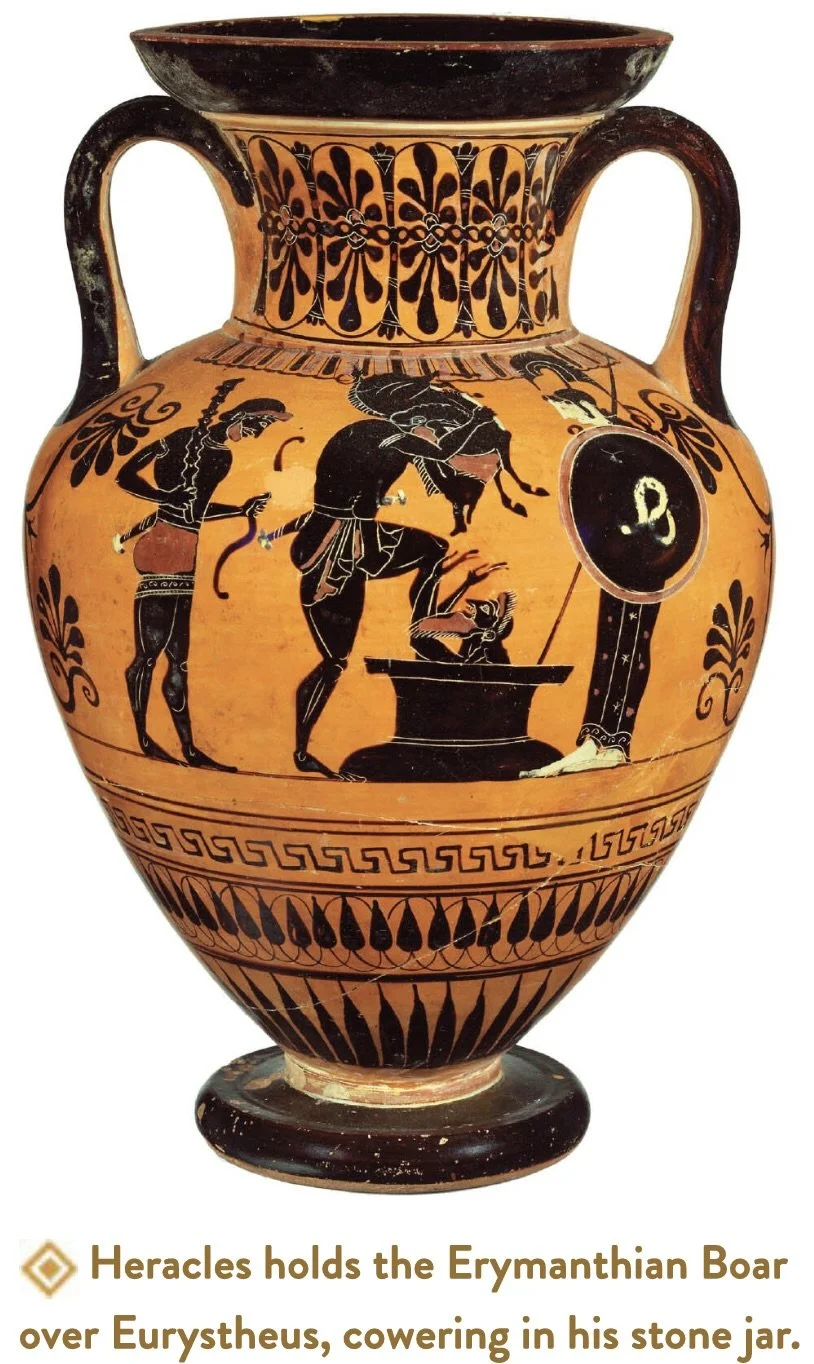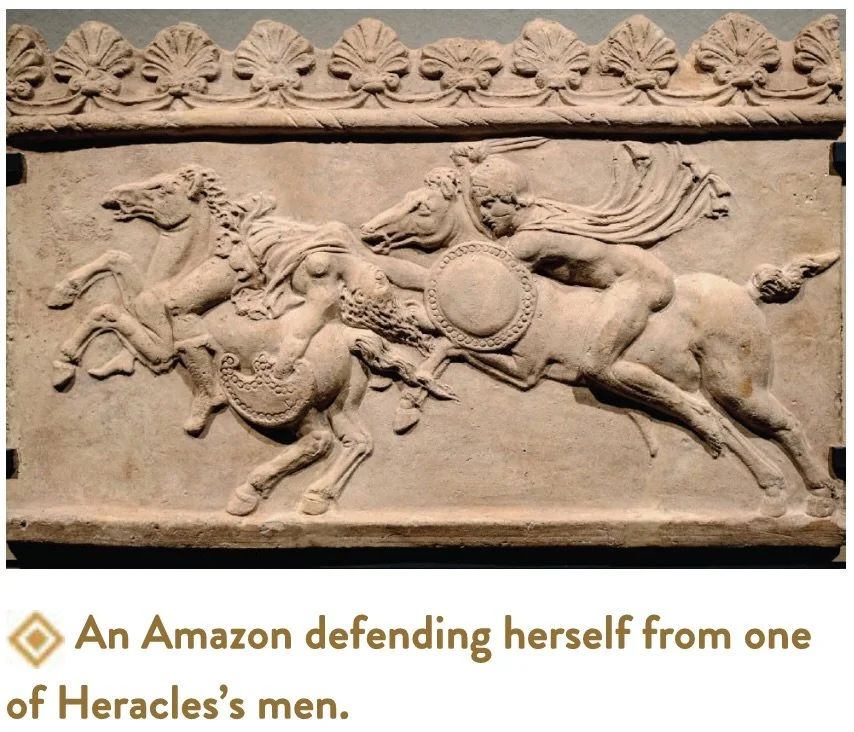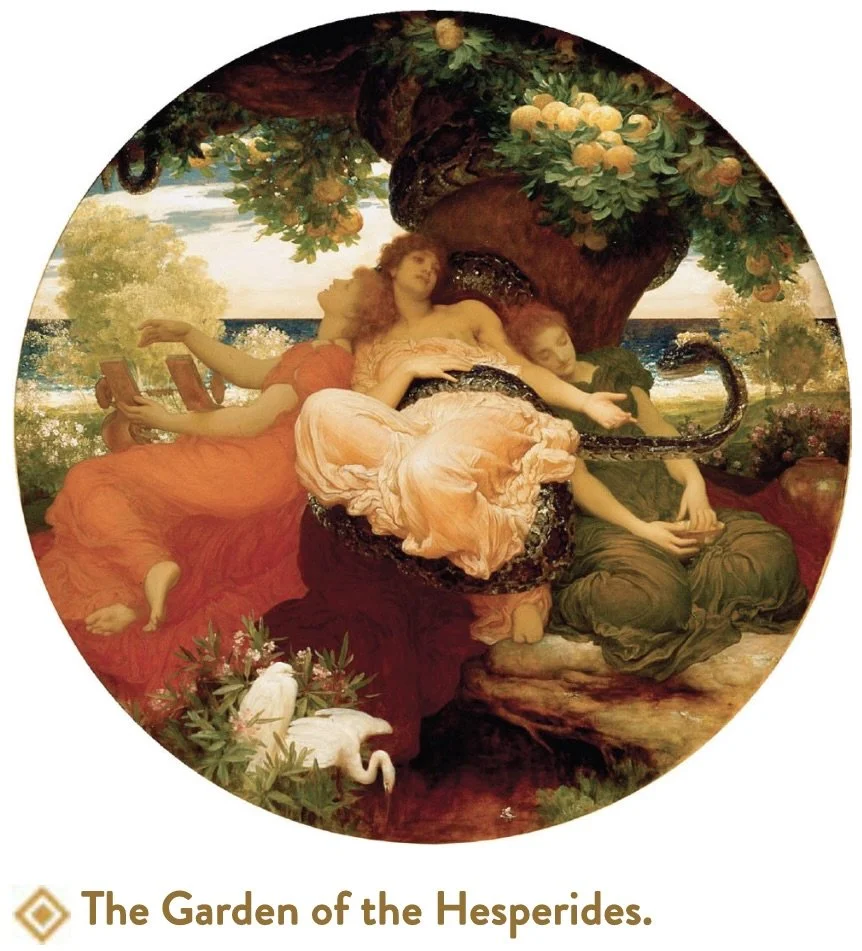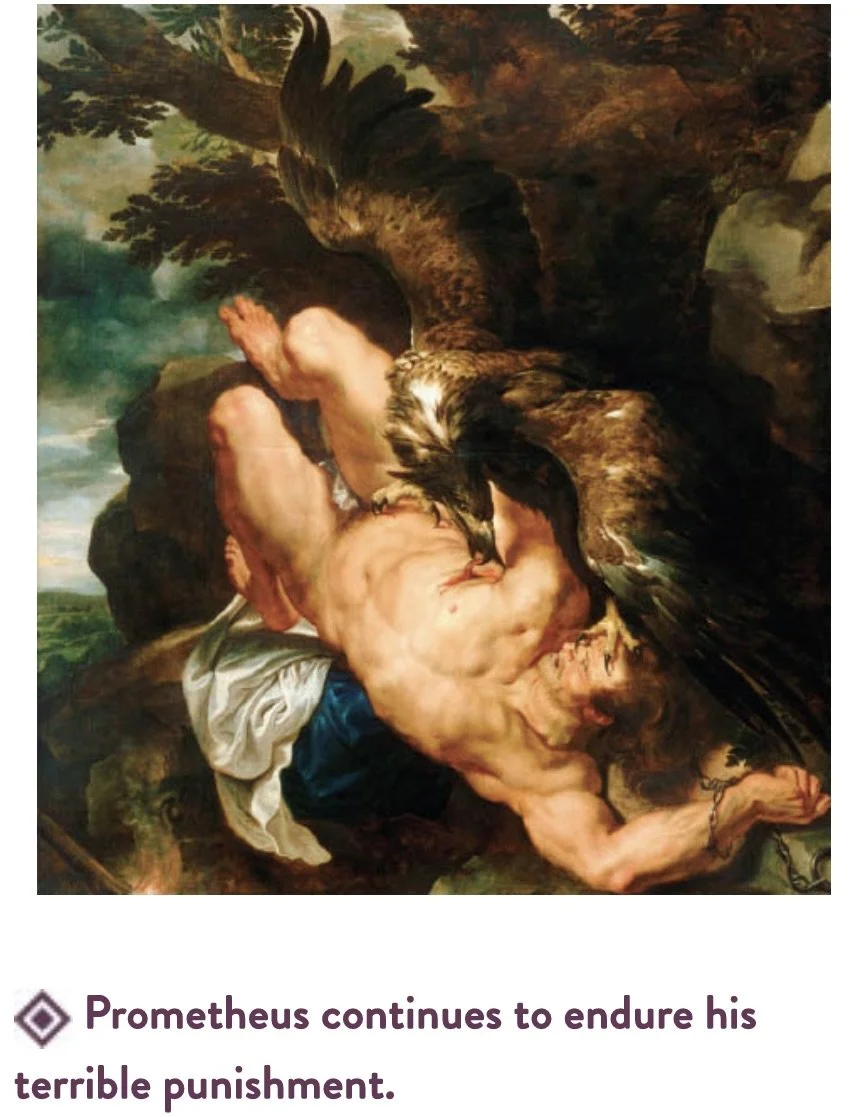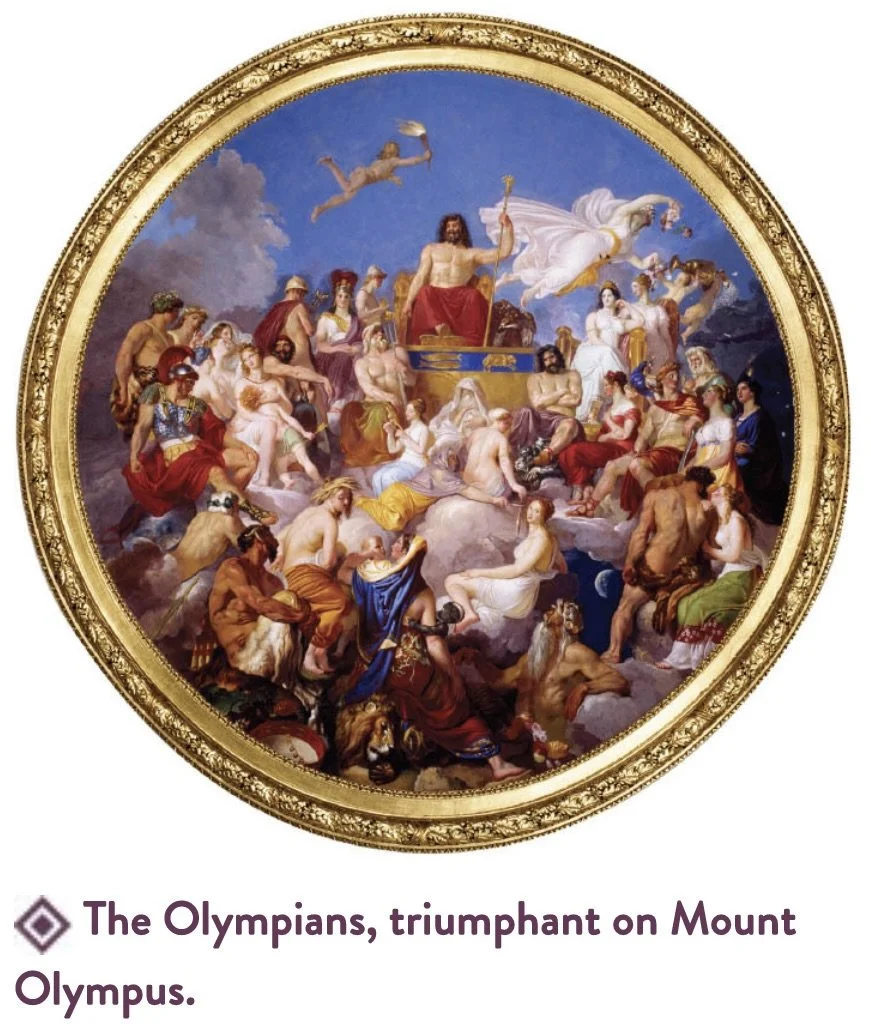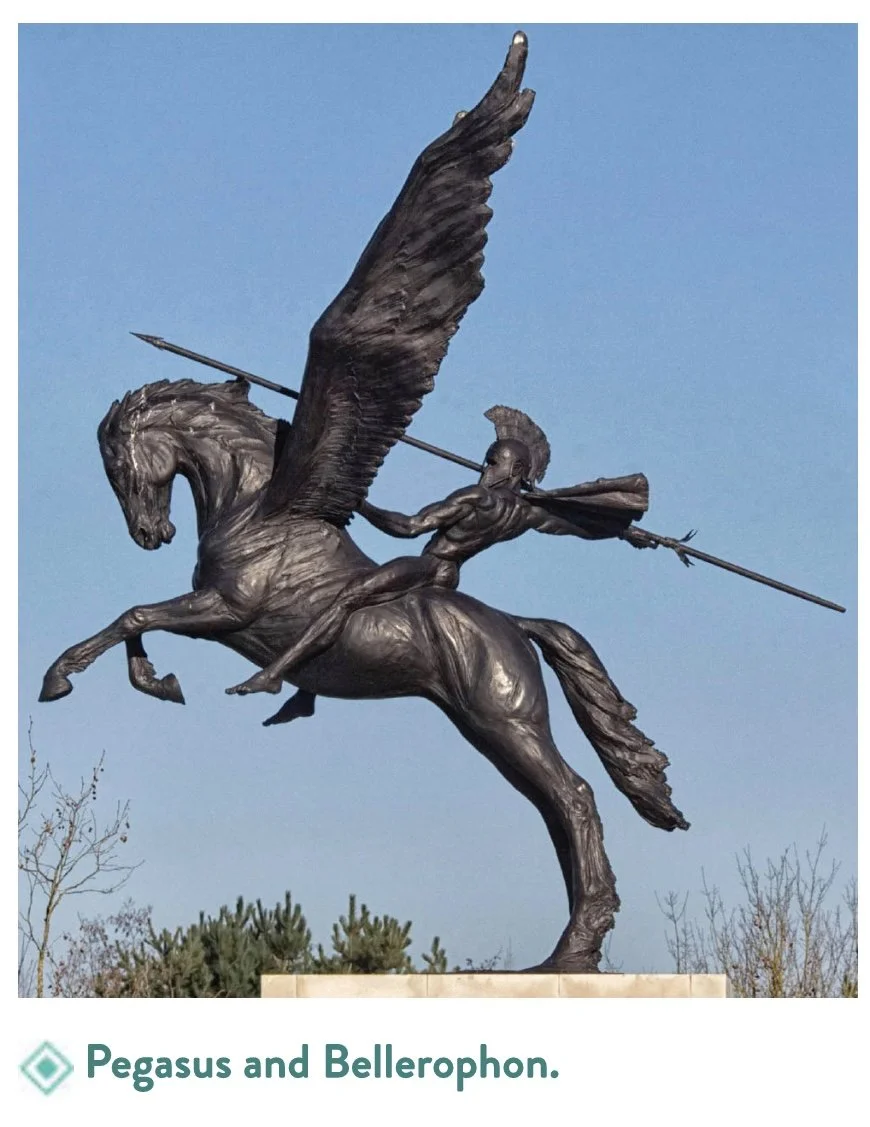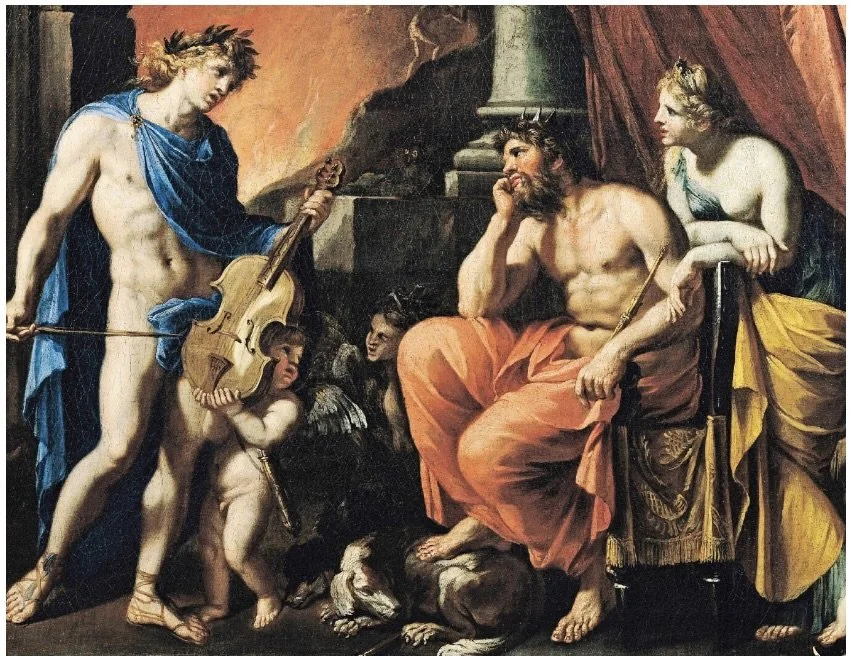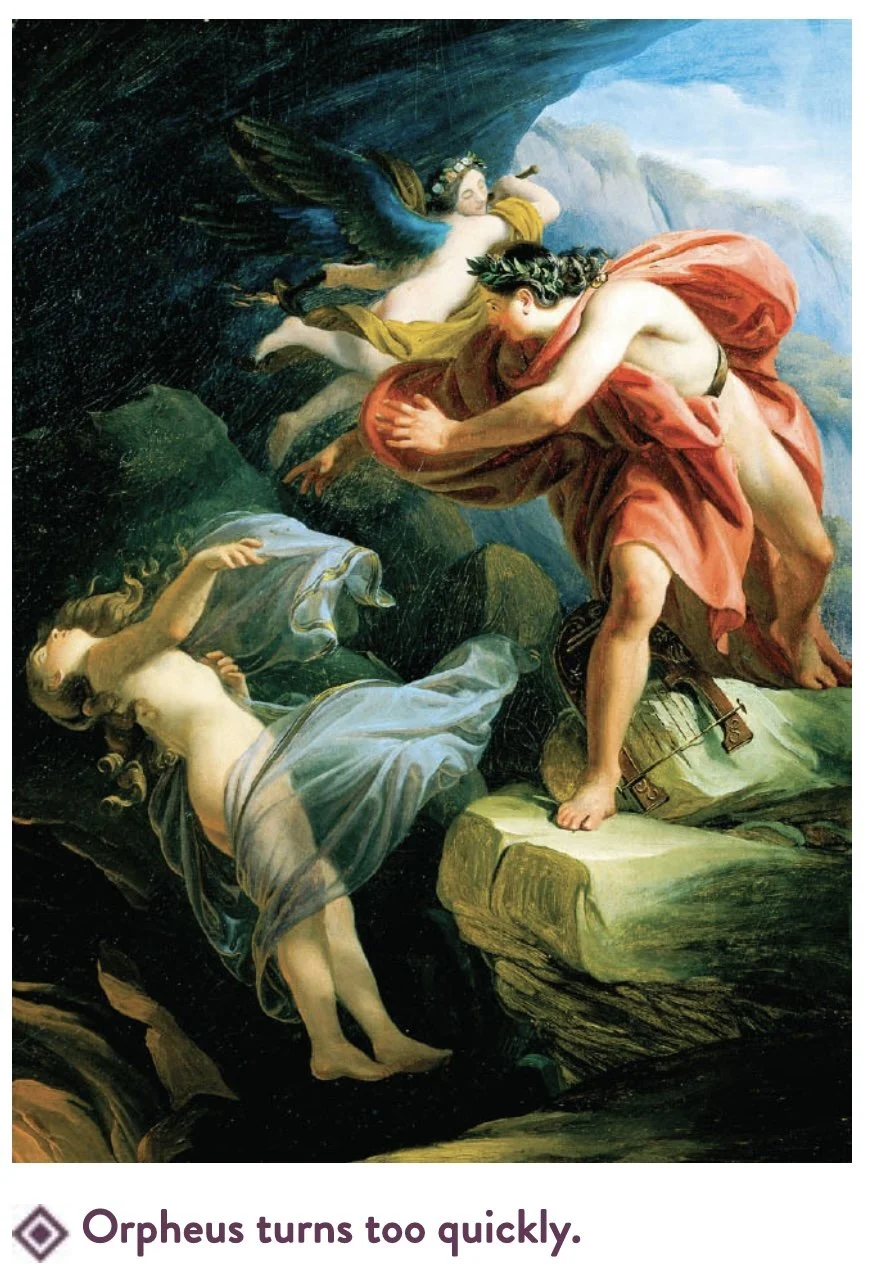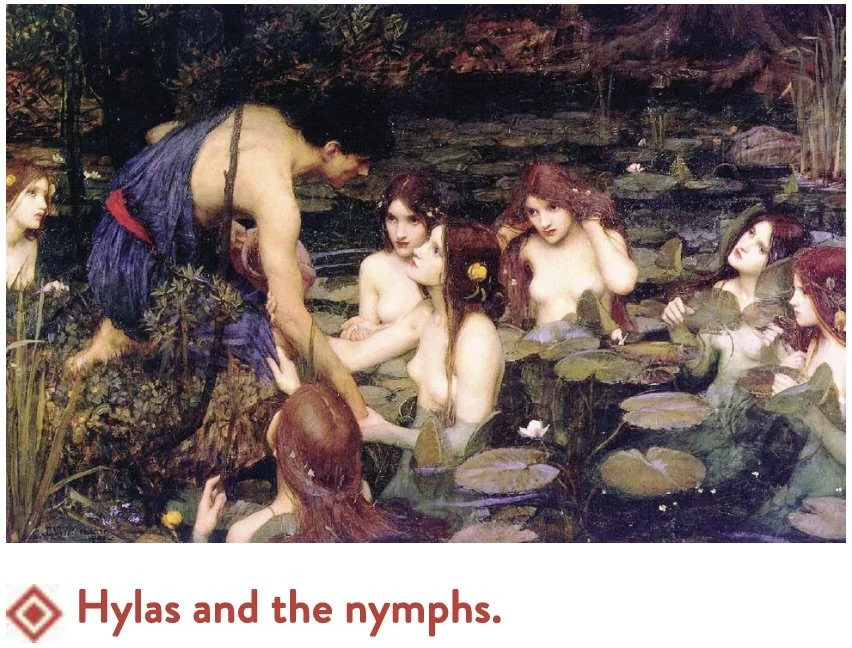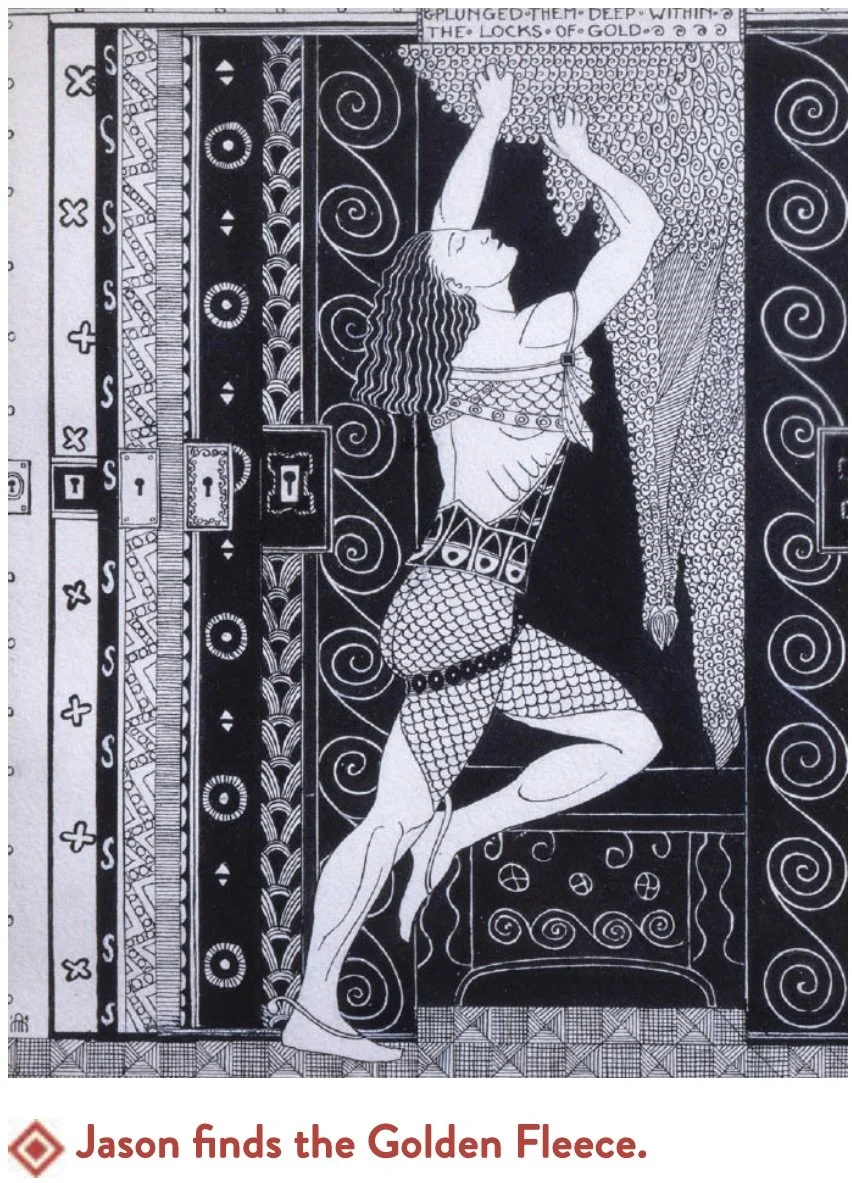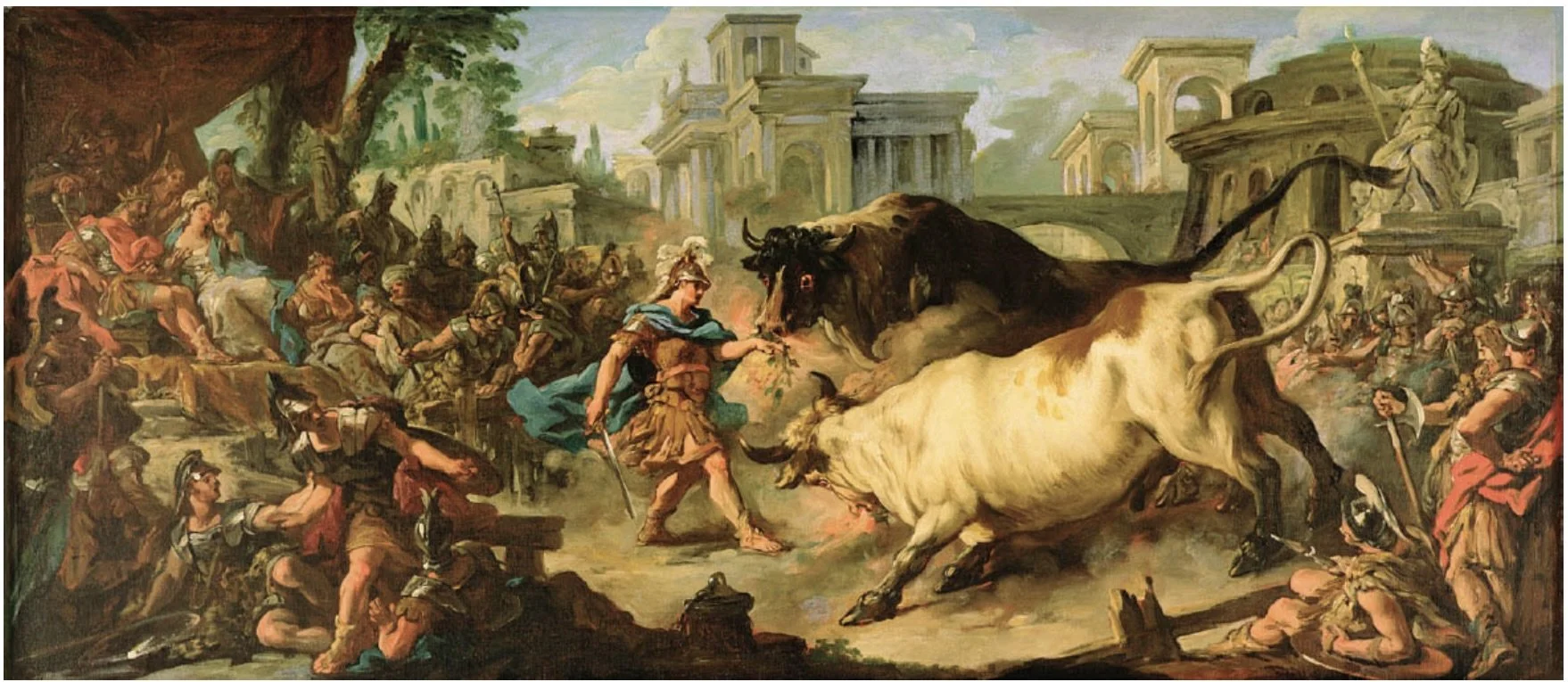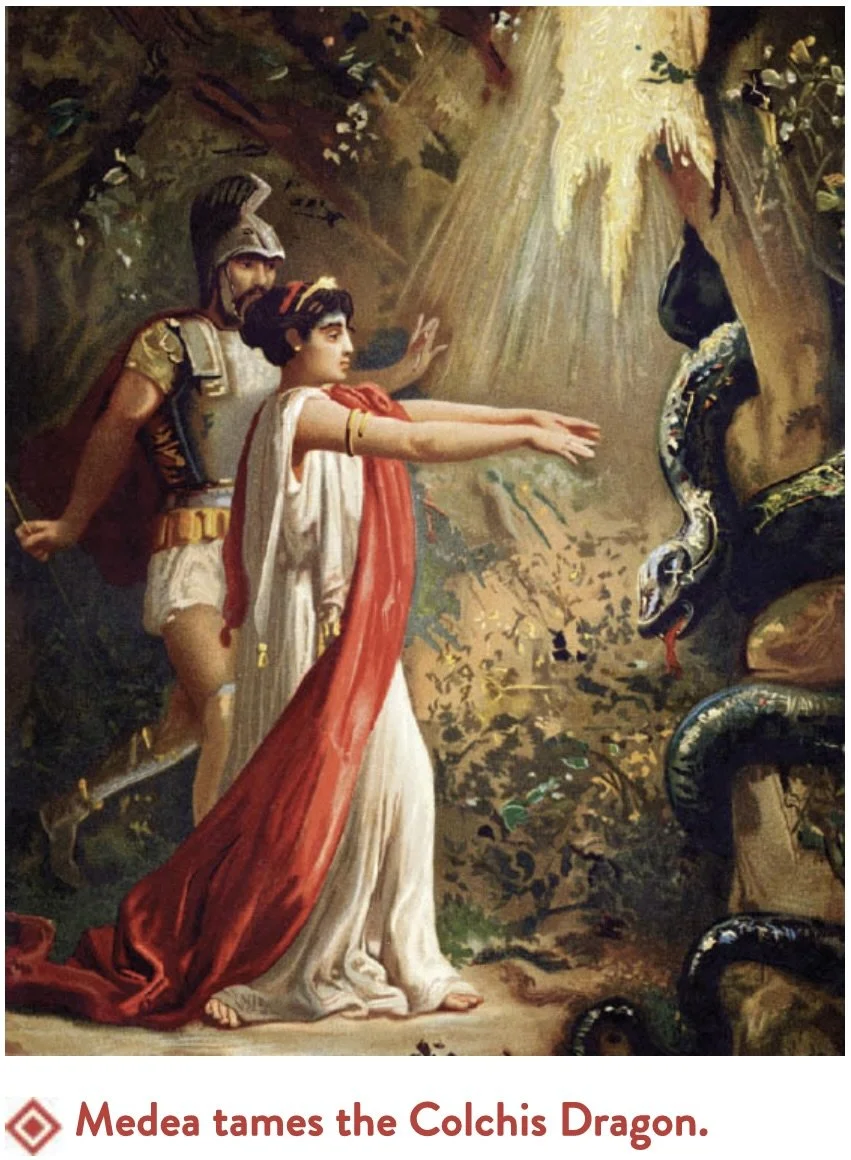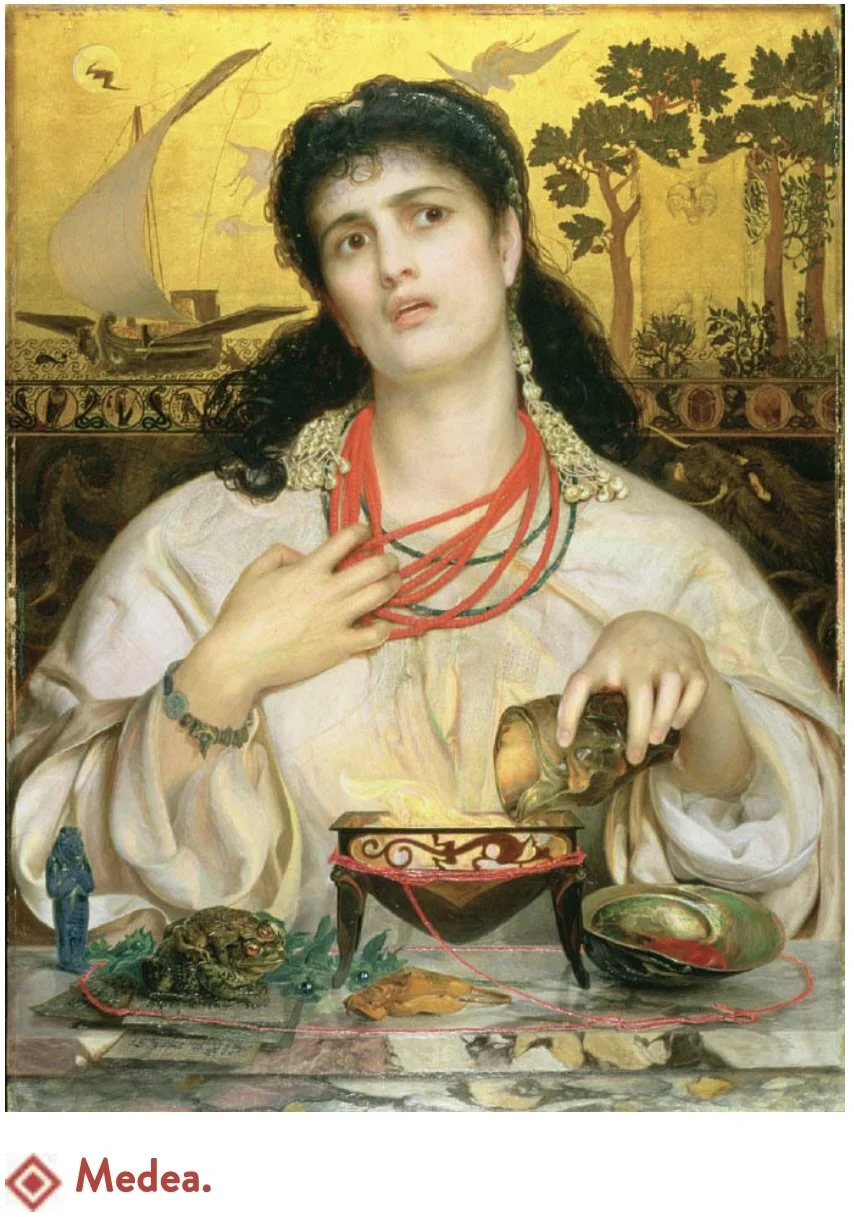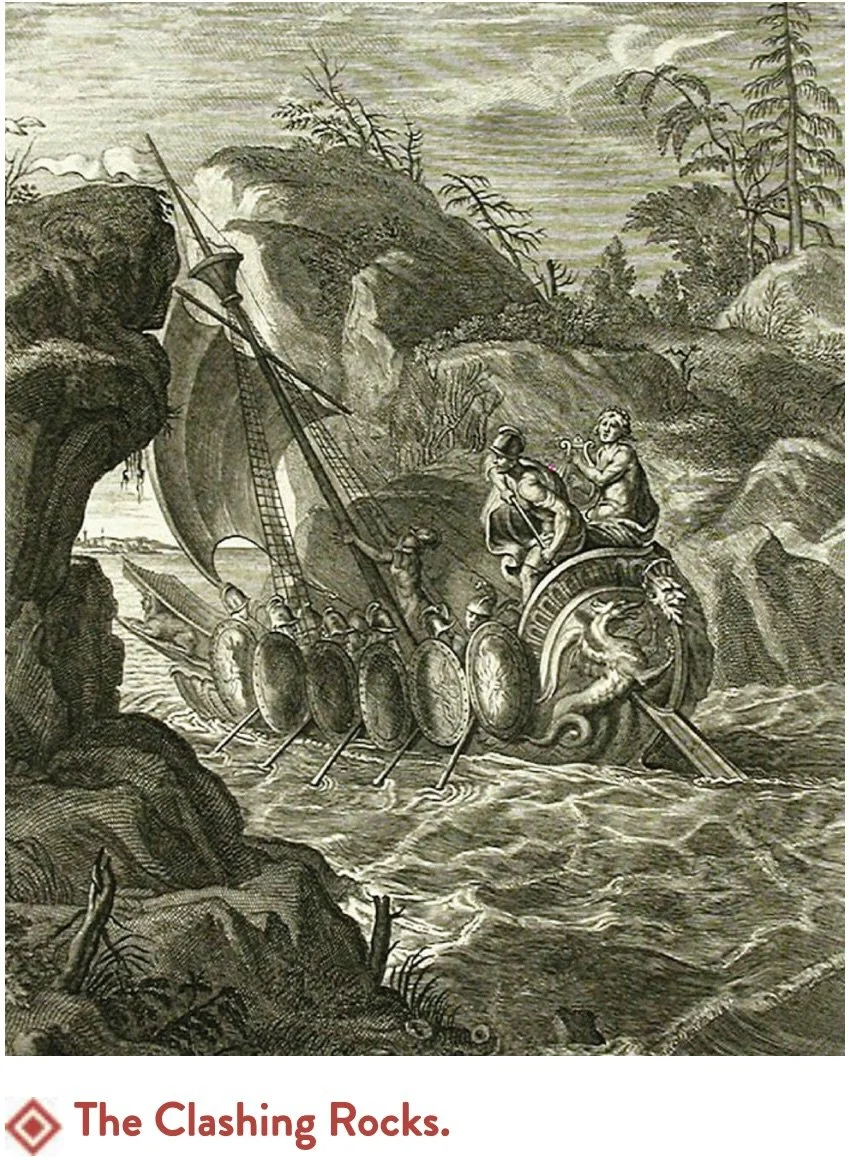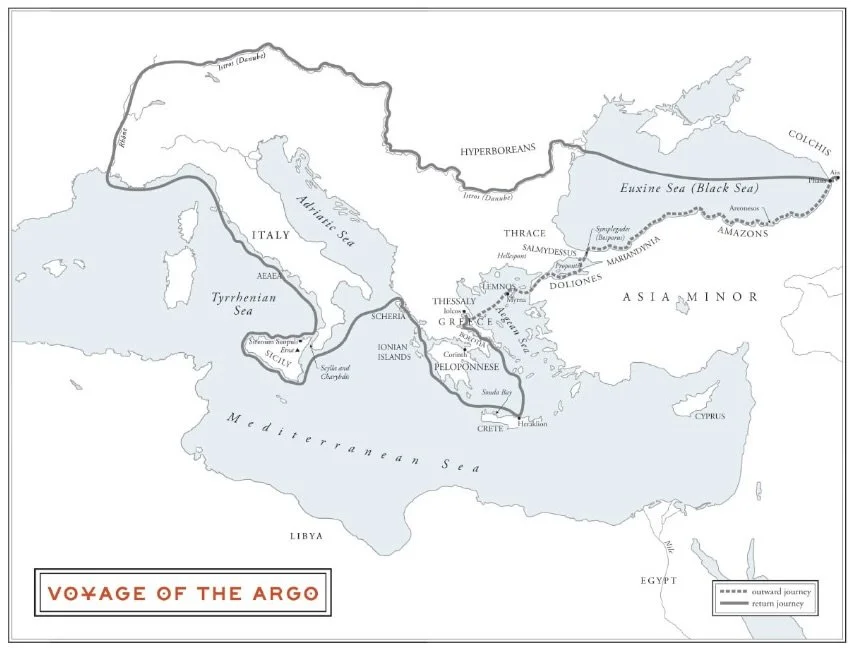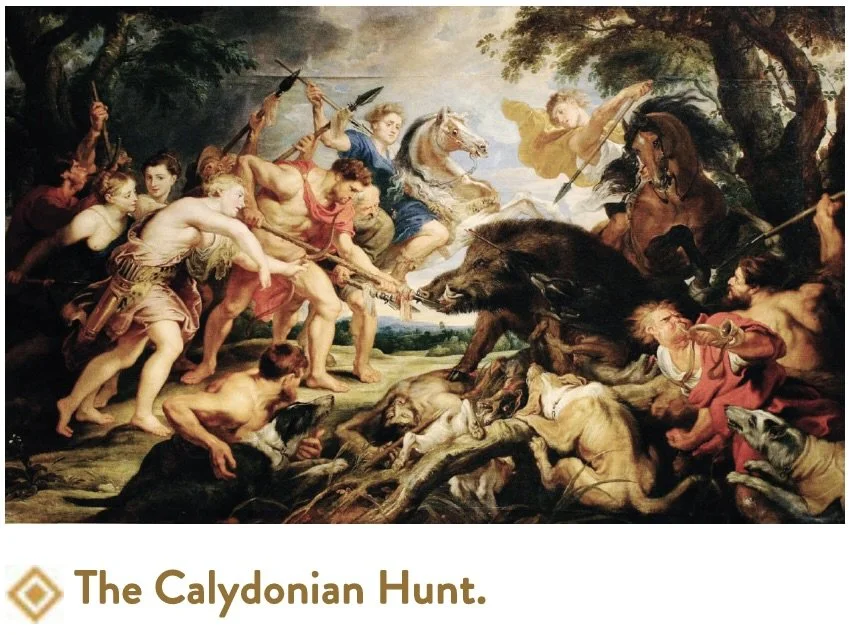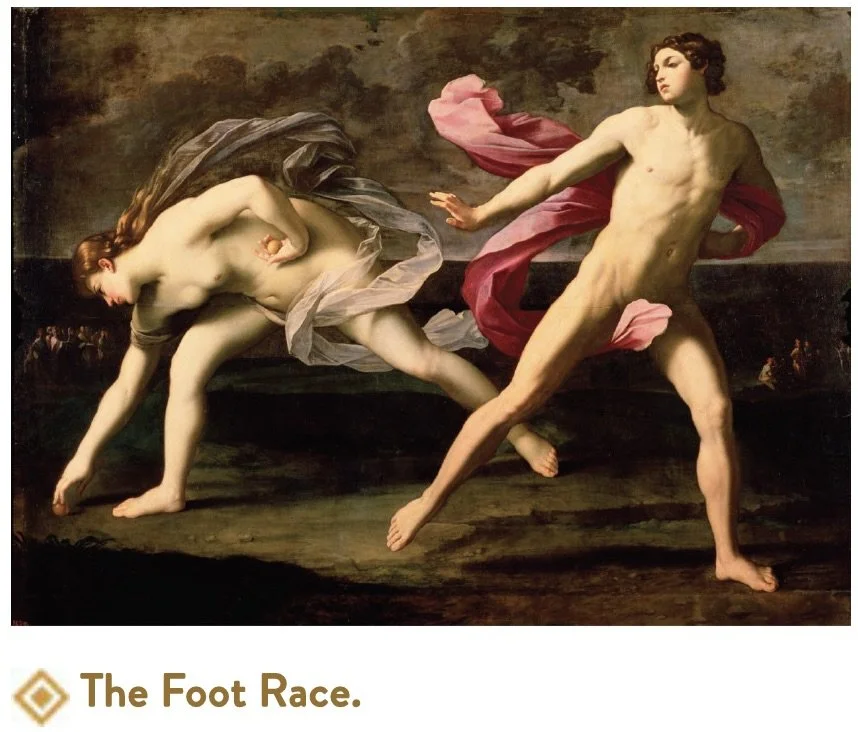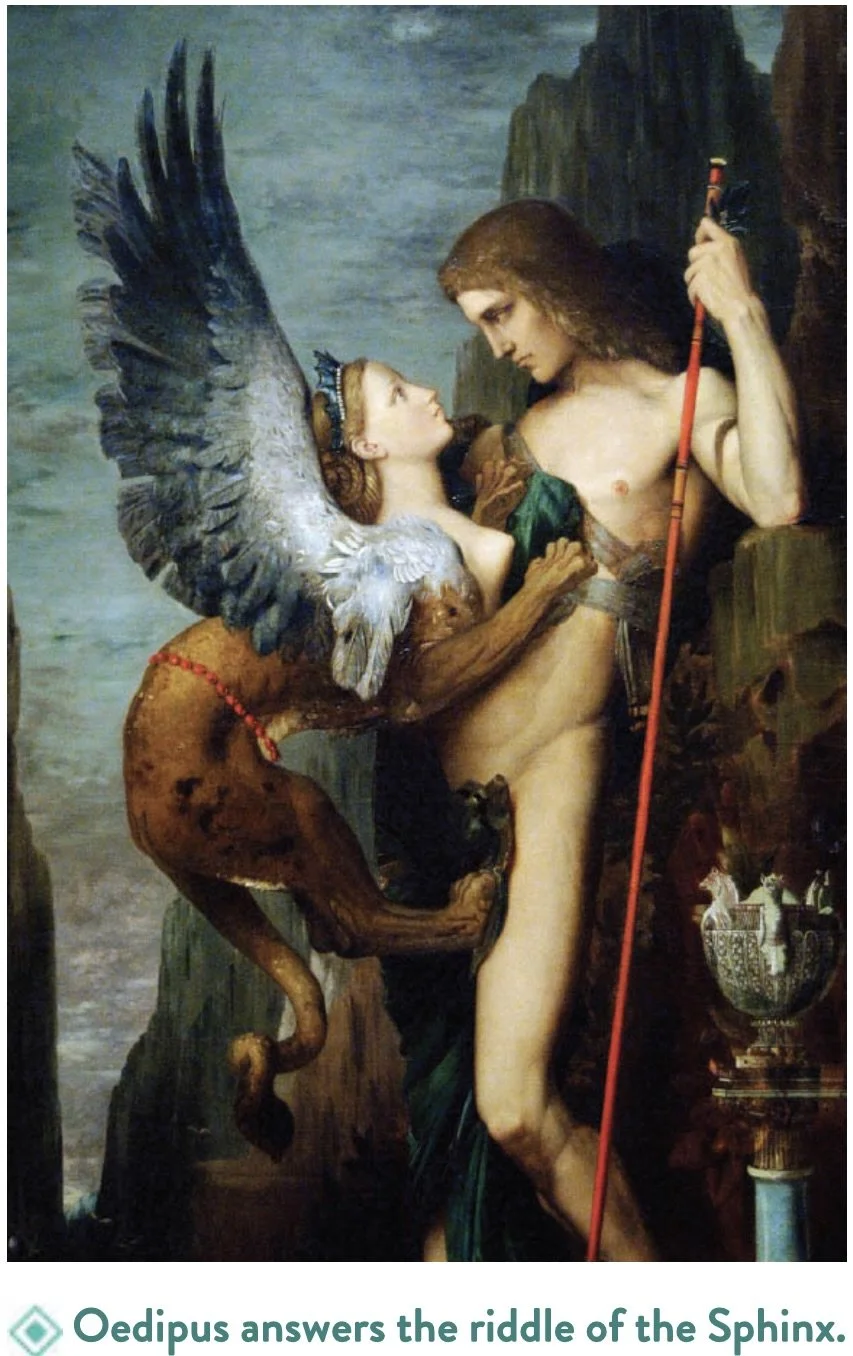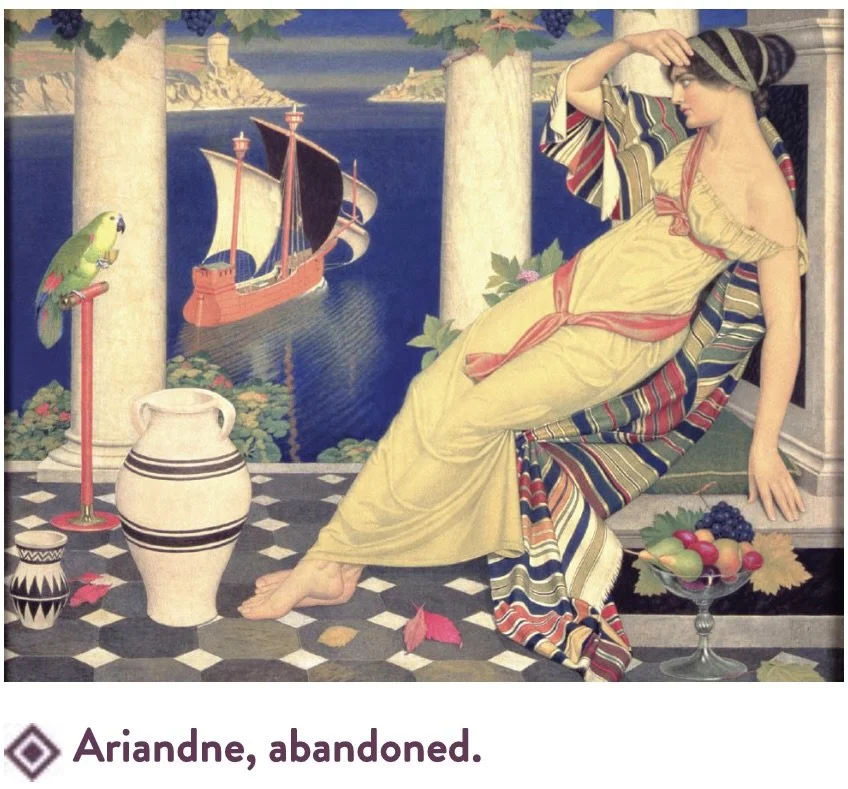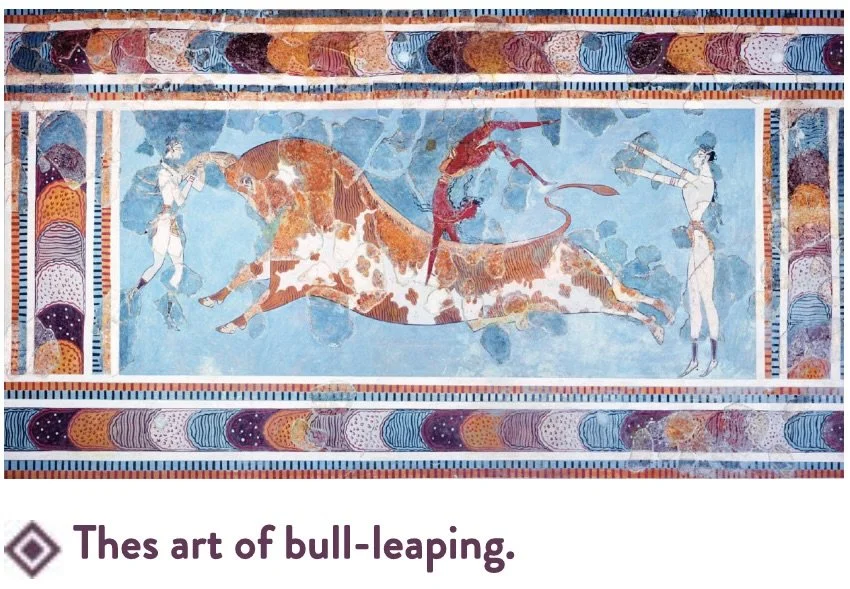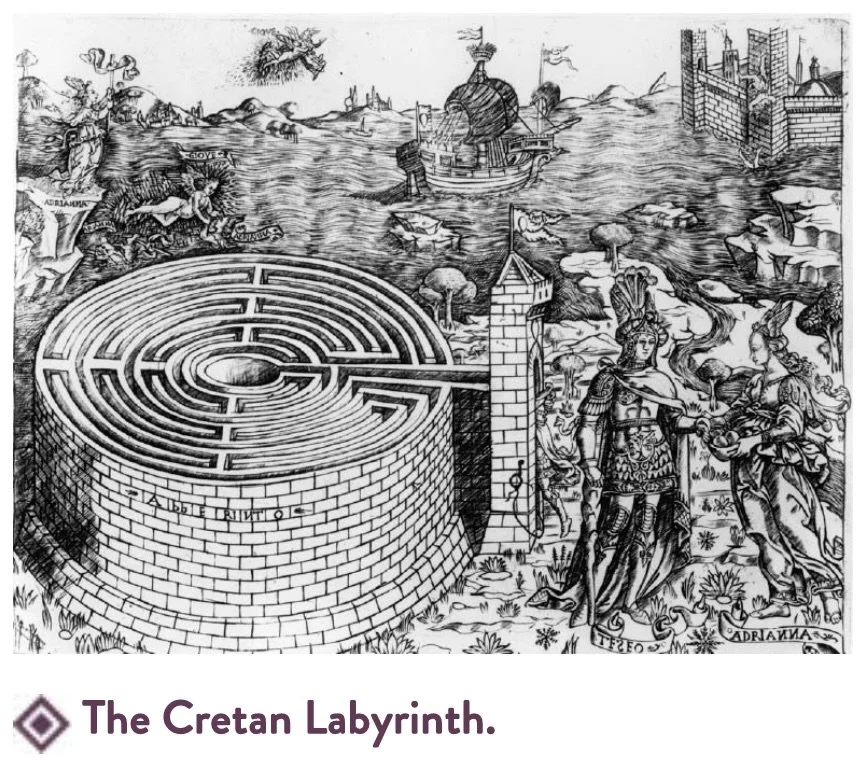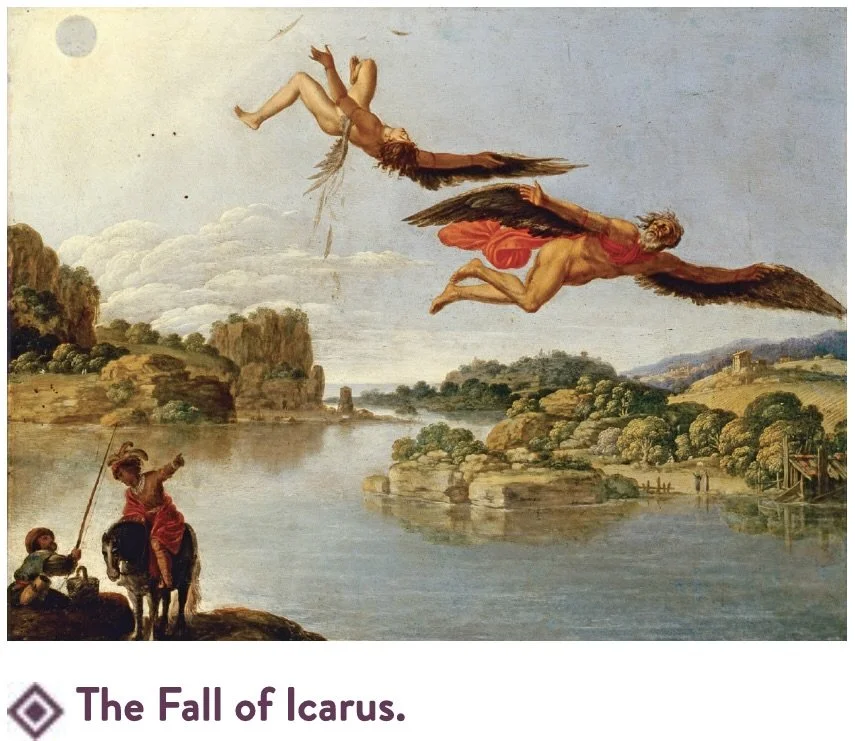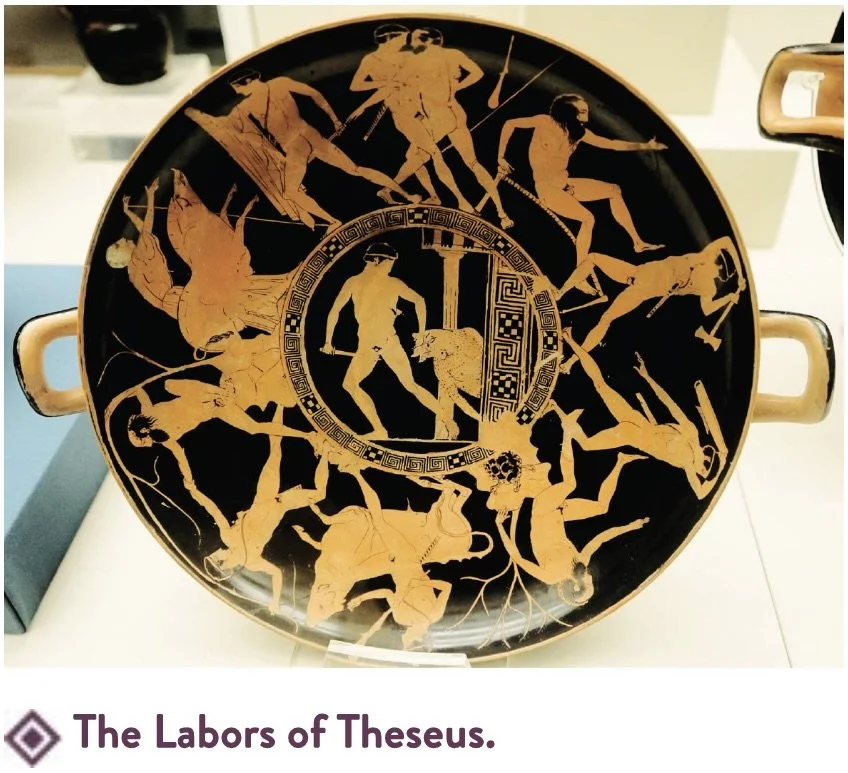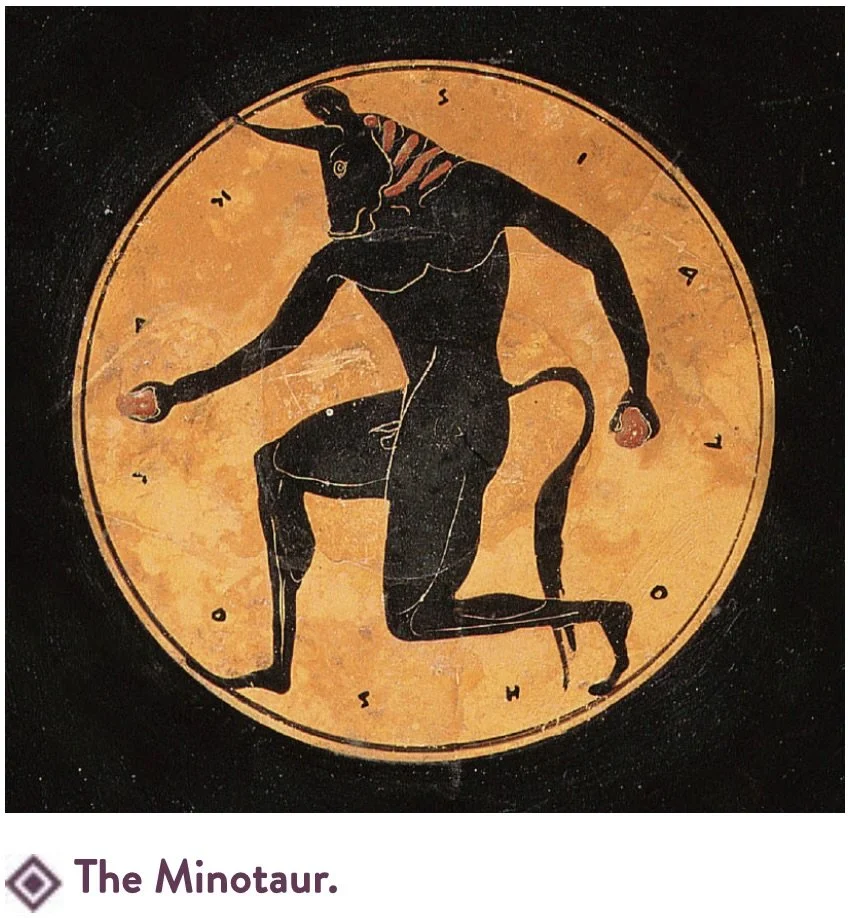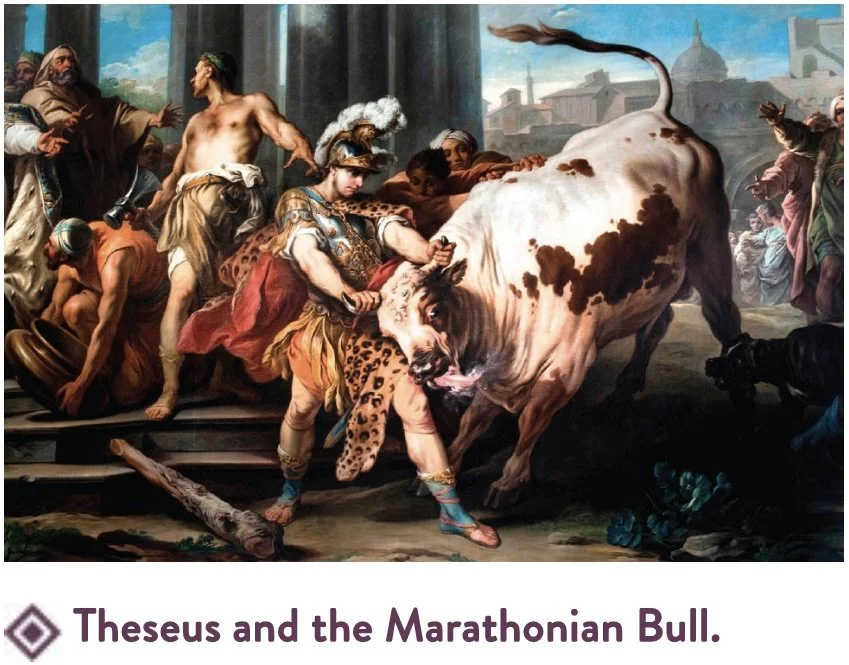Heroes by Fry
Ref: Stephen Fry (2018). Heroes. Chronicle Books.
___________________________________________________________________________
Summary
The heroes cleansed our world of the chthonic terrors—earthborn monsters that endangered mankind and threatened to choke the rise of civilization. So long as dragons, giants, centaurs, and mutant beasts infested the air, earth, and seas, we could never spread out with confidence and transform the wild world into a place of safety for humanity. In time, even the benevolent minor deities would find themselves elbowed out by the burgeoning and newly confident human race. The nymphs, dryads, fauns, satyrs, and sprites of the mountains, streams, meadows, and oceans could not compete with our need and greed for land to quarry, farm, and build upon. The rise of a spirit of rational inquiry and scientific understanding pushed the immortals further from us. The world was being reshaped as a home fit for mortal beings only.
The heroes, however, more than the gods, nymphs, or other mortals, live on in the works of the three great Athenian tragedians, Euripides, Aeschylus, and Sophocles. They embellish and alter the myths it is true, but as playwrights their interest lay in dramatic truth and a focus on characters in crisis.
Sophocles’ Theban Cycle is the source for the most commonly told versions of the tragic story of Oedipus and his family. Euripides enters the hearth and home of Jason, Theseus, and Heracles, and concentrates on the women in their lives. Aeschylus comes into his own later, outside the parameters of this volume.
There are those who like to think that many myths are pearls built up around grains of fact. In the past, even in antiquity, mythographers regularly attempted to trace almost all mythic stories back to some actual, historical truth. This is sometimes called Euhemerism or the historical theory of mythology.
Carl Jung described myths as the product of our “collective unconscious.”
Even today we cannot understand or explain much of what drives us. Take love for example. To say “she fell in love” is to describe a mystery. One might as well say, “Eros pierced her heart with his arrow.”
The gods in Greek myth represent human motives and drives that are still mysterious to us. Might as well call them a god as an impulse or a complex. To personify them is a rather smart way—not of managing them perhaps, but of giving shape, dimensions, and character to the uncontrollable and unfathomable forces that control us. Do “superego” and “id” reveal any more about our inner selves than Apollo and Dionysus? Evolutionary behavioralism and ethology may tell us more about who and how we are as scientific fact, but the poetic concentration of our traits into the personalities of gods, demons, and monsters are easier for some of us dull-witted ones to hold in our heads than the abstractions of science.
Myth can be a kind of human algebra which makes it easier to manipulate truths about ourselves.
___________________________________________________________________________
INTRODUCTION
ZEUS sits on his throne. He rules the sky and the world. His sister-wife HERA rules him. Duties and domains in the mortal sphere are parceled out to his family, the other ten Olympian gods. In the early days of gods and men, the divine trod the earth with mortals, befriended them, ravished them, coupled with them, punished them, tormented them, transformed them into flowers, trees, birds, and bugs, and in all ways interacted, intersected, intertwined, interbred, interpenetrated, and interfered with us. But over time, as age has succeeded age and humankind has grown and prospered, the intensity of these interrelations has slowly diminished. In the age we have entered now, the gods are still very much around, favoring, disfavoring, directing, and disturbing, but PROMETHEUS’S gift of fire has given humankind the ability to run its own affairs, build up its distinct city-states, kingdoms, and dynasties. The fire is real and hot in the world and has given mankind the power to smelt, forge, fabricate, and make, but it is an inner fire too; thanks to Prometheus we are now endowed with the divine spark, the creative fire, the consciousness that once belonged only to gods.
For punishment, Prometheus is shackled to the side of a mountain. He is visited each day by a bird of prey that soars down out of the sun to tear open his side, pull out his liver, and eat it before his very eyes. Since he is immortal, the liver regenerates overnight, only for the torment to repeat the next day.
KRONOS the Titan castrated his father, the primordial sky god OURANOS, and hurled his genitals across Greece, a race of giants sprang from where the drops of blood and seed fell.
GAIA, the earth goddess, and TARTARUS, god of the depths beneath the earth. Their offspring, the monstrous ECHIDNA and TYPHON.
___________________________________________________________________________
PERSEUS
Acrisius, ruler of Argos, having produced no male heir to his kingdom, sought advice from the oracle at Delphi as to how and when he might expect one. The priestess’s reply was disturbing: King Acrisius will have no sons, but his grandson will kill him. Acrisius loved his daughter and only child Danaë, but he loved life more. It was clear from the oracle that he should do everything in his power to prevent any male of breeding age from getting close to her.
Zeus coveted Danaë but could not get into her chambers. One night, a shower of golden rain streamed down through the narrow slit of the skylight, poured itself into Danaë’s lap, and penetrated her. In due time, she gave birth to a healthy mortal boy, whom she named Perseus.
Acrisius had Danaë and the infant Perseus shut up in a wooden chest. His soldiers hurled the chest over the cliffs and into the sea. After floating in the sea for days, they were caught in a fisherman’s nets and taken to Seriphos were they passed 17 years living with the humble fishermen Dictys, who was the brother of Seriphos’ king, Polydectes.
Polydectes resolved to wed Danaë, but sought the hand of Hippodamia, daughter of Pisa’s King Oenomaus. Just as the oracle had prophesized that King Acrisius of Argos would be killed by a grandson, so it had told Oenomaus that he would be killed by a son-in-law. At the wedding party, Polydectes got Perseus drunk and asked him to bring him the head of Medusa.
Medusa was a beautiful young woman who was taken and ravished by the sea god Poseidon. Unfortunately for her this took place on the floor of a temple sacred to Athena. She punished Medusa by transforming her into a Gorgon, a creature with boar’s tusks, razor sharp claws of brass, and venomous snakes for hair. One glance would turn you to stone. Medusa lived with her natural born immortal sisters, Stheno and Euryale, daughters of the ancient divinities of the sea, Phorcys and Ceto, on an island.
Perseus visited the Oracles at Delphi to determine the location of the island and was told “he must travel to a land where people subsist not on Demeter’s golden corn but on the fruit of the oak tree.” An old lady listening nearby helped him decipher the words and instructed him to visit the oracle at Dodona.
At Dodona, Perseus was met by Athena, daughter of Zeus and Metis, and Hermes, son of Zeus and Maia. Athena gifted him a polished shield named Aegis and a harpe- a short bladed weapon, curved like a scythe, forged from adamantine. Hermes gifted him flying sandals and an invisibility cloak from Hades. Athena instructed Perseus to find the Graeae, or grey ones, daughters of Phorcys and Ceto who were three sisters that “know everything but tell nothing.” The sisters shared a single eye and a single tooth, and could be found in a cave on the shores of Kisthene.
Perseus used Hades’ cloak to enter the cave and hid the eye and tooth of the sisters, telling them where they were hidden in exchange for the location of Medusa. The sisters told him she was on the island of Enyo, off the coast of Libya. Perseus found the island, used the mirror to locate a sleeping Medusa with her gorgon sisters, flew in and chopped her head off, immediately placing it in the satchel given to him by Athena.
Since the day Poseidon violated her in Athena’s temple, Medusa had held in her womb twins from that union. With her head removed, both were born- the first a young man bearing a weapon of shining gold. His name was to be Chrysaor, which means “Golden Sword.” His twin was the shimmering white, winged horse, Pegasus.
Perseus flew from the island and came across the woman Andromeda, who was naked and chained to a rock. Andromeda was the daughter of the Cepheus and Cassiopeia, king and queen of Ethiopia.
Queen Cassiopeia had remarked one day that Andromeda was more beautiful than all the Nereids and Oceanids in the world. Poseidon heard this boast and was so outraged he sent a monstrous sea dragon called Cetus to ravage the shoreline. No shipping could get through and the people began to starve. The priests informed the King and Queen that to appease the Gods and call of Cetus, they must chain Andromeda naked to the rocks. Cetus would devour her, but the kingdom would be saved.
Perseus dove into the water and slayed the sea dragon Cetus. After rescuing Andromeda, she fell in love with him and they returned to the royal palace of Cassiopeia and Cepheus. Perseus sought Andromeda’s hand, but Andromeda had been promised to the Kings brother Phineus. Phineus was a brother Aegyptus and a descendant of Nilus. He believed that an alliance with Andromeda would allow him to unite the powerful kingdoms of the Nile. Aggrieved, Phineus challenged Perseus, who responded by showing the head of Medusa to Phineus and his 60 men. They were all instantly turned to stone.
Perseus returned with Andromeda to his home island of Seriphos. When they landed on the beach, they found that his adoptive father Dictys’s cottage had been burned to the ground. Danaë and Dictys had been taken prisoner by Polydectes. Perseus flew with Andromeda to Polydectes’ palace. Danaë and Dictys had secretly wed and Polydectes was going to have them killed for it. Perseus showed the head of Medusa to Polydectes, turning him and his men-at-arms to stone instantly.
Dictys and Danaë were made king and queen of Seriphos. Andromeda and Perseus moved on. They could have returned to Andromeda’s homeland and ruled the combined kingdoms of Ethiopia and Egypt but Perseus was keen to visit the land of his birth. His grandfather King Acrisius had done everything to prevent his existence and shorten his life, but he was curious to see what Argos, the famous kingdom of his birth, was like. The people of Argos, having heard of Perseus’s astonishing feats, invited him to fill the vacant throne.
They heard news that the King of Larissa was holding the richest games of the year and made their way north to Thessaly to compete. Perseus prevailed in every race and every competition. During the discus, Perseus had struck someone in the crowd. It turned out to be King Acrisius of Argos, his father. Despite it being an accident, it was a blood crime. Perseus and Andromeda made a pilgrimage to Mount Cyllene in Arcadia and the temple of Hermes near the cave where the god was born. On the altar stone they laid the hood of invisibility and the talaria, the winged sandals. They made their way to Athens, and in the deepest recesses of the temple of Athena they hid the sickle, the shield, and the satchel that held the head of Medusa.
Perseus and Andromeda founded Mycenae, a great kingdom, under the name of Argolis or the Argolid, which absorbed neighboring Arcadia, Corinth, and Argos. Through their son Perses, their bloodline founded the Persian nation and people. On their death, along with Cassiopeia and Cepheus, they were taken up into the heavens as constellations.
The name given to its people, the Argives, was often used by Homer simply to mean “Greek.” Philip II and his son Alexander the Great, although Macedonian, were said to originate from Argos.
The Roman poet Horace, in his Odes, changed the bronze room to a bronze tower, and thenceforward it has often been portrayed as just such a fairytale Rapunzel-like minaret. The earlier sources insist, however, that it was a room, with slits in the roof to let in light and air.
___________________________________________________________________________
HERACLES (‘Hercules’)
The grandson of Perseus and Andromeda was STHENELUS, the King of Mycenae. He was married to a young woman called NICIPPE. The second living grandson was AMPHITRYON, who had fallen in love with and married his cousin, another grandchild of Perseus and Andromeda, the beautiful ALCMENE. While hunting, Amphitryon had accidentally killed Alcmene’s father ELECTRYON (who was, of course, his uncle as well as his father-in-law). Amphitryon and Alcmene fled to Thebes where the ruler CREON expiated him for this blood crime.
Amphitryon returned home to conduct family business while his wife, Alcmene, remained in Thebes. While gone, Zeus appeared to her in the form of her husband Amphitryon and bed her. Amphitryon returned shortly after and slept with Alcmene as well. Having slept with Zeus and Amphitryon in rapid succession, she had been made pregnant by each of them. Twin sons formed inside her—one fathered by Zeus and the other by Amphitryon.
Zeus, excited about his soon to birth offspring, announced “the next child to be born in the line of Perseus shall rule the Argolid.” Hera, jealous of Zeus’ affair with Alcmene, knew that Sthenelus’ wife Nicippe had also become pregnant, although she was only seven months on.
Hera summoned her daughter EILEITHYIA, goddess of childbirth, and commanded her to go to Thebes, sit herself on a chair outside Alcmene’s bedchamber with her legs firmly crossed, and to remain in that position until further notice. This posture would prevent Alcmene from opening her own legs to give birth, which Hera knew would suffocate and kill the children in her womb. Meanwhile, Hera went to Tiryns with a potion to induce Nicippe to give birth to her son by Sthenelus prematurely. In Tiryns, Nicippe successfully delivered a healthy boy, who she called EURYSTHEUS; he would grow up to rule the Argolid (the united lands of Mycenae, Corinth, Arcadia, and Argos).
Alcmene was attended by attendees Galanthis and Historis. They fooled Eileithyia by pretending the baby had been born. Seeing this, Eileithyia uncross her legs and stood at once. Through the open door she saw Alcmene, attended by Historis, now open her legs and push. First one, then another baby boy emerged and filled the air with healthy wailing cries. From that moment on, Hera swore eternal enmity against Alcmene’s son by Zeus. Amphitryon and Alcmene named the twin first from the womb Alcides, in honor of his grandfather Alcaeus, son of Perseus; the other they called IPHICLES.
Concerned for the children’s wellbeing, Zeus had Hermes take Alcides from his cot, flew him up to Olympus, and gave him to Athena. Athena gently dropped the baby Alcides on Hera’s breast while she slept. At once he began to gorge himself. But he guzzled at her teat with such vigor that Hera woke up. She looked down, plucked Alcides from her nipple, and threw him disgustedly from her. Milk sprayed from her nipple in a great arc across the night sky, imprinting it with stars. Stars which, from that moment, would be known as the Milky Way. Alcides was renamed for ‘Hera’s glory’ or ‘Hera’s pride’- ‘Heracles’.
Heracles grew up with his twin half-brother Iphicles. Chariot driving, javelin and discus throwing, track jumping and running were taught by Amphitryon. EURYTUS, King of Oechalia, the most famed bowman in Greece and a grandson of the archer god Apollo, taught the young Heracles to string a bow and shoot arrows with speed and accuracy. LINUS, the brother of ORPHEUS and a fine musician himself, taught Heracles and Iphicles how to tune and play a lyre, how to compose and sing, how to tap out precise rhythms, and how to dance (Linus was later accidentally killed by Heracles in a bout or rage). CASTOR himself, the twin of POLYDEUCES, and like Heracles the offspring of a divine heteropaternal superfecundation, completed the youth’s training in weaponry and the manly arts. Athena presented him with a robe, Poseidon gave him fine horses, Hermes a sword, Apollo a bow and arrows, HEPHAESTUS a most wondrous breastplate of pure gold.
Heracles slayed a fierce lion on Mount Cithaeron when he was still only 18. For 49 days, he tracked the terrible creature; while each night the King Thespis of Thespiae, rewarded Heracles for his heroic efforts by sending him each night one of his 50 daughters. When at last the 50th day dawned, the lion was cornered and killed. That night, after enjoying the 50th daughter of the king, Heracles went home. On Heracles’s return, he single-handedly defended Thebes against an attack from King ERGINOS of Orchomenos.
Theban King Creon offered Heracles the hand of his daughter Megara. After years of happy marriage with two children, Hera disguised Megara as a dragon and his two children as demons. Heracles slew them at once. When news broke of what he had done, no one would speak to, or come near to, him. From hero to zero.
Heracles consulted the Pythia who instructed him “to atone for his abominable crimes Heracles must take himself to Tiryns and supplicate himself before the throne” (the priestess had been entranced by Hera). Mycenean King Eurystheus, Heracles cousin, also entranced by Hera, required Heracles to complete ten tasks (ten labors) without labor or assistance over 10 yrs in order to supplicate himself for his blood crime.
1st Labor: THE NEMEAN LION
The Nemean lion, offspring of the Chimera, preyed on the people of Nemea in the NE of the kingdom, near the Isthmus of Corinth. Fear of this lion was deterring mainland travelers and merchants from trading with the Argolid and the rest of the Peloponnese.
Heracles tracked and killed the lion. He skinned off one great piece, snarling head included. He strung the deadly claws into a necklace and in an excess of frenzied joy he pulled up the greatest oak tree he could find and stripped it of its branches to form a mighty club.
2nd Labor: THE LERNAEAN HYDRA
Lake Lerna was terrorized by the Hydra, a huge water serpent that guarded the gate to the underworld. The Hydra had nine heads (one of which was immortal), each capable of spraying jets of the deadliest poison known in the world. Hera had also had hidden in the lake’s depths a ferocious giant crab.
Heracles shattered the crab’s shell into thousands of fragments. Hera placed her favorite crustacean in the stars where it shines as the constellation Cancer, the Crab. As he sat at a safe distance, pondering what to do next, his nephew Iolaus, son of Heracles’s twin brother Iphicles, helped devise a plan: Heracles would advance and lop off a head, then Iolaus would step smartly in with a burning torch and sear the fresh stump, preventing any new heads from erupting in its place. After hours of effort, there was only one head left, the immortal head. At last Heracles hacked this off too and buried it far underground.
Heracles knelt beside the Hydra’s body and coated the tips of his arrows with its congealing blood. The Hydra’s poisonous vapors breathe up their sulfurous gas by the waters of Lake Lerna to this day.
3rd Labor: THE CERYNEIAN HIND
The golden-horned, brass-footed Ceryneian Hind was sacred to Artemis. Heracles succeeded in netting and subduing the animal. He had no wish to harm so shy and beautiful a creature. Enraged, Artemis strung his bow to kill Heracles until Apollo stepped out of the wood and pushed the bow down. “Now sister,” he said. “Don’t you know this is Heracles?” Artemis turned to Heracles. “You may continue on your way,” she said. “But when you have shown my hind to the court in Mycenae you must return her to the wild.”
4th Labor: THE ERYMANTHIAN BOAR
Heracles was instructed to bring back alive a giant boar that was ravaging the area around Mount Erymanthus, in Arcadia. Heracles went to seek advice about the boar’s habits from a friend of his who lived nearby, a centaur named PHOLUS. The offspring of IXION and the cloud goddess NEPHELE.
Pholus invited Heracles to stay in his cave. One night after dinner, Heracles helped himself to a stone jar of wine. He had no reason to know that it was the common property of the whole centaur tribe. The smell of the wine attracted the other centaurs and they trotted up to demand their share. An ill-mannered argument broke out. The row became a fight and the fight soon degenerated into slaughter as Heracles unloosed a volley of arrows dipped in Hydra blood. Even poor Pholus died when he dropped an arrow on his foot, piercing the skin above the hoof. A few of the Arcadian centaurs did survive. Among them was one called NESSUS.
Heracles wrestled the boar and returned it to Mycenae.
5th Labor: THE AUGEAN STABLES
King AUGEAS of Elis, a son of Helios the sun god, was possessed of a herd of 3000 immortal cattle. Eurystheus instructed Heracles to clean out the stables of King Augeas in one day. King Augeas told Heracles he would grant him some of the cattle for the effort.
Heracles diverted the waters of two local rivers, the Peneus and the Alpheus. The waters poured through the stables and sluiced out the accumulated muck of 30 yr. The manure-rich torrents swept down into the plains and fields of Elis and fertilized the land for miles around.
After requesting payment, King Augeas reneged on his deal, and angrily banished his son, Phyleus, and Heracles from his kingdom. Phyleus was exiled to Dulichium, an island in the Ionian Sea, while Heracles made his way back to Mycenae, simmering with rage. He swore that one day he would return and have his revenge on Augeas.
6th Labor: THE STYMPHALIAN BIRDS
Eurystheus instructed Heracles to rid Lake Stymphalia of its infestation of birds. It is generally accepted now that these were fearsome man-eating creatures the size of cranes with beaks of iron, talons of brass, and foul, toxic droppings. Sacred to ARES, the god of war, they infested the tree-lined shores of Lake Stymphalia causing havoc and distress to the farmers and villages of northeastern Arcadia
When Heracles tried to approach, he sank up to his shoulders in the miasmic filth. Observing his plight, Athena provided him with a great bronze rattle, manufactured in Hephaestus’s forge. Its ear-splitting, rapid-fire clacking flushed the birds from their roosts in panic and fright and Heracles was able to shoot them down in enough numbers to cause the remainder to fly away.
7th Labor: THE CRETAN BULL
Many years ago, a great white bull had charged out of the sea onto the shores of Crete. It had been sent by the god Poseidon in answer to the prayers of King MINOS, who wished to awe his subjects with a sign that his rule was divinely sanctioned. The idea was to sacrifice the bull to Poseidon once his brothers accepted this proof, but both Minos and his wife PASIPHAE were so enchanted by the creature’s beauty that they hadn’t the heart to slaughter it.
Pasiphae went so far as to mate with it. She bore it a son ASTERION, half-man half-bull, known as the Minotaur, who lived trapped in a cunning labyrinth built to house it by Minos’s architect, inventor, and designer, the great DAEDALUS. The bull, meanwhile, rampaged around Crete, savage, untamable, and terrifying. As a favor to Minos, Eurystheus sent Heracles there to subdue it and bring it to Tiryns.
Heracles mounted the bull and rode it over the waves the way back to the Peloponnese. Once free of its master, it made its home on the plain of Marathon, where it tormented the local people
8th Labor: THE MARES OF DIOMEDES
Eurystheus instructed Heracles to bring him the four mares of DIOMEDES from Thrace. The Mares were Podargos (‘the flashing-footed’), Xanthippe (‘the yellow horse’), Lampon (‘the shining one’), and Dinos (‘the terrible).
On his way north to Thrace, Heracles dropped in at Pherae to stay with his friends King ADMETUS of Pherae and his queen ALCESTIS.
Previously, Zeus had been forced to kill Apollo’s son Asclepius, the master of medicine and the healing arts. Ares and Hades had complained about Asclepius’s habit of bringing mortals back to life, making a nonsense of war and death. Zeus accepted their arguments and struck Asclepius down with a thunderbolt. Apollo stormed up to Hephaestus’s forge in a rage and shot all three of the Cyclopes- Arges, Steropes, and Brontes, with arrows. Zeus banished Apollo from Olympus, sentencing him to labor in bondage to a mortal. Being famed for his hospitality, the Thessalian king Admetus was the mortal Zeus selected, sending Apollo to serve as his herdsman for a year and a day. The young king became Apollo’s lover. The god even helped him win Alcestis, 1 of the 9 daughters of King PELIAS of Iolcos. Alcestis was so beautiful that princes and nobles from all over Greece sought her hand. Her father ruled that he would give her in marriage to the first suitor who proved able to harness a boar and a lion to a chariot. So fond of Admetus was Apollo that he could not bear the idea of his beloved friend dying. He invited the MOIRAI—the three Fates, CLOTHO, LACHESIS, and ATROPOS—up to Olympus and got them very drunk. Apollo asked the Moirai for eternal life for Admetus. The Moirai responded yes but only “if Admetus King of Pherae can find someone else willing to die in his place…” Eventually it was his loyal and loving wife Alcestis who announced that she would be content to die in her husband’s place. Alcestis thought about how much less of a life he would have without her. In fact, he now saw that a long and endless existence alone would be worse than death. He begged her not to go. But her declaration of intent to take his place had been heard and recorded by the Fates. Die she must—and die she did.
It was at exactly this moment, with a devastated Admetus trying to come to terms with what he had done, that Heracles called in at the palace. Heracles went to pay his respects at Alcestis’s brand-new tomb. There he found THANATOS, the god of death. Heracles wrestled Thanatos until he released the soul of Alcestis.
Due to the depraved king’s habit of feeding them human flesh, all four had turned quite untameably mad and were kept chained with iron shackles to bronze mangers, a danger to all who approached. When Heracles arrived at Diomedes’s palace in Thrace, he was accompanied by his young friend and lover ABDERUS, a son of Hermes. Leaving Abderus to watch over the horses, Heracles set off to negotiate with the king. One of them caught his hand between her teeth, dragged him into the stalls, and devoured him in minutes. Heracles buried the remains and founded a city around the tomb, which he called Abdera in honor of his lost beloved.
The distraught and maddened Heracles turned his wrath on Diomedes, slaughtering his palace guard and feeding the king to his own horses. The unpleasant taste of their master caused the mares to lose their appetite for human flesh so that Heracles was able safely to harness them to a chariot and drive them all the way back to Mycenae.
Later Greeks believed that it was from this line that Alexander the Great’s famous mount, Bucephalus, was descended.
9th Labor: THE GIRDLE OF HIPPOLYTA
Eurystheus allowed his daughter, Admete, to grant a labor. She instructed Heracles to retrieve the Girdle of Hippolyta from Hippolyta, the queen of the Amazons, who were the daughters of Ares and the nymph Harmonia.
The Amazons lived to the east, along the banks of the Thermodon (modern River Terme in Turkey). They were the first warriors in the world to ride on horseback. Heracles sailed for Pontus, on the S. coast of the Black Sea, and on arrival, he was met by a friendly welcoming party including Queen Hippolyta herself. Heracles told Hippolyta about his labor. While Hippolyta brought Heracles to his tent, Hera walked the riverbank in the form of an Amazon warrior, sowing confusion, doubt, and distrust among the Amazons.
The Amazon’s attacked Heracles men. The smiles and hospitality had been a trap. Hippolyta had tried to make a fool of him. He took her head in his hands and snapped her neck. Seeing their leader dead, the fight left them. Heracles’s men, heartened by the sight of their leader with his blood up and roaring like a lion, rallied. In a short time, the banks of the river were littered with the bodies of dead Amazons.
Heracles and his men broke the long return journey back to Mycenae by putting in at Troy. It was ruled at this time by LAOMEDON, grandson of the king TROS who gave Troy and Trojans their names, and the son of king ILOS, who gave the city its other name, Ilium, as in Homer’s great epic, the Iliad. Troy was a fine city; the construction of its walls had recently been completed by the gods Apollo and Poseidon. Laomedon refused to pay the gods for their work. In revenge Apollo fired plague arrows into the city, while Poseidon flooded the plain of Ilium and sent a sea monster there to harry and devour such Trojans as tried to escape their disease-ridden city.
The priests and oracles of Troy told Laomedon that the only way to save Troy from disease, famine, and disaster was to chain his daughter HESIONE naked to a rock in the floodplain, for the sea monster to feast upon. Heracles promised to free Hesione if he could have the horses that had been bred from Zeus’s gift to Tros. Laomedon agreed and Heracles promptly killed the monster and rescued Hesione. Once more Laomedon reneged on a deal.
10th Labor: THE CATTLE OF GERYON
Eurystheus instructed Heracles to gather the entire herd of Geryon’s cattle.
Chrysaor (by his union with CALLIRRHOË, the “sweet-flowing” daughter of the sea Titans Oceanus and Tethys) had fathered the three-headed Geryon, a most terrible monster who fiercely protected an enormous herd of red cattle in the western island of Erytheia. Geryon charged the giant EURYTION, a son of Ares, and a ferocious two-headed dog, brother to CERBERUS, called ORTHRUS with guarding the cattle.
Heracles killed the two headed dog Orthrus (son of Typhon and Echidna, brother of Cerberus and the Lernaean Hydra, father of the Nemean Lion). He then killed both Eurytion and Geryon with hydra venom tipped arrows.
It is assumed he ferried as many as would fit with him in the Cup of Helios, shuttling back and forth until the whole herd stood on the N. African shore. As a memorial of his trip, he erected the Pillars of Hercules- one on the northern, Iberian, side called the Rock of Gibraltar, the other on the southern, Moroccan, side known as Ceuta.
Upon completion, Eurystheus claimed that two of his labors did not count, thus two more were required of him.
11th Labor: THE GOLDEN APPLES OF THE HESPERIDES
Eurystheus instructed Heracles to retrieve the golden apples of the Hesperides, three beautiful nymphs of the evening, who were daughters of NYX, the goddess of Night, and EREBUS, the god of darkness, who sprang from formless Chaos.
The Hesperides tended a garden in which grew an apple tree whose golden apples conferred immortality on whomever might eat one. Gaia herself had presented some of the fruit to Zeus and Hera for their wedding feast, and now Hera had set another child of Typhon and Echidna, the hundred-headed dragon LADON, to guard the tree.
In N. Europe Heracles encountered the nymphs of the river Eridanus. They urged him to seek the advice of NEREUS, one of the Old Men of the Sea. Heracles found him curled asleep on the sand. The moment Heracles laid a hand on his shoulder, Nereus transformed himself into a fat walrus. Heracles hugged him tight. In rapid succession he found himself grappling a horseshoe crab, a manatee, a sea cucumber, and a tunny fish. No matter the shape, Heracles held fast and refused to let go. At last, Nereus gave up and turned himself into a bearded old fisherman.
Beginning with the coast of Africa, Heracles roamed the outer fringes of the known world, seeking clues. In the lands between today’s Morocco and Libya he encountered the half-giant Antaeus, a son of Gaia and Poseidon, whose would challenge passersby to wrestling matches. Whoever lost the bout had to die, and ANTAEUS had raised a temple to his father on the seashore constructed entirely from the skulls and bones of his innumerable victims. News had reached Heracles that his younger cousin Theseus had defeated King CERCYON on the road to Athens by using the new art of pankration, which combined the traditional close grappling, chopping, kicking, and throwing with feinting, dodging, and the use of the opponent’s weight and strength against himself. He entered into a bout with Antaeus. Heracles pinned Antaeus easily but tired after Antaeus was renewed continually with energy. The truth dawned on Heracles. Antaeus was a son of Gaia. Every time he made contact with the ground he was able to draw strength from his mother Earth. With a final grunt of effort, he lifted him bodily off the ground. He held him high over his head until he felt the strength start to drain from the giant’s frame. With a final heave, he snapped his spine and threw him dead on the ground.
Heracles now encountered BUSIRIS, one of the 50 sons of Aegyptus. The Greeks felt distaste for the human sacrifices performed by the priests of OSIRIS, from whom Busiris got his name. In order to put a stop to the practice, Heracles allowed himself to be captured and chained up as the next sacrificial victim. As the knife was descending on his chest, he burst his manacles and killed Busiris along with all the priests of his order. Heracles renamed the town of Busiris in honor of the city of his birth, Thebes.
Heracles arrived at last in the lands between the Black and Caspian Seas. It was here, when he reached the Caucasus Mountains, that, just as Nereus had prophesized, he was hailed by a voice from high above. “Welcome, Heracles. I have been expecting you.” Heracles looked up and shaded his eyes against the sun. A figure was chained to the rock. “Prometheus? Heracles shot down Zeus’s avenging eagle. He shattered Prometheus’s manacles with a blow of his club. Prometheus informed Heracles that the Garden of the Hesperides lies in the far west.
Around its trunk of the golden apple tree was coiled the great serpent dragon Ladon. At the sight of a mortal peeping over the wall it raised its head and hissed. Heracles fired his arrow, killing the dragon. Another child of Echidna and Typhon lay dead. Heracles then carried the weight of the sky for Atlas (the Atlantic is named in his honor) while he gathered the golden apples.
Many years later, when the days of the gods were coming to an end, Zeus relented and turned Atlas into the mountains that still bear his name. They shoulder the sky in Morocco to this day.
12th Labor: CERBERUS
Eurystheus instructed Heracles to bring him Cerberus, the hound of hell, bred from the union of Typhon and Echidna. Heracles had killed Cerberus’s sister, the Hydra, and brothers, Orthrus and Ladon.
If he were safely to leave the underworld with Cerberus, he had to placate Hades. The nearest way to what counted as Hades’s heart was through his wife PERSEPHONE. For six months of the year she ruled by his side as Queen of the Underworld. In the world above, her mother Demeter, the goddess of fertility, mourned the loss of her beloved daughter and all the growth and life that were Demeter’s responsibility and gift to the world slowly withered into the dry death of autumn and the barren chill of winter. When, after six months below, Persephone ascended from the realm of the dead, the new life and buds of spring broke out, followed by full fertile fecund fruitful summer, until it was time for Persephone to return to the underworld and for the whole cycle to begin again. The annual rhythm of death and renewal in the ritual known as the Eleusinian Mysteries, a dramatic and ceremonial playing out of the seizing of Persephone by Hades and her descent into his kingdom, the desperate search by Demeter for her daughter, and finally her return to the upper world.
Heracles journeyed to Cape Tainaron in the Peloponnese, the southernmost point of all Greece, where could be found a cave that formed one of the entrances to the underworld. It was on his way to the throne room of Hades and Persephone that Heracles happened upon his cousin Theseus locked in the Chair of Forgetfulness next to his friend PIRITHOUS. Muted by the enchantment of Persephone and bound fast by two giant snakes that coiled around them, they held out their hands in a silent plea. Heracles extricated Theseus. Heracles then encountered Meleager, the prince who had led the Calydonian hunt. He instructed Heracles to find and wed his sister, DEIANIRA.
Hermes opened the gates to the throne room to Heracles and Hades agreed he could borrow Cerberus to complete his labor. Hercules wrestled the dog and completed his labor.
AFTER THE LABORS: CRIMES AND GRUDGES
Word reached Heracles that King Eurytus of Oechalia were holding an archery competition, the winner to claim the hand of his beautiful daughter Lole in marriage. Although Heracles had expiated himself of his blood crime, Eurytus’ would not allow Heracles to compete. Heracles possibly took 12 prize cattle with him as he left. Iphitus came to Tiryns to stay with Heracles and negotiate for their return, but under the influence of another of his horrible fits, Heracles hurled the young man to his death from the city walls.
The Gods punished this crime against xenia, or “guest friendship,” by infecting Heracles with a disease. Once again in search of purification and atonement, Heracles visited King NELEUS of Pylos and asked him to perform the necessary rites, as anointed kings had the power to do. But Neleus was an old friend of Eurytus. Iphitus had been like a second son to him, and he refused to cleanse Heracles of the murder. Heracles sought wisdom from the Pythia. When they would not grant it, he took the tripod from Xenoclea. At Apollo’s command, Xenoclea gave Heracles the advice he sought- “the only way you may be cleansed of Iphitus’s murder is by entering into slavery,” she said. “For three years you must serve another without question. The wages you would have earned will go to Eurytus in compensation for the loss of his son.” Xenoclea’s arrangement was that he would become the property of Queen OMPHALE of Lydia, who had ruled her kingdom alone since the death of her husband, the mountain king TMOLUS.
Queen Omphale and Heracles developed a relationship and after three years, he was released. His payment went to Eurytus, who refused it as compensation.
Free to pursue his vendettas, Heracles gathered an army and sailed off to exact his vengeance on the enemy who was nearest at hand: King Laomedon of Troy. He was accompanied by his old friends the brothers TELAMON and Peleus, who had been present when Laomedon had refused to honor his debt to Heracles. They sacked the city and slaughtered the king and all the royal household save Hesione, who was given to Telamon as a bride. Heracles also spared the youngest of Laomedon’s sons, Prince PRIAM, who was left in charge of the ruins.
Heracles sailed back to Greece and gathered more allies for the invasion of Augeas’s kingdom of Elis. Augeas got wind of this and mustered his own force under the command of the conjoined twins EURYTUS and CTEATUS.
During battle, Heracles’s brother Iphicles was killed. This fully roused Heracles into one of the raging furies that turned him into a cyclone of unrelenting savagery. He split Eurytus and Cteatus apart with his sword. Next, he killed Augeas and all his children save one, the son Phyleus, who had spoken up for Heracles when he had claimed payment for cleansing the stables and who had paid for his filial disobedience with banishment on the island of Dulichium. Heracles summoned him back from his exile to rule in his dead father’s place. It was here, in Elis, that Heracles now established athletic competitions to be held every four years, in honor of his father Zeus. He called them, after the name of his father’s mountaintop abode, the Olympic Games.
Heracles next turned his attentions to Neleus of Pylos, who had refused to conduct his propitiation for the murder of Iphitus. He attacked the kingdom and slaughtered all the members of the royal house, except one- Young Prince NESTOR who had had the good fortune to be away at the time of Heracles’s onslaught. He returned to a devastated Pylos that, in time, he built into a peaceful and prosperous kingdom.
Nestor’s father Neleus had been aided in his defense of Pylos by his ally Hippocoön, the King of Sparta. The unrelenting Heracles now attacked this king too. Heracles killed the king and his sons, installing on the throne his older brother TYNDAREUS, the rightful King of Sparta, whom Hippocoön had ousted years earlier. Without Heracles placing Tyndareus on the throne of Sparta, it is doubtful there ever would have been a Trojan War.
Gigantomachy
Giants: Sprang out of the Earth from the blood that poured from the severed genitals of the primordial sky god Ouranos. This made them the generation of Gaia (‘Gaia-gen’), which later became gigantes, ‘giants’.
The sun god Helios herd of cattle was stolen by the giant ALCYONEUS. This spark lit the fuse in what the Greeks were to call the Gigantomachy—the War of the Giants. Realizing that the theft of Helios’s cattle heralded war, Gaia began to search for a rare medicinal herb that would protect her giants from any harm this human hero might do them. Zeus was ahead of her: he told Selene and Helios not to drive their chariots of the moon and sun by night or day, and while the world was plunged into darkness, he gathered the entire store of the herb for himself.
Violence started when the cattle thief Alcyoneus scaled Olympus, pushed the gods aside, and forced himself on Hera. Heracles arrived in time to pull him off her and shoot him with one of his poisoned arrows. Alcyoneus fell, but raised himself up and rejoined the fray as if nothing had happened. He hurled Alcyoneus one more time to the ground and dragged him from Greece to Italy. There, at last, the power drained from him and Heracles buried him under Vesuvius. The earth all around the Mediterranean shook as Heracles, Prometheus, and the gods fought long and hard to protect Olympus and especially Hera, whom the Giants forced themselves upon one after the other. After Alcyoneus, first EURYMEDON, the King of the Giants, tried to assault her, then PORPHYRION, the “purple one.” The giants seemed to believe that if they got her with child, the offspring would be their great champion.
At all events Heracles saved Hera from wave after wave of attacks. The most powerful giant of all, ENCELADUS, still steaming and smoking with fury, was imprisoned by Athena under Etna. Hera’s hatred for Heracles turned to love.
After the Gigantomachy
Heracles made his way to Deianira’s home of Calydon to win her hand, only to discover that she was being wooed, against her will, by the river god ACHELOUS. Achelous was immortal, of course, so Heracles couldn’t kill him, but he easily wrestled him into submission, breaking off one of the god’s horns in the process. To get it back, the defeated Achelous offered in exchange the fabled Horn of Plenty, which the Romans called the cornucopia. The young Zeus had accidentally snapped this off the head of his beloved AMALTHEA, the nanny-goat who suckled him during his infancy and childhood on Crete. To compensate, Zeus had magically filled it with food and drink. No matter how many times it was emptied, it always replenished itself.
Heracles and Deianira lived together in Calydon and had four sons, HYLLUS, GLENUS, CTESIPPUS, and ONITES, and a daughter, Macaria.
Death
One night, at a feast, the cupbearer of his father-in-law OENEUS accidentally spilled wine all down Heracles and he lashed out at the unfortunate youth, knocking him dead to the ground with one blow of his fist.
After the incident, Heracles and Deianira headed for Trachis, which was ruled over by his friend CEYX and his wife ALCYONE. To reach Trachis, they had to cross the fast-flowing waters of the river Euinos. As they approached, they saw a centaur in a bright purple shirt standing on the near bank who kindly offered to ferry Deianira across. Heracles did not recognize him, but he recognized Heracles. For the centaur was Nessus, one of the herd Heracles had attacked while staying in the cave of Pholus on his way to hunt the Erymanthian Boar. Nessus and Deianira were halfway over when he attempted to molest her. Heracles heard her cries and fired one of his arrows into the centaur’s back. It staggered through the water to the riverbank and deposited Deianira on the grass. “Take my shirt from me; it is charmed. Keep it with you always. Should the day come when you feel your husband has started to grow weary of you, make him wear it . . . You will find that his love for you will come flooding back.”
Deianira and Heracles settled at the court of King Ceyx, but after a year or so Heracles marched out to Oechalia to settle his final grudge. He laid waste to Oechalia, slaughtered Eurytus and all his family save Iole, whom he decided to keep as a slave. He dragged her off home in triumph to Trachis along with the rest of his booty. When Deianira caught sight of her, she was overcome with fear and jealousy. Deianira sought the shirt of Nessus to restore Heracles love for her. She had her servant Lichas come to his room carrying the shirt and helped him into it. At first Heracles felt nothing. Then the skin on his back started to tingle and the tingling turned to fire and he leapt, twisting and bucking, as he tried to pull the shirt off. But the Hydra poison in the dried blood had been reactivated by his body heat and was already beginning to eat into his flesh and bones, burning and corroding as it went. He lashed out in fury at Lichas, killing him instantly.
Heracles ran around in pain uprooting trees. Although this seemed a sign of madness, Heracles was constructing his own funeral pyre. He clambered on top of it and lay back. “Light it!” he screamed. “Light it!” Philoctetes, trusted friend and comrade on many adventures, took a torch from its bracket on the wall of the house and stepped forward, lighting the pyre, and ending Heracles life. Deianira ran wailing back into the house and stabbed herself to death. Zeus remembered his promise and drew the soul of Heracles up to Olympus.
Legacy
As a mark of her deep affection, Hera bestowed the hand of her cupbearer, the goddess Hebe, on him as his final and eternal wife. Zeus raised him as the constellation Hercules, the 5th largest in our night sky.
The sons of Heracles—the HERACLIDES—eventually raised an army that defeated the tyrannical Eurystheus, who still ruled in Tiryns; Hyllus himself hunted down the fleeing king and beheaded him. They seized control of the Argolid, before installing ATREUS, son of Pelops, on the throne of Mycenae.
Chiron was accidentally scratched by one of Heracles’s arrows and suffered the most appalling agony. He alone among his race, being a son of Kronos, was immortal. The prospect of living eternally in such pain was insupportable to him. He begged the gods to be released into death and Zeus granted his wish, casting him into the heavens as the constellation Sagittarius, the man-horse archer. This is an egregious example of timeline inconsistency since Chiron was later tutor to ACHILLES, who was yet to be born.
___________________________________________________________________________
BELLEROPHON
Bellerophon was either the son of GLAUCUS, King of Corinth, or of Poseidon, God of the sea. His mother was EURYNOME, a favorite of Athena who taught her wisdom, wit, and the arts over which the goddess had dominion. His brother was Deliades, and the two were unlike in character and appearance.
Bellerophon had a way with horses, which were the province of Poseidon. Bellerophon had been taught that in the earliest times of the gods Poseidon created the very first horse as a gift for his sister Demeter.
Bellerophon sough to capture Pegasus, the winged white horse. Polyidus instructed him to go to the temple of Athena, lie down full length on the floor, close your eyes, and ask the goddess for help. Bellerophon went to the temple; Poseidon appeared telling him that he was his father. Athena appeared and gave him a golden bridle. Bellerophon used it to befriend and ride Pegasus. From then on, they were inseparable.
One day a messenger arrived from King PITTHEUS of Troezen, a small city-state tucked away in the SE corner of the Peloponnese. Bellerophon was invited to meet the king’s daughter, Aethra, with a view to betrothal. Bellerophon flew down on Pegasus, and before long, he and the princess had fallen in love. Their engagement delighted King Pittheus, who had long wanted to strengthen Troezen by uniting it with Corinth.
Two weeks before the wedding in Troezen, Glaucus, Deliades, and Bellerophon went hunting for wild boar in a forest outside Corinth. During the hunt, Bellerophon inadvertently hurled his spear at what he thought was a charging boar, but turned out to be Deliades, who was mortally wounded by the spear.
Bellerophon’s engagement to Aethra was cancelled. He was sent from Corinth to Tiryns, in Mycenae, to serve a period of penitence and purification. The ruler Proetus was able to cleanse Bellerophon of his crime.
Proetus’ wife Stheneboea attempted to seduce Bellerophon to no avail. In response, Stheneboea accused Bellerophon of assault. Proetus, not wanting to violate xenia, the laws of hospitality or guest-friendship, sent him with a letter to Stheneboea’ father, Lycian King Iobates, with sealed instructions for Iobates to kill Bellerophon.
Bellerophon landed with Pegasus near the city of Xanthus and walked to the Royal Palace of Lycia where he met King Iobates. Iobates was blessed with two daughters- Stheneboea, married to Proetus in Mycenae, and a younger unmarried daughter, Philonoë. Bellerophon and Iobates got along well.
On the 10th day, Iobates found the letter from Proetus read it- “the bearer of this letter tried to rape my wife, your daughter. Kill him.” Iobates, also fearful of violating xenia, charged Bellerophon with killing the Chimera, a two-headed monster that was the progeny of Typhon and Echidna, that ravaged the countryside around Methian, near the border with Caria and Pamphylia. Chimera breathed fire, had the body and head of a lion, a second head of a goat that rose from her back, and a venomous tail. On Pegasus, Bellerophon fought Chimera, hurling a lead-tipped lance deep into its open mouth. The molten lead killed the Chimera.
Iobates then charged Bellerophon with dealing with the men of Pisidia. These were descendants from Solymus who had married his sister Milye. Their descendants, the Solymi, paid no taxes, raided neighboring towns and villages, and had rose up in revolt against Iobates. Bellerophon killed 70 with Pegasus subduing the Solymi. He marched the rest to Iobates, where they swore allegiance to him.
Next Iobates urged Bellerophon to handle the Amazons, who were raiding Lycia from the NE. Mounted on Pegasus, Bellerophon dropped great boulders on the fierce warriors until they too pledged by treaty to leave Iobates and his Kingdom alone.
Next Bellerophon defeated the pirate CHEIMARRHUS.
The king then ordered his own citizens to take up arms and kill Bellerophon on his return to Xanthus. On his return, Bellerophon prayed to his father Poseidon, who flooded the River Xanthus, flooding its plain with water which swept toward the city. The women of Xanthus, desperate to save their homes and families, hoisted their dresses right up and ran toward him. Bellerophon, so bold and self-assured in other ways, was modest, shy, and awkward when it came to sexual matters. At the sight of the women’s buttocks, breasts, and bushes, he turned and ran, shocked and hot with shame and embarrassment. The floodwaters receded with him and the city was saved.
Iobates, considering the information from Proetus was false, forgave Bellerophon after determining that Stheneboea charges were wrong. Unable to bear the shame, Stheneboea hanged herself.
Bellerophon married Philonoë in Xanthus and, over the years, became arrogant and vane. One day, he mounted Pegasus and rode to Mount Olympus. “The gods will welcome me,” he told himself. “I am of their blood. I have always been marked out for greatness.” Such hubris was blasphemy and Zeus sent a gadfly to torment Pegasus. The insect’s vicious sting maddened the horse, who bucked, throwing Bellerophon. The hero plummeted down through the thin air, smashing his hip on the rocks far below. Pegasus landed on the top of Olympus and Zeus kept him there as his glamorous pack animal, charged with carrying his thunderbolts. Bellerophon dragged out the rest of his days shunned by society for his sacrilege, until he died a crippled, embittered, and lonely old man.
___________________________________________________________________________
ORPHEUS
Orpheus was the Mozart of the ancient world. His mother was Calliope, the Muse of Epic Poetry, and his father was either Thracian King Oaegrus or Apollo. Orpheus grew up with his mother and eight other Muses on Mount Parnassus. It was there that Apollo gifted him a golden lyre, which he personally taught him to play.
Orpheus was awarded the beautiful Eurydice by the gods for his bravery and loyalty. The wedding was attended by all the Muses, Thalia- who entertained with comedy sketches, and Terpsichore, who led the dances. Among the guests was Orpehus’ half brother Hymen, a son of Apollo and the Muse Urania. Hymen served as one of the Erotes (the young men in the love god Eros’s retinue), with a special responsibility for weddings and the marriage bed. Our words “hymn, hymen, hymenal” derive from him. Hymen failed to bless the union. The torch he bore spluttered and smoked, causing everyone to cough. The atmosphere was so acrid that even Orpheus was unable to sing with his accustomed sweetness of tone.
Orpheus and Eurydice lived together in Pimpleia, a small town that nestled in the valley below Olympus, close to the Pierian Spring, sacred to the Muses.
Eurydice’s misfortune, though, was to catch the eye of ARISTAEUS, a minor god of beekeeping, agriculture, and other country crafts. One afternoon, on her way home from the market, she took a shortcut through a water meadow and he chased her, attempting to rape her. Eurydice called out for Orpheus who ran to her aid. Aristaeus departed at the last minute after Eurydice fell into a ditch and was mortally stung by an adder.
Orpheus stopped playing his music, until he was persuaded by Apollo, who gave him 24 golden hairs to string his lyre. Orpheus traveled from Pimpleia to Cape Tainaron in the Peloponnese, the southernmost point of all Greece, where could be found a cave that formed one of the entrances to the underworld. Orpheus played for the snake that guards the entrance, for Charon, the ferryman, and for the three Judges of the underworld- Minos, Rhadamanthus, and Aeacus, enthralling them all to let him proceed. He then played for Hades and Persephone, who granted him his wish to recover his wife, Eurydice, with the caveat that “she will follow but remain ten paces behind. If you turn round to look at her, you will lose her.” In Orpheus’ last 20 steps, he accelerated, Eurydice unable to keep his pace, so when he turned round, she was still too far behind. She returned to Hades immediately.
Orpheus turned from women altogether and lavished his affection on the male youths of Thrace. The Thracian women, Ciconians, followers of Dionysus, were so enraged that they threw sticks and stones at Orpheus, however the sticks and stones were so charmed by his music, they hung in midair. At last, the Ciconian women could bear the degradation and insult of being ignored no longer and, in a Bacchic frenzy, they tore Orpheus to pieces, pulling off his limbs, and wrenching the head from his shoulders.
Orpheus’s head, still singing, was cast into the river Hebrus where it floated out into the Aegean. Eventually it found its way onto the beach at Lesbos; it was taken up by the inhabitants of the island and placed in a cave. For many years people came from all over to the cave to ask the head of Orpheus questions, and it always sang the most melodious prophecies in reply. His mother Calliope found his golden lyre and carried it heavenward, where it was placed among the stars as the constellation Lyra, which contains Vega, the 5th brightest star in the firmament. His aunts, the eight other Muses, gathered up the fragments of his body and buried them at Libethra, below Mount Olympus, where nightingales still sing over his grave.
___________________________________________________________________________
JASON
Jason (‘healer’) led the voyage of Heroes aboard his ship Argo in the quest for the Golden Fleece.
Bisaltes, founder hero of the Bisaltae peoples of Thrace, was the son of the earth goddess Gaia and the Sun Titan Helios. Bisaltes daughter, Theophane, caught the eye of Poseidon, who took her to the island of Crinissa, where he turned himself into a ram and Theophane into an ewe. In the course of time, she gave birth to a golden ram.
Ixion, a king of the Lapiths, had once dared to attempt to seduce Hera, the Queen of Heaven, at a banquet on Mount Olympus. To expose his depravity Zeus entrapped Ixion by sending to him a living cloud in the exact likeness and form of Hera. Ixion mated with the cloud. As punishment, Ixion was bound to a revolving wheel of fire and sent spinning across the heavens, and then down into the underworld to remain there forever. The cloud took the name Nephele, and later married King Athamas of Boeotia. They had twins, a boy, PHRIXUS, and a girl, HELLE.
In time Nephele returned to the sky as a could and as a minor goddess of xenia (Greek hospitality). Athamas took Ino, a daughter of Cadmus, the founder of Thebes, as his new wife. Ino, who had suckled her sister Semele’s child by Zeus- the infant Dionysus, banished all memories of Nephele. Ino’s other sister’s, Agave and Autonoë, rejected Semele and paid a terrible price when a grown Dionysus visited Thebes and sent them mad.
Ino banished all memory of Nephele and sought to rid Boeotia of her stepchildren, Phrixus and Helle. By Athamas she had her own sons, LEARCHUS and MELICERTES, and was determined they should rule Boeotia when Athamas died, not Phrixus and Helle. Ino persuaded the women of Boeotia to ruin the seedcorn in the barns and silos by charring it. As planned, the next year’s harvest failed and famine threatened the kingdom. Ino and Athamas sent messenger to Delphi to set the right the disaster, but they carried Ino’s own words back- “to placate the gods for the sins of the city and the vanities of its citizens, your son Phrixus must be sacrificed.” Phrixus gave himself openly and at the last his sister Helle joined to die with him.
As the priest raised his knife to kill them both, a Golden ram flew down from the sky and saved them both. A gust of wind caused Helle to fall to her death in the waters of the straits- the “Hellespont”- sea of Helle. Phrixus rode the Golden ram all the way to a far eastern kingdom on the Black Sea known as Colchis (modern Rep. of Georgia). Colchis was led from its capital Aia, by King Aeëtes, a son of Helios the sun Titan and an Oceanic called Perseis.
King Aeëtes invited Phrixus to dine with him. Phrixus, grateful for the honor, sacrificed the ram to Zeus and presented Aeëtes with its golden fleece. Zeus, pleased with the sacrifice, raised the creature to the stars as Aries, the Ram. The golden fleece was a most precious gift. Aeëtes hung it on the branches of an oak that stood in a grove sacred to Ares, the god of war. Phrixus married CHALCIOPE, one of Aeëtes’s daughters, and all was well in Colchis.
Athamas came to understand that the whole crop-failure/famine/oracle/human-sacrifice affair had been a ruse devised in the evil mind of his wife. In a frenzy, he lashed out and killed his son by her, Learchus. Ino fled with their other boy, Melicertes. But Athamas cornered them, and, in her despair, Ino threw herself and Melicertes over the cliffs and into the sea. Dionysus, ever mindful of his foster mother’s kindness to him, did not let her drown, but instead transformed her into the immortal LEUCOTHEA, the “white goddess” of the sea. Melicertes became PALAEMON, a dolphin-riding deity and guardian of ships.
Athamas had three villainous brothers. One brother, Sisyphus, was soon to be doomed to push his boulder uphill for eternity as punishment for his many crimes and blasphemies. Another brother, SALMONEUS, tried to pass himself off as a god of thunder and storms and was blasted to atoms by Zeus. Salmoneus’s daughter TYRO married and had children by each of her uncles: with Athamas himself, with Sisyphus, and with CRETHEUS, the third brother. Tyro’s eldest son by Cretheus was AESON, but she also had two sons by Poseidon—Pelias and Neleus.
Cretheus ruled over the Aeolian city of Iolcos in the NE region of mainland Greece that included Larissa and Pherae. Cretheus’ son Aeson, by his niece Tyro, was the heir and would succeed to the throne when Cretheus died. But Aeson’s half-brothers, Pelias and Neleus, believed that they, as sons of Tyro and Poseidon, had a claim not just to Iolcos but to all of greater Aeolia. The moment Cretheus died they besieged Iolcos. Aeson and his wife ALCIMEDE, fearing that the city was lost, managed to smuggle out their firstborn child, JASON.
Pelias broke into Iolcos and slaughtered every man, woman, or child connected by blood to the throne, all but Aeson and Alcimede, whom he threw in prison. While in captivity the couple had another son, PROMACHUS.
Pelias and Neleus’s mother Tyro had been mistreated by SIDERO, Cretheus’s second wife. Pelias and Neleus ran Sidero down to a temple and killed her. The temple was dedicated to Hera who, outraged at such desecration, swore instant enmity against these two sons of Poseidon.
To protect his kingdom in the future, Pelias consulted the Oracles who told him “One of your own blood will end the life of Pelias. Beware the man who comes from the country wearing but one sandal.”
At the time of Jason’s voyage, the golden fleece was far to the east. Iolcos and Aeolia were in the grip of the tyrannical and murderous Pelias, who ruled the region cruelly.
The Argo
At the time of Jason’s voyage, the golden fleece was far to the east. Iolcos and Aeolia were in the grip of the tyrannical and murderous Pelias, who ruled the region cruelly.
Chiron raised Jason giving him a thorough grounding in medical and herbal theory, knowledge, and practice. At adulthood, Jason left Chiron for Iolcos to wrest the kingdom from his Uncle, Pelias. Enroute, he came to a river crossing where he helped an old woman (Hera in disguise) across, losing a sandal in the process. He entered Iolcos with one sandal and presented himself to Pelias- “I am Jason. My father is Aeson, son of Tyro and of Cretheus, the former King of Iolcos. Aeson, the rightful ruler of this kingdom. I have come to claim our inheritance. What you have gained from your years of usurpation you may keep. All the cattle, treasure, buildings, and land are yours. But from now on the kingdom is mine and you must release my parents from their imprisonment.”
Pelias instructed Jason that the oracles had told him that his kingdom “could never know peace or prosperity unless its king went to Colchis and brought back the Golden Fleece to Iolcos.” Jason prepared a crew of Hero’s for the trip from Iolcos in Aeolia to Colchis on the Black Sea. His shipwright, Argus, built the “Argo” for the voyage using oak supplied by Athena from a sacred grove at Dodona. Carved into the ship was a female head- possibly of Hera and a mortal seer was appointed to the crew- Idmon, son of Apollo. Argus appointed as helmsman, Tiphys, who brought aboard his kinsman Augeas (who’s dirty stable Heracles later cleans) and Ancaeus, King of Samos. Athena instructed Tiphys and Ancaeus in the use of the sails. Tiphys also came up with the idea of leather cushions for the rowing seats, not for comfort but to allow the oarsmen to slide backward and forward on their benches.
The Argo sailors became known as Argonauts, and their mission was to sail to Colchis under Jason’s command and bring the Golden Fleece home to the Greek mainland. Many heroes joined the voyage including Nest of Pylos, Peleus of Aegina and his brother Telamon, Heracles and his brother-in-law, POLYPHEMUS, MELEAGER, son of Oeneus, Meleager’s cousins, CASTOR and POLYDEUCES—the Dioscuri, the Boread brothers, CALAIS and ZETES, sons of Boreas, the North Wind. It is said that the far-famed hunter Atalanta applied to join the quest but was turned down by Jason, who thought the presence of a woman on board ship would bring ill-luck. Orpheus, greatest of all singers, poets, and composers, was welcomed into the ship’s company. Pirithous, King of the Lapiths, was there too. He had a special reason to join the crew perhaps, for he was descended from Ixion, whose inappropriately libidinous handsiness with Hera, you will recall, was the primary cause of the creation of Nephele, the summoning of the golden ram, and its flight to Colchis with Phrixus and Helle in the first place. Philoctetes, who was to play crucial parts in the story of Heracles and in the Trojan War; and Euphemus, a son of Poseidon who could walk on water. The ship’s complement amounted to ~50 souls (a penteconter).
The Argo first stopped at Myrina, on the isle of Lemnos, where the infant Hephaestus was brought after being cast down from Olympus by Hera. The Isle had only women because generations earlier the women had begin to neglect Aphrodite, who cursed the women to smell rancid and disgusting. The men started bringing back Thracian women instead. The Lemnian wives couldn’t stand for that so they murdered all the men in their beds. The women were led by their Queen Hypsipyle. The Argonauts stayed long enough for Hypsipyle to bear twin sons with Jason- Euneus and Thoas, the latter named after Hypsipyle’ father, whom she had secretly spared from the general massacre of the islands menfolk. Another year passed until Heracles requested they leave. On leaving, the women learned that Hypsipyle had saved her father and were ready to kill their queen, forcing Hypsipyle to flee the island with her sons. They were captured by pirates and sold as slaves to King Lycurgus of Nemea. Euneus would later return and rule Lemnos. During his reign the island played a small but pivotal role in the outcome of the Trojan War.
The Argo went from Lemnos through the Dardanelles and on to the Propontis, the Sea of Marmara. On the Asian side the Argonauts came to the coastal kingdom of the Doliones, or Dolionians, ruled over by the young King CYZICUS and Queen CLITE. While there, the Argo was attacked by a neighboring tribe of giants, great six-armed earthborn monsters. The night after the Argonauts’ departure a great storm caught the Argo and blew her back to the shore. But it was dark; neither the Argonauts nor the Dolionians recognized each other and fierce fighting broke out. Before long most of the Doliones, friendly King Cyzicus included, lay dead on the ground.
The southern shores of Thrace (modern Bulgaria), formed the northern coastline of the Propontis. The region was known for its fierce and warlike people, descended from THRAX, a son of Ares. The Argo made landfall and that evening, Tiphys hoisted the sails and the Argo left. It never occurred to any of the other Argonauts, that Heracles, Hylas, and Polyphemus were still ashore. Heracles remained ashore looking for Hylas, but after months he made his way home to Greece for his next labor, but not before charging the local Mysian people to continue the search for Hylas. If they did not, he promised he would return and wreak vengeance upon them. To make sure they did keep searching, he took several sons of the noblest Mysian families back with him as hostages.
Up from the waves rose the sea god GLAUCUS. He had been born a mortal fisherman in Boeotia, but achieved divine status when he nibbled at an herb that he had observed to have the power to bring dead fish back to life. The herb conferred immortality on him, but caused him to grow fins and a fish’s tail. He acted now as a guide, rescuer, and friend to stricken sailors.
Hylas had been captured by water nymphs of the pool who were smitten at the sight of the beautiful youth. They rose to the surface, sang to him, seduced him, and eventually lured him in.
The Argo anchored off the coast of Thrace and the argonauts went ashore but their path was blocked by a blind and emaciated old man whose name was King Phineus, the ruler of Salmydessus. He requested assistance with two harpies- faces of women with the wings and talons of birds. The Boread brothers took to the air and chased them away. They were on the verge of seizing the harpies when their way was suddenly barred by the rainbow goddess Iris who implored them to leave her harpy sisters alone- “Leave them and know that they will harass Phineus no more.” So the twins turned back. In honor of this, the Floating Islands became known, as they still are today, as the Strophades, the Turning Islands.
Phineus instructed them that to get to the Euxine Sea (modern Black Sea), they must sail through the Propontis (Bosporus). “You must sail through the narrow strait they call the Symplegades, the Clashing Rocks.” The Argo sailed east and soon came to the narrow strait that connected the Propontis to the Euxine Sea. It was over this waterway that Io flew after Zeus had turned her into a cow and Hera sent a gadfly to torment her. For that reason the narrow passage had been given the name “Cow-Crossing,” or Bosporus. Phineus told them that the speed of a dove over the distance of the strait matched the speed of a strongly rowed galley. With all their might, they rowed through the strait, narrowly escaping with their lives. After their transit, the Symplegades never clashed again, and the route between Asia and Europe was open to all shipping.
After the Argo’s straits transit, Meleager and Pirithous approached Orpheus. “Pull, you bastards, pull?” Orpheus said “I had to motivate you . . . Those rocks were closing in fast.” Meleager took his arms and Pirithous his legs and they tossed Orpheus into the sea. So began the tradition, which has lasted to the present day, of a victorious rowing crew throwing its cox into the water.
In the kingdom of Mariandynia, Idmon the Seer was gored to death by the tusks of a boar. Tiphys succumbed to a fever and died there too.
The Argonauts dropped anchor at Areonesos ‘the isle of Ares’. There they dispatched a giant flock of birds whose quills were bronze and their vanes razor-sharp. On the island they were met by Argos, Cytoros, Phrontis, and Melas. The four were the Phrixides- ‘sons of Phrixus’ and Chalciope. From there, they sailed to the port of Phasis at the mouth of the river of the same name. Upriver and inland was Aia, the capital of Colchis.
Outside Aia, they hid the boat in the woods and presented themselves to King Aeëtes and Queen Idyia, who told them they could have the fleece if Jason alone competed three tests.
Jason’s first test was to plough a field with two fire-breathing oxen- the ‘Khalkotauroi’, a gift to Colchis from Hephaestus. Once the field was ploughed, armed men would rise from the earth that must be defeated. This was the second test. The third test would be to go to the grove of Ares where the Fleece hangs and overpower the Dragon that protects it.
Medea, a daughter of King Aeëtes gave him an ointment that protected him from the fire breathing oxen, allowing him to overpower them and plough the field. Medea instructed him to throw a large stone in the ranks of the ‘Spartoi’- sown men, that helped him defeat them. Medea then enchanted the dragon to sleep, allowing Jason to take the Fleece.
The Argonauts fled to their ship, sailed downriver, and into the Euxine Sea. Rather than risk the fleet of Colchis, they would sail up the Istros, across the top of Thrace and westwards along the river courses almost to Galatia; from here they could voyage south along the western coast of Italy, round Sicily and the Ionian islands, thence to the Peloponnese, and north along the east coast of Greece for Thessaly and Iolcos. They reached the port of Phasis without incident and stocked the Argo with as much food, water, and other necessary provisions as they could barter or buy. Within days, Aeëtes fleet was upon them, to gain time, Medea brought Aeëtes son, Absyrtus, topside and slit his throat, tossing him into the sea. King Aeëtes ships stopped to give the boy funeral rights before pursuing.
The Argonauts sailed through the strange kingdom of the Hyperboreans—through what we would call Bulgaria, Romania, Hungary, and Slovenia—until they struck south around Italy and the Peloponnese. To purify themselves of the blood crime, Jason was instructed to put in at Aeaea and seek the help of the sorceress Circe. The truth of what Medea had done was revealed to Circe in a dream and the following morning she cursed them off her island.
The argonauts continued on and near Siren Rock ‘Sirenum Scopuli’, the music of Orpheus was used to overcome the songs of the Sirens with one exception- the Sicilian King Butes, who had been recruited for his skill with bees (and honey) maddened him enough that he threw himself overboard and swam for the Sirens. Before he could reach them, Aphrodite whisked Butes from the waves and carried him to Lilybaeum in his home island of Sicily. The Sirens’ music was inversely proportional to the vicious cruelty of their purpose. They sang to entice sailors—birds and wildlife too—and draw them onto the rocky cliffs of their home. They would hop from their crags to the wrecked ships and feast on their transfixed crewmen.
From Sirens Rock they sailed west between the fearsome Scylla and Charybdis. Scylla was a six-headed monster who would lean down from a cliff to pluck up and eat six crew members of any ship that passed too close to her. But try to steer too far away from her cliff and a vessel would be pulled into the path of Charybdis, a fast-churning whirlpool that could suck down an entire ship. Jason ordered Ancaeus to veer away, avoiding Scylla and Charybdis altogether, but taking them toward another danger—the infamous Planctae, or Wandering Rocks. These were turbulent waters close to Mount Etna, whose fury caused them violently to froth and churn between dangerous reefs. They made it through with the help of Hera and made landfall at Sheria, home of the Phaeacian people, whose King and Queen, Alcinous and Arete, provided them with the animals that allowed them to send up their prayers and sacrifices to Hera for their deliverance from the Planctae.
A Colchis fleet met the King and Queen at Sheria with a message from King Aeëte to hand over Medea. Under the laws of xenia, King Alcinous decided that “If Medea is a virgin, she belongs to her father and must return with the Colchians. If she is not, she must stay with Jason.” The two were forewarned by Queen Arete and that same night, they spread out the fleece and made love on its wool.
The Argonauts sailed from Sheria under a Phaeacian escort for three days and nights. As they approached Souda Bay great surging waves rocked them until the Argo nearly capsized. On the Cretan shore they saw Talos- a machine made to look like a man and formed entirely of bronze. It stamped its great bronze feet up and down and sent waves crashing against the Argo’s hull. Talos walks around Crete three times every day to protect the island from pirates and invading fleets. Talos was the last of the great race of Bronze men, who were born from the Meliae- the nymphs of the ash tree who sprang from the earth when Kronos castrated his father Ouranos. Medea enchanted Talos to the point he froze at which time Pirithous dove into the water and pulled the bronze pin that connected Talos’ piping. Talos crashed into the sea.
The Argonauts put in at Heraklion, where Jason spread the fleece before Pelias.
Jason now discovered that his father and mother, Aeson and Alcimede, were dead. In retribution, Medea befriended Pelias’s daughters, the PELIADES- ALCESTIS, ALCIMEDE, ANTINOË, ASTEROPEIA, EVADNE, HIPPOTHOË, PELOPIA, and PISIDICE. Medea showed them how to bring a person back from old age. The girls attempted to repeat the experiment with their father and ran to Pelias’s chamber where he was taking his afternoon nap. With cries of joy and excitement they slit his throat and cut him up. They carried the bloody chunks of his flesh to the cauldron, dropped them in, sprinkled in the herbs, and made the magical passes with their hands. They had killed Pelias.
Acastus was a far more likeable man than his father and the people of Iolcos believed him when he apportioned as much blame to Jason as to Medea for the death of Pelias. From being the popular hero, Jason became overnight a loathed criminal. Until he atoned for the blood killing- he could not even stay in Iolcos, let alone claim its throne. Medea and Jason left, leaving Acastus to rule the kingdom.
Once the Argo had put in at Iolcos, Ancaeus made for his home island of Samos, just north of Patmos. The island’s seer told Ancaeus that, while he would certainly return to Samos safe and sound, he would never taste the vineyard’s wine. As he was about to taste his wine, a boar charged out and gored him to death. The boar was later sent by Artemis to Calydon.
Jason and Medea move to Corinth and were offered sanctuary in the palace of King Creon. Medea bore Jason three sons, and all was well until Jason’s eye fell upon Creon’s daughter CREUSA. Jason and Creusa were to wed. Jealous, Medea smeared Creusa’s wedding gifts with a deadly poison. When Creusa went to try on a gift, she begin howling in pain, which summoned her father Creon. The poison was lethal enough to kill them both. Medea then kills her two sons by Jason.
A broken Jason lived on in Corinth until his old friend and fellow Argonaut Peleus, brother of Telamon, persuaded him to return to Iolcos and overthrow Acastus. This they managed and Jason was finally installed as king. His reign did not last long. He fell asleep one afternoon under the stern of his beloved Argo and a rotten and poorly attached beam fell on him and killed him instantly.
___________________________________________________________________________
ATALANTA
Atalanta was the daughter of Clymene of the royal Minyad clan and her father was either Iasus or Schoeneus, an Arcadian King who had no use for female offspring and, after her birth, and left her high on Mount Parthenion to die. A female bear who had lost her cub, found the baby and raised her as her own. Atalanta grew up to be a shy, wild, and swift forest creature. One day she was discovered by a group of hunters who named her Atalanta and taught her the secrets of trapping and killing with arrows, spears, and slings, hunting, tracking, and the arts of venery and chase. Atalanta devoted herself to Artemis, goddess of Chastity and the Chase.
Artemis cursed the city-state of Calydon, part of the kingdom of Aetolia (now Thessaly), with a monstrous boar after its people had become lax in their devotion to her. King Oeneus was the son of Ares. His wife was Althaea, who had four brothers and two sisters named HYPERMNESTRA and Leda. King Oeneus charged their son, Prince Meleager, with leading a hunt for the boar. Meleager put out a call for the finest heroes and many answered the call. Atalanta joined the hunting party after proving her prowess and became a companion of Meleager.
Oeneus organized the party into a line, shouting, stamping their feet, and shaking burning torches to funnel the boar towards the walls of a barn- their killing ground. PELAGON, HYLEUS, HIPPASUS, and ENAESIMUS, the first to engage were instantly ripped to pieces. Peleus flung a javelin from his cover in a thicket only for it to find and fatally wound EURYTON, King of Phthia, one of the most loyal of the Argonauts. The boar then charged Nestor, King of Pylos, and just before goring him, Atalanta stepped forward and called out, “Drop down, Nestor!” Nestor threw himself to the ground at the same time as an arrow flew from Atalanta’s bow, passed through the place where Nestor’s heart had been but a moment earlier, and pierced the throat of the charging boar. Despite the arrow, the boar charged Alcon, killing him, and then charged Meleager, who launched a javelin straight into the boar’s open mouth, killing it. The hunt itself resulted in the deaths of dozens of fine heroes
Although Meleager had made the final blow, it was Atalanta who had struck the animal first, enabling the kill. Meleager gave the glory to Atalanta. Meleager’s nephew sought the trophy from Atalanta and with a roar anger, Meleager flicked a knife to his nephew Toxeus’ eye, killing him. He then turned on his family members Plexippus, Eurypylus, and Evippus, killing them all. Althaea, angered at her son Meleager’s killing of her brothers, unburied the log and threw it in the fire, killing Meleager as the Pythia foretold. Shamed by what she’d just done, she hung herself in the forest from the branch of a tree.
Atalanta determined not to take a suitor, stating that she “would only a marry a man who can run faster than me…and any suitor who takes the challenge and fails must die.” Many made the journey to Arcadia and many were defeated until one day, Hippomenes, made his way to a temple of Aphrodite. He knelt before the statue of the goddess, and prayed his heart out. The statue seemed to move and he heard a voice whisper in his ear. “Look behind the altar and take the things you see. Use them to win the race.” Hippomenes found three golden apples that he used to distract Atalanta and win the race. She and Hippomenes were married and had a son, PARTHENOPAEUS, who grew up to be one of the Seven against Thebes.
Hippomenes neglected to thank Aphrodite properly for her aid in winning Atalanta. As a punishment, she visited great lust upon the couple while they were visiting a temple sacred to the goddess CYBELE. Unable to resist the urge, they made furious love on the floor of her temple. The outraged Cybele transformed the pair into lions. For Greeks it was the worst fate that could befall lovers, for they believed that lions and lionesses were unable to mate with each other. Lion cubs, they thought, came exclusively from the union of lions and leopards. And so Atalanta and Hippomenes were doomed to live out their lives drawing Cybele’s chariot, closely harnessed to each other, but eternally denied the pleasure of sex.
Atalanta’s name “equal in weight”; perhaps because the men who found her believed her to be a man’s equal.
___________________________________________________________________________
OEDIPUS
The Greeks believed that the first city-state, or polis, to appear in the world was Thebes in Boeotia. The family of its founder, hero Cadmus.
Cadmus and Harmonia begat Semele, who begat Dionysus, her son by Zeus. Cadmus and Harmonia also begat Agave, Autonoë, and Ino. Agave begat PENTHEUS, who was torn to pieces by all three of the sisters, his mother included- a fate arranged by the god Dionysus as punishment for the women’s failure to honor his mother, their sister Semele. Ino begat Learchus and Melicertes, and tried to get Phrixus and Helle sacrificed, and was transformed into Leucothea, the white goddess of the sea. As well as their four daughters, Cadmus and Harmonia also begat a son, POLYDORUS, who begat LABDACUS, who begat LAIUS. When Laius was still a baby, his father Labdacus was overthrown by the twins AMPHION and ZETHUS.
Laius grew up as the guest of King Pelops of Pisa. He fell in love with Pelops’s illegitimate son CHRYSIPPUS, taught him chariot driving, and took him to the Nemean Games, where the youth competed in the races. Instead of returning him safely home to Pelops, Laius brought Chrysippus with him when he went on from the games to Thebes to reclaim his throne. Chrysippus, who did not consent to this abduction and was ashamed of his public position as a kept lover, committed suicide. When news of this reached Pelops, he cursed Laius and his line forever.
Laius reclaimed his birthright, the Theban throne, and married a Theban noblewoman called JOCASTA, but found that he was unable to father a child. He sought advice from the Delphic oracle, who told him “The son of Laius and Jocasta shall kill his father.”
Laius and Jocasta had a child, but worried about the words of the oracle, Laius instructed his aide Antimedes to expose the baby on the highest point of Mount Cithaeron. Antimedes pierced the infant’s ankles with iron staples and shackled him to the ground, leaving him to die. A shepherd called Phorbas came across the child and gave him to his friend Straton from Corinth. Straton returned to Corinth with the child and presented the baby to his king and queen, Polybus and Merope. On account of the scars from the shackles that had staked him to the ground, they called him Oedipus, which means “swollen foot.”
Once Oedipus reached adulthood, he traveled to Delphi to consult the oracle about his parents. He was told- “Oedipus will kill his father and mate with his mother.” Oedipus left Delphi in a daze, striking out on a road that took him in the exact opposite direction from Corinth. He must never see Polybus and Merope again. The risk of harming Polybus through some accident was too great.
One afternoon, in the countryside outside the small town of Daulis, he found himself at a place where three roads met. While pondering which way to go, a chariot with four armed men passed- “Move, peasant!” a man shouted and struck down with a whip. This was more than the proud Oedipus could bear. He snatched at the whip and pulled, jerking the old man out of the chariot. Four armed men jumped down from the back and ran toward him, shouting. Oedipus wrested a sword from one and in the fight that followed killed three.
Oedipus took the path that brought him through the province of Boeotia. He found that the path he had chosen rose up toward a mountain pass. A voice called to him. “Wouldn’t go that way, if I were you.” Oedipus turned to see an old man leaning on a stick. “That’s Mount Phicium, it’s guarded by a Sphinx- head of a mortal woman, but the body of a lion, and the wings of a bird. “Some say the Sphinx was sent by Hera as a punishment to King Laius (Laius, king of Thebes, son of Labdacus, son of Polydorus, son of Cadmus; husband to Queen Jocasta who was punished for raping Chrysippus of Pisa). The sphinx stops every traveler with a riddle. If they can’t answer it right, she throws them down to their deaths on the rocks below.
Oedipus continued on and met the Sphinx. “Tell me this, traveler. What walks on four feet in the morning, two feet at noon, and three in the evening?” After considering, Oedipus answered “humans.” The Sphinx reared up with a screech and before she had time to open her wings, fell backward off the cliff’s edge, and died. By the time Oedipus reached the gates of Thebes, the story of his defeat of the Sphinx had spread throughout the city. He was welcomed by an ecstatic populace, who carried him shoulder-high to the palace and the presence of their ruler, Creon. Queen Jocasta welcomed the hero. Jocasta informed him that her husband, Laius (Oedipus’ father) had been ambushed and killed by a gang of robbers. Creon, her brother, was now ruling as regent.
After some time in the palace, Oedipus fell in love with Jocasta (his mother). They married and Oedipus was crowned Theban King in a ceremony on the Cadmeia. Oedipus ruled by logarchy- “rule by reason.” King Oedipus and Queen Jocasta had four children: two boys, ETEOCLES and POLYNICES, and two girls, ANTIGONE and ISMENE.
Later, Thebes suffered a plague. Oedipus consulted the oracles at Delphi, who told him “Thebes will be relieved when the murderer of King Laius is named and found.” Oedipus searched high and low for the murderer, and finally consulted the blind Theban seer- Tiresias. As a young man, Tiresias had aroused the wrath of Hera, who turned him into a woman. He served in her temple as a priestess for seven years before she restored him to male form. Then he had the misfortune to attract her ire again and this time she struck him blind. Out of pity Zeus gave him inner sight, the gift of prophecy. Tiresias informed Oedipus to look in the mirror to find the killer. Dismissing this, he continued searching, learning that Antimedes, one of Laius’ servants, had escaped. Oedipus brought in Antimedes, who informed him that he was present on the chariot at the three roads when Oedipus unwittingly killed Laius.
Oedipus had, indeed, killed his father and wed his mother. Jocasta understood the terrible truth and took her own life. Oedipus found Jocasta dead, removed the long gold brooch pins from her dress, and thrust them into his own eyes. Oedipus tapped his way into self-banishment and exile, his faithful daughter Antigone by his side.
After Oedipus went into exile, his sons Eteocles and Polynices assumed the throne of Thebes, each ruling in alternate years. Naturally, brothers being brothers, it all went wrong. Eteocles refuses to give up the throne when it is his brother’s turn to take over. In a huff, Polynices storms off to Argos to raise an army led by seven champions, the so-called Seven against Thebes, but they perished during a botched assault on the city walls. Polynices and Eteocles killed each other in battle and Creon took over as king in his own right, ruling that the body of Polynices, whom he considers to have been the guiltier of the pair, be denied proper burial. Antigone, distraught at the idea of her brother’s soul being denied rest, attempted to cover the corpse but was caught in the act. Creon sentences her to death for her disobedience and had her sealed up in a cave. Although he changed his mind at the last minute and commanded her to be set free, it was too late. She had hung herself.
Legacy
It is an oft-noted irony that, of all men in history, Oedipus was the one with the least claim to an Oedipus Complex. He left Corinth because the idea of sex with his mother Merope (as he thought) was so repugnant. Not only was his attraction to Jocasta adult (and the incestuous element wholly unwitting), but it came after the killing of his father Laius, which itself was accidental and entirely unconnected to any infant sexual jealousy. None of which put Freud off his stride.
Friedrich Nietzsche in his book The Birth of Tragedy, have seen in Oedipus a character who works out on stage the tension in Athenians (and all of us) between the reasoning, mathematically literate citizen and the transgressive blood criminal; between the thinking and the instinctual being; between the superego and the id; between the Apollonian and the Dionysian impulses that contend within us.
___________________________________________________________________________
THESEUS
Theseus grew up in the city-state of Troezen in NE Peloponnese. His mother was Aethra, daughter of the local king, Pittheus, and a cousin of Heracles. Although a member of the royal house, he had no father. Theseus’ mother told him that “if you can roll that rock away, I will tell you about your father.” Eventually he could, and he found sandals and a sword that his father, King Aegeus of Athens, had left under the rock 18 years prior.
Aethra told Theseus that her father Pittheus, Troezen King, sought her to carry a child by a King of Athens, to unite Athens and Troezen. After King Aegeus visited Delphi, Pittheus pretended he thought the prophecy meant that Aegeus should abstain from drinking wine until he got home to Athens. He then called for me and told me to show Aegeus round the palace and gardens, and we laid together. Later that night, I went to a spring dedicated to Poseidon to cleanse myself and think. And Poseidon took me too. Now you know your history. A son of Troezen and a son of Athens. This could mean a united Peloponnese with Attica.
Aethra instructed him to make himself known to old Aegeus, who was still married to Jason’s widow- Medea of Colchis. Theseus could travel by boat or highway, and chose the highway in order to rid it of its legendary brigands and, thus, arrive a hero.
THE LABORS OF THESEUS
PERIPHETES (‘Corynetes’- the “club man”): A lumbering, shuffling, one-eyed giant with an enormous club who was the son of Hephaestus. Theseus inspected the club, before using it to kill Periphetes. He found a hoard of gold, silver, and stolen valuables. He kept the club for himself.
Sinis Pityocamptes (‘Pine Bender’): Sinis would tie travelers between two pine trees that, with his great strength, he could bend down. After tormenting his victims, he would release his hold on the trees, pulling the travelers apart. Theseus wrestled him into the pine trees, tying him up instead, releasing the trees to tear Sinis in two.
Crommyonian Sow: Midway between Corinth and Megara was the city of Crommyon where lived something akin to a cross between an old women named Phaea and/or snorting, squealing, snuffling pig. Theseus used his great bronze club to kill the sow.
Sciron: Between Megara and Eleusis was an outlaw named Sciron who would lure travelers to the cliffs edge to clean his feet, and then kick them off the Scironian Rocks into the Saronic Gulf where a giant turtle would eat them. Theseus boiled a bowl of water to wash his feet, threw it in Sciron’s face, and then pushed him off the edge, where the turtle was waiting.
Cercyon: At the temple of Demeter and Kore at Eleusis, Theseus paused to offer sacrifices and prayers. Two tall men appeared with knives and a third, King Cercyon, challenged him to a fight without weapons. Theseus accepted, tired Cercyon, moved him to a row of jagged rocks, before jumping on his back and killing him.
Procrustes ‘The Stretcher’: Procrustes of Erineus was the last adversary in the valley of Mount Korydallos. He would lure people to sleep in his guest bed and then stretch them apart all night. Theseus wrestled him on top the bed, where he killed him and then stretched Procrustes’ wife to death on the bed. He found plenty of stolen jewelry.
Athens
Theseus entered Athens as the hero of the Isthmian Road, the savior of the Saronic coast. King Aegeus and his wife Medea received Theseus in the throne room. Medea asked if he had thanked the gods. Theseus had, he had begged for atonement and been purified at a temple besides the river Cephissus.
King Aegeus’s brother Pallas had 50 sons and they all expected a share in the throne when Aegeus was gone. Medea had a son, Medus, whom she hoped would rule Athens after Aegeus’s death.
Aegeus and Medea requested Theseus’ help with killing the Marathonian Bull.
THE MARATHONIAN BULL
Aegeus had sent Theseus to kill the bull at Marathon. This was the same bull- the Cretan bull, that Heracles had been ordered to capture for his 7th labor. After he led it go, it fled from Mycenae and went to Marathon, where it had been terrorizing the inhabitants ever since.
Theseus used his superior speed to wear the bull out. Too tired to resist, Theseus harnessed him and ploughed the Plain of Marathon. The ploughing demonstrated his mastery of the beast and proved to the delighted inhabitants that they could now grow crops and farm their land in safety. Theseus returned in triumph to Athens and sacrificed the bull to Apollo in the agora.
Medea sought to kill Theseus with a poisonous wine. Aegeus saved Theseus at the last moment and Medea fled from Athens with her son Medus, never to return.
The Pallantidae
Aegeus sought to abdicate his throne in favor of Theseus. The Pallantidae, the 50 sons of Aegeus dead brother Pallas, contested Theseus’s right to rule. In two groups, each led by 25 of the brothers, the enemy planned a surprise pincer attack on Athens. But Theseus had spies in their camp. Informed of their plans by a herald named LEUS, he ambushed each army in turn, massacring every single one of the Pallantidae.
The Minotaur
Minos had in his court the most gifted inventor, Daedalus, who was descended from Cecrops, the first King of Attica. Daedalus was expelled from Athens. He had a nephew named PERDIX who served as his apprentice and was, they say, even more ingenious and gifted than his brilliant uncle. Before he even reached the age of 20, Perdix had invented the saw (inspired, they say, by the serrations on the backbone of a fish), compasses for architectural planning and geometry, and the potter’s wheel too. His jealous uncle threw him off the Acropolis, where he fell to his death. The goddess Athena turned him into a partridge. If you’ve ever wondered why partridges always skim low and never soar into the air and even build their nests on the ground, it is because they recall their terrifying plummet from the heights of Athens.
King Minos ruled Crete from his palace at Knossos with his wife, Pasiphae—she and Daedalus were very close. Pasiphae was the daughter of the sun god Helios. Her sister was Circe and Aeëtes and was an aunt of Medea.
Zeus turned Europa into a bull and carried her from Tyre under the eyes of Cadmus and her brothers. They went to Greece to get her back, and in the adventures, Cadmus founded Thebes. They never found their sister, who landed with Zeus on Crete. Europe bore the god a son, Minos, who ruled the island and became, after his death, one of the Judges of the Underworld. His son ASTERION ruled Crete and his son, MINOS II, the current Minos, took over.
Minos insisted that the gods always intended him to be king, and to prove it he offered up a prayer to Poseidon. “Send a bull from the sea, my lord Poseidon,” he cried, “so that my brothers may know Crete is mine. I will sacrifice the bull in your name and venerate you always.” The most beautiful white bull emerged from the waves. So beautiful, in fact, that there were two disastrous outcomes. Firstly, Minos decided it was far too handsome an animal to kill, so he sacrificed a lesser beast from his own herd, which very much enraged Poseidon. And secondly, the bull’s astonishing beauty attracted Pasiphae.
Pasiphae asked Daedalus to help her construct a device to mate with the bull. He did, and the two mated. Pasiphae, the bull’s seed inside her, gave birth. What emerged was a lower half human and an upper half bull, a creature which they named Asterion after Minos’ father, but which the world called the Minotaur.
Poseidon sent the bull mad. Its untamable terrorizing of the island caused Eurystheus to choose it as the 7th task for Heracles, who came to Crete, subdued it, and took it to Mycenae. This was of course the bull that escaped from Mycenae, crossed into mainland Greece, and tore up the plain of Marathon until Theseus tamed it and brought it to Athens finally to be sacrificed.
Daedalus designed a complex Labyrinth to house the Minotaur next to the palace of Knossos; so elaborate and complex was its maze-like design of passageways, blank walls, false doors, dead ends, and apparently identical corridors, galleries, and alcoves that a person could be lost in its interior for a lifetime.
Previously, King Aegeus had requested Minos’ son Androgeus help with taming the Marathonian bull. Minos’ son Androgeus was killed in the process. Minos, thought it was intentional and sent his Cretan fleet to Athens and in the subsequent peace agreement, Aegeus agreed to send 7 sons and 7 daughters of Athens annually to Crete as food for the Minotaur.
Theseus hand-picked 13 youths that he would lead to Crete and kill the Minotaur. Aegeus instructed him to sail black sails if he had failed and white sails if he was successful on the return voyage. The group sailed and were confined to the dungeon on Heraklion on arrival. There, Theseus met the Minos’ daughter Ariadne. The two fell in love immediately. Ariadne and Daedalus gave Theseus a roll of string to help him find his way back out of the Labyrinth. Theseus promised Ariadne that the two would return to Athens as King and Queen. The next day, he was chosen first, entered the labyrinth, found the Minotaur, and slayed him. Dying, the Minotaur thanked him.
Theseus, Ariadne, and the crew scuttled the Cretan fleet in Heraklion and sailed for the island of Naxos. In a dream, he was told by the god Dionysus to “leave the island now. Take your Athenians, but leave Ariadne, or you all die!” Putting his crew first, he abandoned Ariadne and sailed for Athens. Mourning the loss of Ariadne, they forgot to hoist the sails. Aegeus finally understood the prophecy from the oracle: “Aegeus must not loosen the bulging mouth of the wineskin until he has reached the heights of Athens, or he will die of grief.” Aegeus finally understood what it had meant. He should have gone straight from Delphi to Athens all those years ago. Instead, he had gone to Troezen, where he had somehow found himself in bed with Aethra. He had loosened his bulging wineskin believing his son dead, leapt to his death. With a cry of despair Aegeus threw himself to his death in the sea below, the sea that ever since has been called in his honor the Aegean.
That, at least, is the Athenian explanation of the abandonment of Ariadne on Naxos. Other versions maintain that Theseus left her on the island because he had no more use for her. She had served her purpose and could be dispensed with. In some Cretan tellings, Dionysus duly arrived in force on Naxos, married Ariadne (raising her wedding diadem to the heavens as the constellation Corona Borealis), had at least twelve children by her, and rewarded her after her death by rescuing her from Hades, along with his own mother Semele, and they all lived happily ever after on Olympus.
Minos knew that Daedalus had betrayed the secret of the labyrinth and ordered that the inventor and his son Icarus imprisoned in his tower room at the top of the palace. Daedalus built a wind structure using wax and string and the two jumped from the tower walls to escape. Flying over the sea, Daedalus instructed Icarus not to fly too high. Icarus did, the sun burning the wax binding his feathers, and causing him to fall to his death in the sea below. He was buried on a nearby island, called Icaria today.
Daedalus wandered the Med, finding employment in the court of King COCALUS of Camicus, in southern Sicily. Minos scoured the Greek world for the inventor, taking with him a spiral sea-shell. At each kingdom, island, or province he visited, Minos announced that he would reward with gold anyone who could successfully pass a thread through the shell’s complex helical chambers. He believed that Daedalus was the only man alive clever enough to hit upon a way of doing it. After years of searching, at last Minos arrived in Camicus. King Cocalus accepted Minos’s challenge and took the shell to Daedalus, who quickly solved the problem by tying one end of the thread to an ant, which he coaxed through the shell with drops of honey. King Cocalus triumphantly presented Minos with the threaded seashell and demanded the reward. Minos demanded they turn over Daedalus and the King’s daughters told him they would “offer him up in chains tomorrow. But tonight, you will bathe, eat, drink, listen to music, and be royally feasted as befits so great a king.” Daedalus had designed the piping system and while Minos bathed, they boiled him alive.
Legacy
The Athenians so revered their Founder King that, if we are to believe them, he was the inventor, not only as we have discovered of wrestling and bull-leaping, but of democracy, justice, and all good government too, as well as being a paragon of intelligence, wit, insight, and wisdom.
It is generally accepted that Theseus united the smaller regional and provincial units (known as demes) of Attica under the rule of the central Athenian polis or city-state, a system that served as the model for Ancient Greek administrative government up to the historical period.
Pirithous, the King of the Lapiths, was a son of Dia and Zeus. Zeus, in the form of a stallion mated with Dia, who bore Pirithous. Hearing of the equally excellent reputation of Athens’s new king and wanting to test it, Pirithous raided Marathon, coming away with a herd of Theseus’s most prized cattle. Outraged, Theseus made his way to Larissa, the capital of the Lapith kingdom, and tracked Pirithous down, meaning if not to kill him, at least to teach him a very severe lesson. But the moment they met they decided that they liked each other and instead of fighting swore eternal friendship.
The centaurs, half-man half-horse, felt that as descendants of Ixion they had a greater right to rule the Lapith Kingdom than Pirithous. During a wedding of Pirithious to his bride, Hippodamia, the centaur’s got drunk on wine and one of them, EURYTION, tried to rape the bride Hippodamia herself while the rest of the centaurs pushed themselves on all the women and boys present. Pirithous and Theseus, honored guests at the wedding, fought back, with Caeneus on their side.
A rather touching side story in this otherwise grim and frenzied fight (sometimes called the Centauromachy or “Battle of the Centaurs”) involves the sad end of a Lapith called Caeneus. He had been born a woman, Caenis. She was spotted one day by Poseidon, who took her. Entirely delighted by the experience, the grateful god offered Caenis any wish. She had taken no pleasure at all in the violation and asked that she might be turned into a man and thus avoid any indignity of that kind in the future. Poseidon, perhaps abashed, not only granted this wish but also bestowed invulnerable skin upon her—now him.
One of the centaurs, Latreus, mocked him for having once been a woman. Caeneus struck Latreus but was himself, due to his invulnerability, unharmed by a furious volley of counterstrikes. The other centaurs, discovering that their arrows and spears were bouncing off Caeneus’s impenetrable hide, resorted to heaping stones over him and hammering him into the ground with pine trees until he died by suffocation in the earth. Despite the loss of Caeneus, Pirithous and his Lapiths finally prevailed. The surviving centaurs retreated. Among the surviving centaurs who galloped away, defeated and dejected, was Nessus, who was fated to be Heracles’s bane.
Pirithous helped Theseus acquire the Amazon warrior Antiope, sister of Hippolyta, as his wife. Although Antiope was forcibly abducted it is generally believed that after Theseus installed her as his queen and wife in Athens, she grew to love him. She bore him a son, Hippolytus, whom they named in honor of her sister the great Amazonian queen. The Amazons had other ideas. Marriage to a man was a betrayal and they combined forces in a sustained attack on Athens known as the Attic War. The Amazons were defeated at the final battle on the Areopagus, the Hill of Mars. During that fight Antiope was badly wounded. A fellow Amazon called MOLPADIA, although fighting on the opposite side, put her out of her agony with a swift arrow through the neck. Theseus, seeing this, killed Molpadia.
The Amazons defeated, a kind of midlife crisis overtook Pirithous and Theseus. They decided to choose new brides. Pirithous helped Theseus abduct the young Helen of Sparta, while for himself Pirithous decided to take Persephone, Queen of the Underworld, for a wife. The pair went to Tainaron on the S. tip of the Peloponnese (Cape Matapan), and boldly made their way into the kingdom of the dead. The expedition was predictably disastrous. Hades cast them into stone chairs, their naked buttocks stuck to the seats, their legs bound by living snakes. There they would have stayed until Heracles happened past them on his way to parley with Hades for the loan of Cerberus. In order to release Theseus, Heracles had to jerk him quite violently from his seat. Theseus was pulled free but his buttocks were left behind. Athenian representations of the older, post-Hades Theseus portray him as apygous, essentially arseless. Theseus returned to the upper world to discover that Helen had been rescued by her brothers the Dioscuri, the twins Castor and Polydeuces. Theseus chose PHAEDRA, the younger sister of Ariadne as his new wife.
The twins not only returned Helen to Sparta, but they forcibly took Theseus’s mother Aethra along to act as her nurse and companion. Her grandsons Acamas and Demophon would finally rescue her during the fall of Troy.
Minos’ son DEUCALION inherited the throne and—presumably because he knew that Athens was now stronger than Crete and also saw the value of an alliance—approved and even helped arrange the marriage, all thoughts of Theseus’s abandonment of his sister Ariadne and slaughtering of his half-brother the Minotaur put aside. Phaedra and Theseus had two sons together, Acamas and Demophon.
Hippolytus rejected her advances. As with Stheneboea and Bellerophon and Potiphar’s Wife and Joseph, the scorned and humiliated Phaedra cried rape to Theseus, who cursed his son and called on his father Poseidon to punish him. As Hippolytus was driving his chariot along the shore one morning, the god sent one of his great bulls from the sea, which maddened the horses. The boy was trampled to death. Phaedra, on hearing this, took her own life.
Exiled from his kingdoms of Athens and Troezen for his role, however unwitting, in the deaths of his son and wife, wretched, bitter, desolated, and drained of all passion and purpose, Theseus came to a bathetic and pathetic end. A guest of King Lycomedes of Skyros, Theseus was pushed by his host over a cliff to his death.
The ship he brought back from his adventures in the Labyrinth of Crete remained moored in the harbor at Piraeus, a visitor attraction right up to the days of historical ancient Athens, the time of Socrates and Aristotle. Its continuous presence there for such a long time caused the Ship of Theseus to become a subject of intriguing philosophical speculation. Over hundreds of years, its rigging, its planks, its hull, deck, keel, prow, stern, and all its timbers had been replaced so that not one atom of the original remained. Could one call it the same ship?
___________________________________________________________________________
GODS OF OLYMPUS
Demeter: Goddess of fertility and the harvest; mother (by Zeus) of Persephone.
Hades (‘Plouton’): God of the underworld; abductor and husband of Persephone; master of Cerberus.
Hera: Queen of the Gods; wife (and sister) of Zeus; mother (by Zeus) of Ares, Eileithyia, Hebe, and Hephaestus.
Poseidon: God of the sea; inventor (and God) of horses; father of Antaeus (by Gaia); Bellerophon (by Eurynome); Chrysaor and Pegasus (by Medusa); Eurytus and Cteatus (by Molione); the golden ram (by Theophane); Neleus and Pelias (by Tyro); Theseus (by Aethra); and possibly of Cercyon, Procrustes, Sciron, and Sinis. Grandfather of Aegyptus, Cepheus, and Phineus, and of Hippolytus and Nestor.
Zeus: King of the Gods; overthrower of Kronos; liberator of his siblings from Kronos’s captivity; husband of Hera. Father of OLYMPIAN GODS; father of the immortals Eileithyia and Hebe (by Hera), Persephone (by Demeter), and the Muses (by Mnemosyne); father of the mortals Aeacus (by Aegina), Amphion and Zethus (by Antiope), Dardanus and Harmonia (by the Pleiad Electra), the Dioscuros Polydeuces and Helen (by Leda), Heracles (by Alcmene), Minos I and Rhadamanthus (by Europa), Perseus (by Danaë), and Pirithous (by Dia). Creator of Nephele. Zeus’ children include:
Apollo: Archer god and god of harmony; son of Zeus and the TITANESS Leto; half-brother of Zeus’s plethora of progeny; twin of Artemis; father of Aristaeus and Idmon (by Cyrene), Asclepius (by Coronis), Hymen (by the Muse Urania), Linus and Orpheus (by the Muse Calliope), and Lycomedes (by Parthenope). Grandfather of Eurytus. Slayer of Python and establisher of the Pythia’s oracle at Delphi. Slayer of the Cyclopes in revenge for Zeus’s smiting of Asclepius.
Ares: God of war; son of Zeus and Hera; brother of Hephaestus; half-brother of Zeus’s plethora of progeny. Father of Eros and Phobos (by Aphrodite); of the Amazons, notably Antiope and Hippolyta (by the nymph Harmonia); and of Alcon, Diomedes, and Eurytion. Perhaps father (by Althaea) of Meleager. Forebear of the Thracians.
Artemis: Goddess of chastity and the chase; daughter of Zeus and the TITANESS Leto; twin of Apollo; half-sister of Zeus’s plethora of progeny; mistress of the Ceryneian Hind.
Athena: Goddess of wisdom; daughter of Zeus and the Oceanid Metis; half-sister of Zeus’s plethora of progeny; patron of Athens.
Dionysus: God of dissipation and disorder; son of Zeus and the mortal Semele; half-brother of Zeus’s plethora of progeny; suckled by his aunt Ino.
Hephaestus: Smith god; son of Zeus and Hera; brother of Ares; half-brother of Zeus’s plethora of progeny. Possibly the father of Cercyon and Periphetes. Cast out of Olympus as an infant by Hera and lamed.
Hermes: Messenger of the gods; son of Zeus and the Pleiad Maia; half-brother of Zeus’s plethora of progeny; father of Abderus and Autolycus.
___________________________________________________________________________
PRIMORDIAL BEINGS
Erebus: The darkness; son of Chaos; father of Moros. Father (by Nyx) of Charon, Hypnos, Thanatos, and the Hesperides.
Gaia: The earth; daughter of Chaos; mother of Ouranos and Pontus; mother (by Ouranos) of the Cyclopes and the first generation of TITANS; mother (by Ouranos’s blood and seed) of the Furies and the Giants; mother (by Pontus) of Charybdis, Nereus, and Phorcys and Ceto; mother (by Poseidon) of Antaeus; mother (by Tartarus) of Echidna and Typhon. Creator of the harpe sickle used to castrate Ouranos.
Nyx: Night; daughter of Chaos; mother (by Erebus) of Charon, Hypnos, Thanatos, and the Hesperides.
Ouranos: The sky; son of Gaia; father (by Gaia) of the Cyclopes and the first generation of Titans. Castrated by Kronos; progenitor from his blood and seed of Aphrodite and (by Gaia) the Furies and the GIANTS.
Tartarus: The hidden deeps; son of Chaos; father (by Gaia) of Echidna and Typhon.
___________________________________________________________________________
TITANS (OFFSPRING OF GAIA & OURANOS)
Kronos: King of the Gods; father (by Rhea) and consumer (eater) of Olympian Gods; castrator of Ouranos; overthrown by Zeus.
Oceanus: God of the sea (“the River of Ocean”); father (by Tethys) of the Oceanids and of Achelous and Nilus. Grandfather of the Nereids, the numberless progeny of the Oceanids, and of Atlas, Prometheus, and Zeus.
Rhea: Wife of Kronos; mother of Olympian Gods; conceals the existence of Zeus from Kronos so that he can overthrow his father and free his siblings.
Tethys: Goddess of the sea; mother (by Oceanus) of the Oceanids and of Achelous and Nilus; grandmother of the Nereids and of Atlas, Geryon, Prometheus, and Zeus.
___________________________________________________________________________
TITANS (LATER GENERATIONS)
Achelous: River god; son of Oceanus and Tethys; brother of Nilus and the Oceanids; father (by the Muse Melpomene) of the Sirens.
Atlas: Supporter of the heavens; son of Iapetus and Clymene; brother of Prometheus; father of the Pleiades.
Hecate: Goddess of witchcraft and enchantments; daughter of Perses and Asteria; thought by some to be mother of Scylla.
Helios: God of the sun; son of Hyperion and Theia; brother of Selene; father of Aeëtes, Circe, and Pasiphae (by the Oceanid Perseis), and Augeas; grandfather (with Gaia) of Theophane. The Theft of his cattle by Alcyoneus sparks the Gigantomachy.
Nilus: God of the River Nile; son of Oceanus and Tethys; brother of Achelous and the Oceanids; forebear of Andromeda, Cadmus, Minos, and Perseus.
Prometheus: Creator and friend of humans; son of Iapetus and Clymene; brother of Atlas; stealer of the divine fire. Freed from eternal punishment by Heracles. Accepted back onto Olympus by Zeus. Fights on the side of the Olympian Gods during the Gigantomachy.
Selene: Goddess of the moon; daughter of Hyperion and Theia; sister of Helios.
___________________________________________________________________________
GIANTS (OFFSPRING OF GAIA AND OURANOS)
Alcyoneus: Brother of Porphyrion; his theft of Helios’s cattle sparks the Gigantomachy; buried by Heracles under Mount Vesuvius.
Enceladus: Most powerful of all the giants; survives the Gigantomachy; imprisoned by Athena under Mount Etna.
Eurymedon: King of the Giants; attempts to rape Hera during the Gigantomachy thwarted by Heracles; stunned by Zeus’s thunderbolt and slain by Heracles.
Porphyrion: Brother of Alcyoneus; attempts to rape Hera during the Gigantomachy thwarted by Heracles; stunned by Zeus’s thunderbolt and slain by Heracles.
___________________________________________________________________________
OTHER CHILDREN OF GAIA
Cyclopes: Arges, Brontes, and Steropes- one-eyed giants; sons of Ouranos and Gaia; brothers of the Furies, the Giants, and the first generation of Titans; servants of Hephaestus; forgers of the thunderbolts of Zeus. Slain by Apollo in revenge for the smiting of Asclepius.
Furies (‘Erinyes, Eumenides’): Alecto, Megaera, and Tisiphone- daughters of Gaia and Ouranos’s blood and seed; sisters of the Cyclopes, the Giants, and the first generation of Titans. Remorseless goddesses of retribution, especially against those guilty of blood crimes.
Nereus: Shape-shifting “Old Man of the Sea”; son of Gaia and Pontus; brother of Charybdis and Phorcys and Ceto; father (by the Oceanid Doris) of the Nereids; wrestling partner of Heracles.
Phorcys & Ceto: Gods of the sea; children of Gaia and Pontus; siblings of Charybdis and Nereus; parents of the Gorgons and the Graeae.
Python: Giant serpentine guardian of the Omphalos at Delphi; slain by Apollo, who establishes the oracle of the Pythia in atonement.
___________________________________________________________________________
OFFSPRING OF EREBUS AND NYX
Charon: Ferryman of the underworld, who transports dead souls across the river Styx.
Hesperides: The three nymphs of the evening; keen gardeners; producers of immortality bestowing apples.
Hypnos: Sleep; father of Morpheus.
Moirai: The three Fates: Clotho, who spins the thread of life; Lachesis, who measures its length; and Atropos, who cuts it.
Moros: Doom or Destiny; all-powerful, all-knowing controller of the cosmos; most feared entity in creation, even by immortals.
Morpheus: God of dreams; son of Hypnos.
Thanatos: Death; servant of Hades and psychopomp.
___________________________________________________________________________
OTHER IMMORTALS
Aristaeus: Minor god of rustic matters; son of Apollo and Cyrene; immortal brother of Idmon, and half-brother of Apollo’s other progeny. Husband of Autonoë; father of Actaeon.
Chiron: Greatest and wisest of centaurs; son of Kronos and the Oceanid Phylira; grandfather of Peleus and Telamon. Healer and tutor of heroes, including Achilles, Asclepius, Jason, and Thessalus. Catasterized as Sagittarius.
Cybele: Phrygian mother goddess, often associated by the Greeks with Gaia, Rhea, or Artemis.
Eileithyia: Goddess of childbirth; daughter of Zeus and Hera; half-sister of Zeus’s plethora of progeny.
Eros: Youthful god of sexual desire; son of Ares and Aphrodite; brother of Phobos; leader of the Erotes.
Glaucus: Former fisherman turned god of distressed seamen.
Graeae (‘Phorcides’): Dino, Enyo, and Pemphredo; daughters of Phorcys and Ceto; sisters of the Gorgons; cousins of Iris and the Graeae. Joint possessors of a single eye and tooth.
Hebe: Cupbearer of Hera and goddess of youth; daughter of Zeus and Hera; half-sister of Zeus’s plethora of progeny; Heracles wife after his apotheosis.
Hymen (‘Hymenaios’): Youthful god of wedding ceremonies; one of Eros’s retinue of Erotes; son of Apollo and the muse Urania; half-brother of Apollo’s other progeny. Cousin of the Sirens.
Iris: Goddess of the rainbow and messenger of the gods; daughter of the sea god Thaumas and the Oceanid Electra; sister of the Harpies; cousin of the Gorgons and the Graeae.
Muses: Nine daughters of Zeus and the Titaness Mnemosyne (Memory); goddesses of poetry, song and dance, and learning; half-sisters of Zeus’s plethora of progeny. They include: Calliope, Muse of epic poetry, and mother (by Apollo) of Linus and Orpheus; Melpomene, Muse of tragedy, and mother (by Achelous) of the Sirens; Terpsichore, Muse of dance; Thalia, Muse of comedy; and Urania, Muse of astronomy, and mother (by Apollo) of Hymen.
Nephele: Cloud goddess and goddess of xenia; created by Zeus to decoy Ixion from Hera; forebear (with Ixion) of the centaurs; wife of Athamas; mother of Phrixus and Helle.
Nereids: Sea nymphs; daughters of Nereus and the Oceanid Doris; cousins of Poseidon, and share his palace.
Oceanids: Sea nymphs; daughters of Oceanus and Tethys; sisters of Achelous and Nilus; cousins of Poseidon. They include: Callirrhoë, mother (by Chrysaor) of Geryon; Doris, mother (by Nereus) of the Nereids; Electra, mother (by Thaumas) of Iris and the Harpies; Idyia, mother (by her nephew Aeëtes) of Absyrtus, Chalciope, and Medea; Metis, mother (by Zeus) of Athena; Perseis, mother (by Helios) of Aeëtes, Circe, and Pasiphae; Pleione, mother (by Atlas) of the Pleiades.
Persephone (‘Kore’): Queen of the Underworld and goddess of spring; daughter of Zeus and Demeter; half-sister of Zeus’s plethora of progeny. Abducted and married by Hades, with whom she spends six months of every year.
Phobos: Terror; son of Ares and Aphrodite; brother of Eros. Likely to be present at encounters between ordinary mortals and the heroes, gods, and monsters.
Pleiades: Seven heavenly daughters of Atlas and the Oceanid Pleione. They include: Electra, mother (by Zeus) of Dardanus and Harmonia; Maia, mother (by Zeus) of Hermes; Merope, mother (by Sisyphus) of Glaucus of Corinth; Sterope, mother (by Oenomaus) of Hippodamia; Taygeta, ancestor (with Zeus) of Tyndareus.
___________________________________________________________________________
PRIMORDIAL MONSTERS
Charybdis: Monstrous creator of an inescapable whirlpool; daughter of Gaia and Pontus; sister of Nereus and Phorcys and Ceto. Believed by some to have been the mother of Scylla, from whom she is generally inseparable in myth.
Echidna: Daughter of Gaia and Tartarus; sister of Typhon; half woman, half water snake.
Gorgons: Stheno and Euryale- daughters of Phorcys and Ceto; sisters of the Graeae; cousins of Iris and the Harpies; companions of Medusa; possessors of boar-like tusks, brass claws, and snaky hair.
Harpies: Aello and Ocypete; daughters of the sea god Thaumas and the Oceanid Electra; sisters of Iris; cousins of the Gorgons and the Graeae; ravenous birdwomen sent by Zeus to torment Phineus of Salmydessus. Driven away by Calais and Zetes during the quest for the Golden Fleece. Protected by Iris.
Typhon: Giant serpentine son of Gaia and Tartarus; brother of Echidna; first and worst of all monsters.
___________________________________________________________________________
OFFSPRING OF TYPHON & ECHIDNA
Caucasian Eagle: Sent by Zeus to tear out Prometheus’s liver; slain by Heracles.
Cerberus: Tricephalic canine guardian of the gates of hell; borrowed by Heracles; charmed by Orpheus.
Chimera: Fire-breathing snaky-tailed lion–goat hybrid; slain by Bellerophon.
Colchian Dragon: Sleepless guardian of the Golden Fleece; mesmerized by Medea.
Crommyonian Sow (‘Phaea’): Mother of the Calydonian Boar; slain and eaten by Theseus.
Ladon: 100-headed draconian guardian of the Apples of the Hesperides; slain by Heracles.
Lernaean Hydra: Polycephalic self-regenerative venomous-blooded serpentine guardian of the gates of hell; slain by Heracles with the assistance of Iolaus. Their poisonous blood was used by Heracles to kill the Giants and Eurytion, Geryon, Nessus, Pholus, and Heracles.
Nemean Lion: Slain, skinned, and worn by Heracles.
Orthrus: Bicephalic canine guardian of Geryon’s cattle; slain by Heracles.
Scylla: Six-headed Sea monster; believed to have been the daughter of Charybdis or Hecate. Avoided by Jason.
Sphinx: Woman’s-headed, lion-bodied, bird-winged monster. Sent by Hera to punish Thebes in fulfillment of Pelops’s curse on Laius and his line. Fatally outsmarted by Oedipus.
___________________________________________________________________________
OTHER MONSTERS AND CREATURES
Antaeus: North African half-giant and wrestling aficionado; son of Gaia and Poseidon; half-brother of Gaia’s and Poseidon’s respective progenies. Slain by Heracles.
Calydonian Boar: Giant baby-eating bane of Aetolia; said by some to be offspring of the Crommyonian Sow. Sent by Artemis to punish the family of Oeneus for neglecting her worship in favor of Dionysus; hunted by heroes including Admetus, Asclepius, the Dioscuri, Jason, Nestor, Peleus, Pirithous, Telamon, Theseus, and the Thestiades; slayer of Alcon, Enaesimus, Hippasus, Hyleus, and Pelagon. Slain by Atalanta and Meleager.
Ceryneian Hind: Golden-horned, brass-footed deer; sacred to Artemis; briefly captured by Heracles.
Cetus Sea Dragon: Sent by Poseidon to punish Ethiopia and devour Andromeda. Slain by Perseus.
Chrysaor: Golden youth; offspring of Medusa (by Poseidon); brother of Pegasus; half-brother of the rest of Poseidon’s progeny; father (by the Oceanid Callirrhoë) of Geryon.
Cretan (Marathonian) Bull (‘Bull from the Sea’): Creature of Poseidon sent in answer to the prayers of Minos II; father (by Pasiphae) of the Minotaur. Tamed by Heracles, brought to mainland Greece and released. Tamed and sacrificed by Theseus. Athenian tribute to the Minotaur compensation for Aegeus’s role in the bull’s slaying of (his half-uncle) Androgeus.
Erymanthian Boar: Giant terror of Arcadia; captured by Heracles.
Eurytion: Giant son of Ares; herdsman of Geryon. Slain by Heracles.
Eurytion: Thessalian centaur; his drunken overtures to Pirithous’s wife at their wedding responsible for the Centauromachy.
Geryon: Three-bodied, vicious-tempered cattle-breeder of Erytheia; son of Chrysaor and the Oceanid Callirrhoë; master of Eurytion and Orthrus. Slain by Heracles.
Golden Ram: Bearer of the Golden Fleece; offspring of Poseidon and Theophane; half-brother of Poseidon’s other progeny, including Pelias. Sent by Nephele to rescue Phrixus and Helle from Ino’s murderous plot. Bears Phrixus to Colchis; sacrificed by Phrixus to Zeus, who catasterizes him as Aries. His Golden Fleece sacred to Hera, but presented to Aeëtes; stolen and returned to Greece by Jason and Medea with the assistance of the Argonauts Acastus, Ancaeus, Argus, Augeas, Butes, Calais and Zetes, the Dioscuri, Euphemus, Euryton, Heracles, Hylas, Idmon, Meleager, Nestor, Orpheus, Peleus, Philoctetes, the Phrixides, Pirithous, Polyphemus, Telamon, and Tiphys.
Khalkotauroi: Two fire-breathing, bronze-hoofed bulls; created by Hephaestus; kept by Aeëtes; tamed and yoked by Jason.
Mares of Diomedes: Dinos, Lampon, Podargos, and Xanthus- fire-breathing equines; devour Abderus; fed their owner Diomedes by Heracles, who tames them; ancestors of Bucephalus.
Medusa: Gorgon; daughter of Poseidon. Possessor of snaky hair and petrifying stare; slain by Perseus. Progenitor of Chrysaor and Pegasus; posthumous petrifier of Cetus, Phineus, and Polydectes; head transformed into the Aegis of Athena.
Minotaur (‘Asterion’): Son of the Cretan Bull and Pasiphae; half-brother of Androgeus, Ariadne, Deucalion, and Phaedra. Imprisoned in the labyrinth of Daedalus; recipient of the Athenian tribute demanded by his stepfather Minos II for the slaying of his half-brother Androgeus by his father the Cretan Bull. Killed in his labyrinth by Theseus.
Nessus: Arcadian centaur; survivor of the massacre by Heracles at Pholus’s cave; later killed by Heracles when he molests Deianira; posthumously obtains his revenge thanks to his shirt.
Pegasus: Winged white horse; offspring of Medusa (by Poseidon); brother of Chrysaor; half-brother of the rest of Poseidon’s progeny, including Bellerophon. Aids Bellerophon in slaying the Chimera and in subduing the Amazons, the Solymi, and Cheimarrhus. Healed by Chiron of his Chimera burns; tries (and fails) to carry Bellerophon up to Olympus; Catasterized.
Phaea: Terrorizer of travelers on the Isthmus; alter ego, or keeper, of the Crommyonian Sow.
Pholus: Arcadian centaur; friend and host of Heracles; accidentally poisoned with Lernaean Hydra blood.
Sirens: Birdwomen whose enchanting song lures sailors to their doom. Daughters of Achelous and the Muse Melpomene; cousins of Hymen, Linus, and Orpheus. Out-sung by Orpheus to give the Argonauts safe passage.
Talos: Giant bronze automaton; created by Daedalus or Hephaestus, or the offspring of the Meliae nymphs. Guardian of Crete; encountered by the Argonauts, mesmerized by Medea, and destroyed by Pirithous.
___________________________________________________________________________
Misc Quotes
“You see, It is your fate to be Heracles the hero, burdened with labors, yet it is also your choice. You choose to submit to it. Such is the paradox of living. We willingly accept that we have no will.”-Prometheus to Heracles.
“Simulation and deceit can be greater weapons than honest strength and raw courage.”
“Only darkness and despair await those who believe that their achievements are theirs and theirs alone. Pay proper homage to the gods who helped you.”
“It is the fate of the young never to learn, I suppose it is arrogance and unwavering self-belief that propels them to their triumphs, just as surely as it is arrogance and unwavering self-belief that unseats them and sends them plummeting to their ends.”
“In a fight, do not do what you want to do, but what you judge your enemy least wants you to.”
“You cannot control others if you cannot control yourself. Those who most understand their own limitations have the fewest.”
“In the Book of Genesis, the patriarch Abraham was tested by God and told to sacrifice his son Isaac. Just as Abraham’s knife was descending God showed him a ram caught in a nearby thicket and told him to kill the animal in place of his son.”
“Those who curse are most accursed. Those who look out are those who most need to look in.”
“It is the destiny of children of spirit to soar too close to the sun and fall no matter how many times they are warned of the danger.”
“Just as Perseus’s son Perses gave us Persia and the Persians, so Medus went on to give us the Medes. Medes and Persians, in turn, went on to attempt to get their revenge on Theseus’s city of Athens many, many generations later when they launched an invasion under Darius the Great and then Xerxes.”
___________________________________________________________________________
Greek Roots
Athlos: Labor (in the sense of test).
Ergon: Work.
Iphi: Strong
-cles: Pride, Glory.
___________________________________________________________________________
Mythology
Amazon: ‘Breastless’; it is now thought that the name derived from their matchless skill at archery. In that to draw back a bow to its full extent, the breast has to be tucked out of the way.
Ananke (Laws of): The Greek personification of necessity. Like Moros (doom) and Dike (Justice), the laws of these gods are more powerful than the will of the gods.
Aphrodite: Goddess of love. Offspring of Ouranos’s blood and seed. Wife of Hephaestus. Mother (by Ares) of Eros and Phobos. Inflicts dreadful punishments on those who neglect her, such as Atalanta and Hippomenes, Hippolytus, and Medea. Lover (and lifesaver) of Butes, by whom she has Eryx.
Areopagus: The meeting place beneath the Acropolis for the Athenian Council of Elders.
Argolid: The united lands of Mycenae, Corinth, Arcadia, and Argos.
Asclepion: A cross between a health spa, a hospital, and a temple to Asclepius.
Asphodel Meadow: The location in the underworld given to ordinary, non-heroic mortals to reside.
Cape of Torments: Old name for the Cape of Good Hope; changed by Portuguese navigators in the late 15c.
Centauromachy: The battle between the Lapiths and the centaurs at Pirithous’ wedding.
Chiron: The immortal offspring of Kronos and the oceanid Philyra; master of the healing arts and the wise tutor of Asclepius (and later of Jason and Achilles) and Heracles’s friend Pholus.
Dardanelles: The strait connecting the Mediterranean to the Sea Marmara; derives from the Greek DARDANUS, son of Zeus and ELECTRA (one of the seven heavenly sisters known as the PLEIADES). Dardanus was the father of Tros, the founder of Troy; it is because of him that Homer sometimes refers to the Trojans as “Dardanians.
Darnaus: The King of Argos and possessor of the first ship ever to sail the seas; father of Argus who built the Argo.
Enthusiasm: Possession by a god.
Eryx: Son of Butes and Aphrodite who grew up to be one of the finest boxers of his generation, until he was killed in a bout with Heracles.
Euxine: ‘Hospitable’ (Greek); the modern Black Sea.
Fortitude: The capacity to endure without complaint.
Gigantomachy: The war of the gods against the Giants.
Helicon (Mount): Home to the Nine Muses.
Hetero-paternal Superfecundation: Polyspermy; a female becomes pregnant with twins from separate males.
Hierophant: A person, especially a priest in Ancient Greece, who interprets sacred mysteries or esoteric principles.
Ichor: The silvery-gold blood that ran in the veins of the gods; deadly poison to mortals.
Ionia: Parts of Asia Minor, today’s Turkey.
Iris: Daughter of the Titaness Electra, sister of the Harpies, and messenger of the gods. Her colorful qualities give us the name of the iris of the eye and all words that refer to the iridescence of the rainbow—petrol in water.
Meleagrids: The sisters of Meleager- Melanippe, Eurymede, Mothone, and Perimede; turned into guinea fowl by Artemis, who clucked and mourned their brother for eternity.
Moirai: The three Fates.
Nereids: Sea nymphs; grand-daughters of the sea Titans Oceanus and Tethys.
Oceanids: Sea nymphs; daughters of the sea Titans Oceanus and Tethys.
Pegasus: A white winged horse that sprang from the severed neck of Medusa; Poseidon’s offspring with Medusa. First made landfall on Mount Helicon where he struck his hoof on the ground and water bubbled up to become the famous Hippocrene (‘horse fountain’- later a metaphor for poetic inspiration).
Peloponnese: The large SW peninsula connected to the mainland of Greece by the Isthmus of Corinth (named for King Pelops after he inherited the region when he wone the hand of Hippodamia in marriage).
Pholus: Mortal kin of Silenus, the pot-bellied companion of Dionysus and one of the Meliae, the nymphs of the ash-tree.
Planets: From ‘planetai’ (Greek) for “wanders.”
Potamoi: The river gods; include Nilus.
Pythia: Oracle Priestess’ of Delphi. They would hold on to a sacred tripod that connected them to the ground and receive messages from clouds of sulfurous steam that rose (and still do) from under the earth at Delphi.
Zeus’s mother RHEA had fooled her husband Kronos into eating the stone, thinking it was the infant Zeus. When Kronos later vomited up the stone, Zeus threw it so that it landed at Pytho/Delphi.
Python: The great snake that Gaia- Mother Earth- had sent to guard the Omphalos, the naval stone of Greece at Pytho (Delphi), later killed by Apollo.
Sea (‘Great Sea’, ‘Our Sea’): How the Greeks referred to the Mediterranean.
Sparagmos: Frenzied dismemberment of a human by a mob (Greek).
Thebes: Ancient Egyptian city now contained within the cities of Luxor and Karnak.
Theophany: A physical manifestation of divinity.
Thessalus: Tutored by Chiron and returned to rule over Iolcos and Greater Aeolia (now call Thessaly in his honor).
Titanomachy: The war of the Olympian gods against the Titan forebears.
Xenoclea: Glorification of the stranger or guest.
___________________________________________________________________________
Chronology
1814: Francis Scott Key pens the “The Star-Spangled Banner” while watching the British bombardment of Baltimore. Key had taken the song’s tune from the 18c English Anacreontic Society of gentleman amateur musicians who’s club song was “Ton Anacreon in Heaven” (Heroes by Fry).
3c BCE: Greek poet Apollonius Rhodius pens the Argonautica, the fullest surviving ancient narrative of the voyage of the Argo (Heroes by Fry).
5c BCE: Life of Herodotus, the father of history (Heroes by Fry).
___________________________________________________________________________
